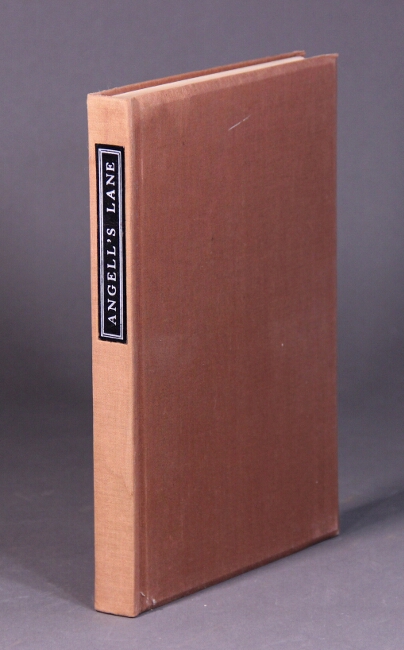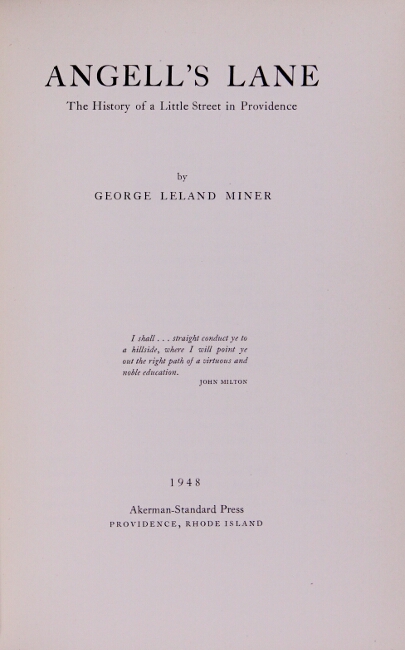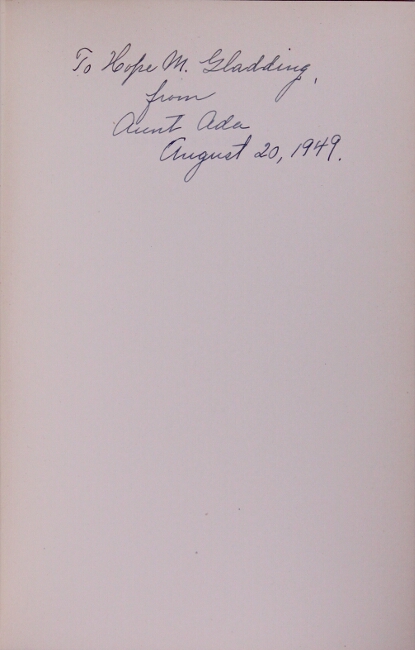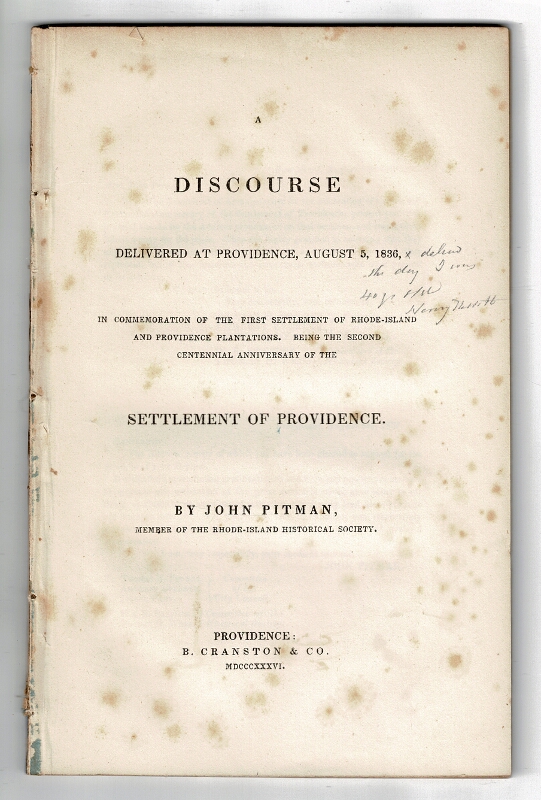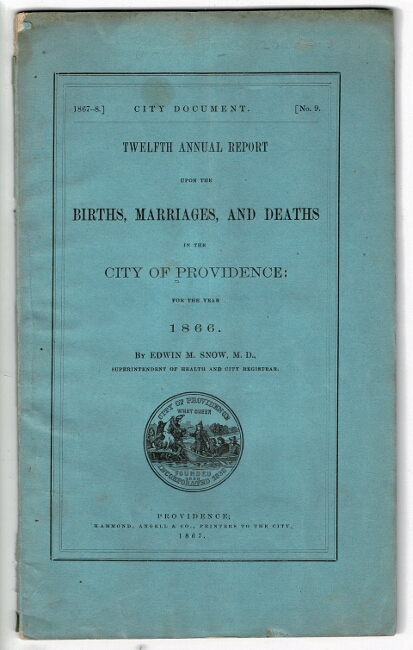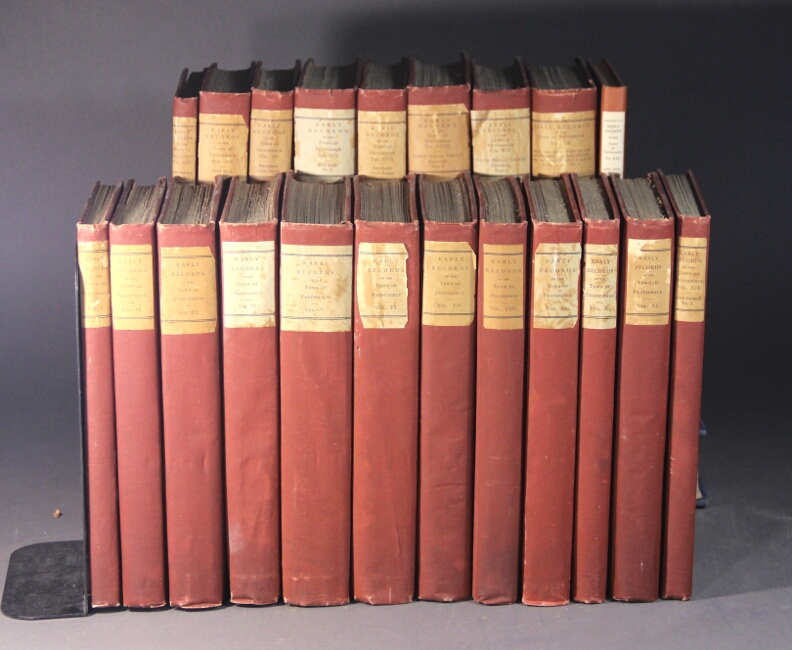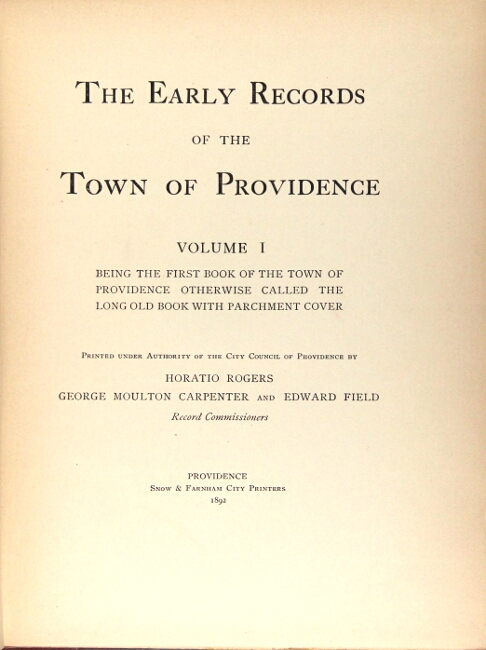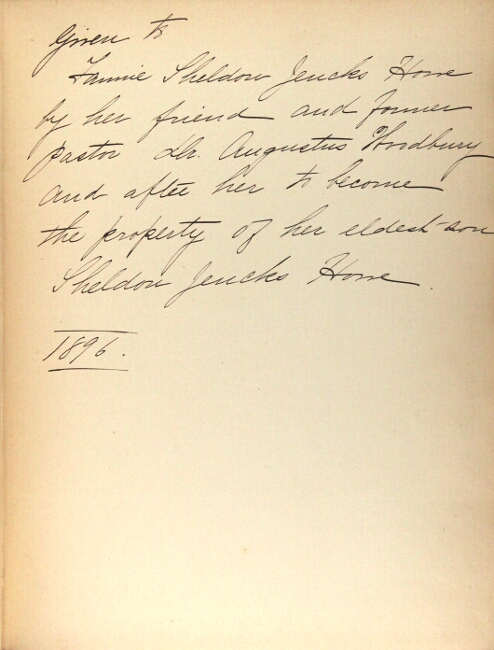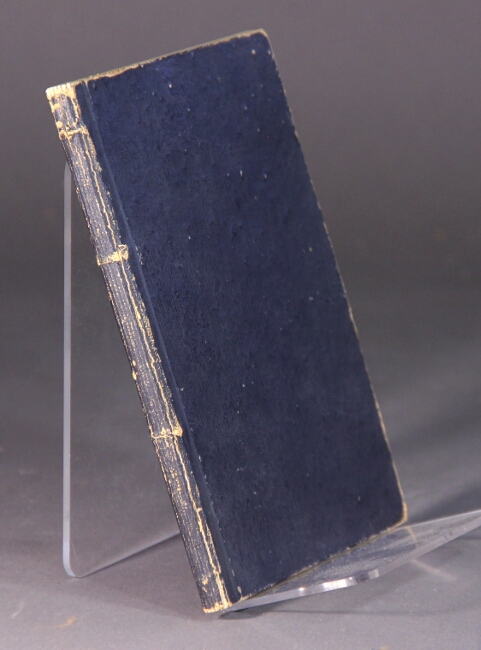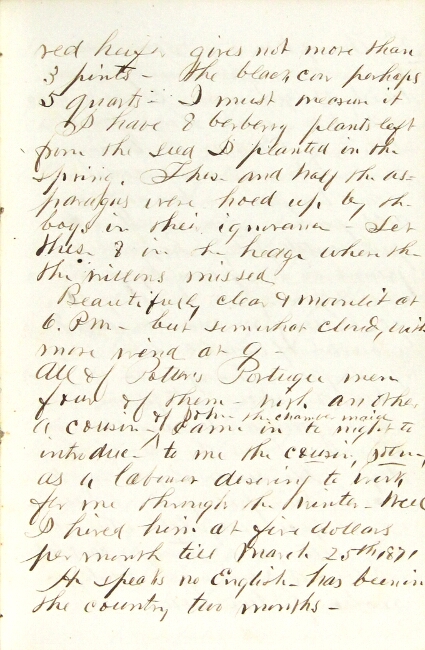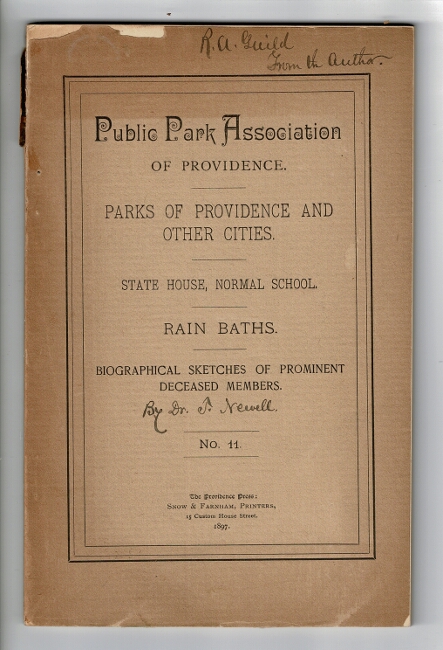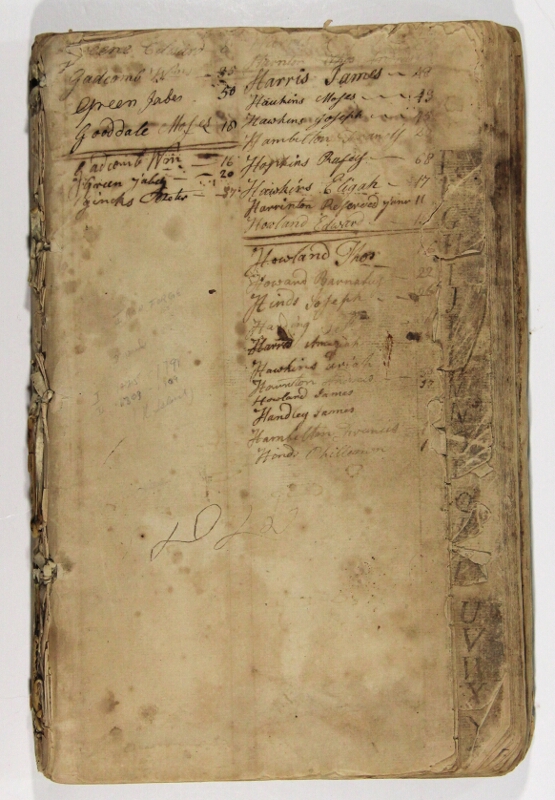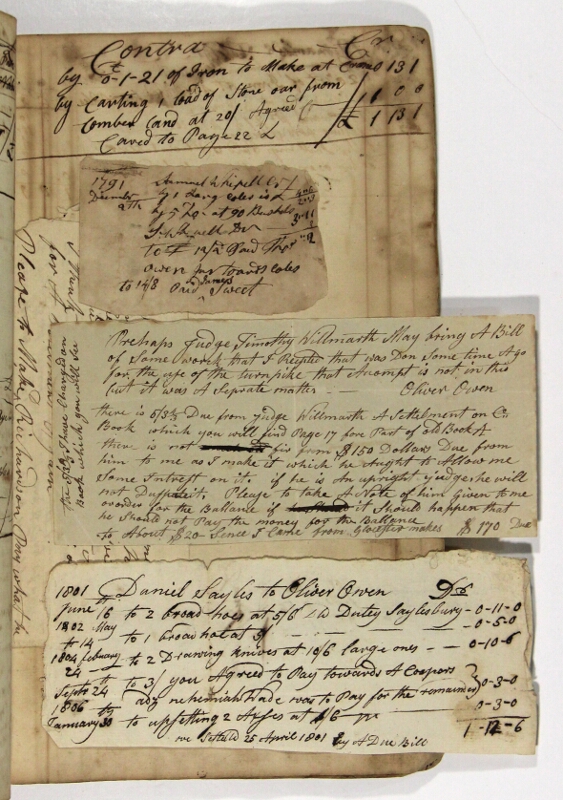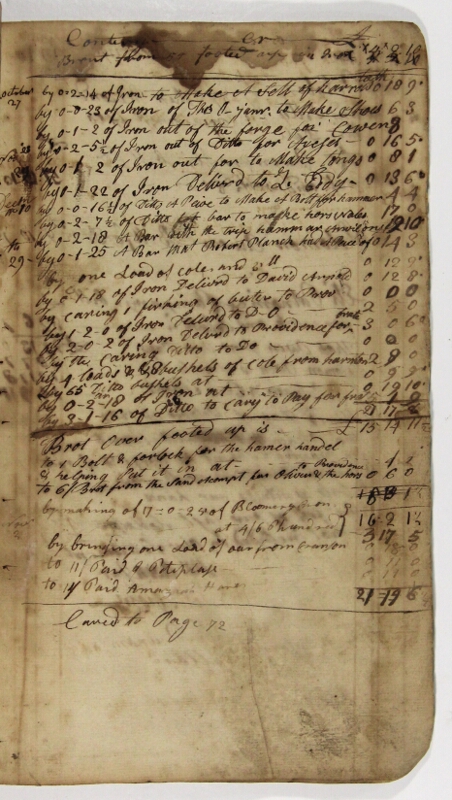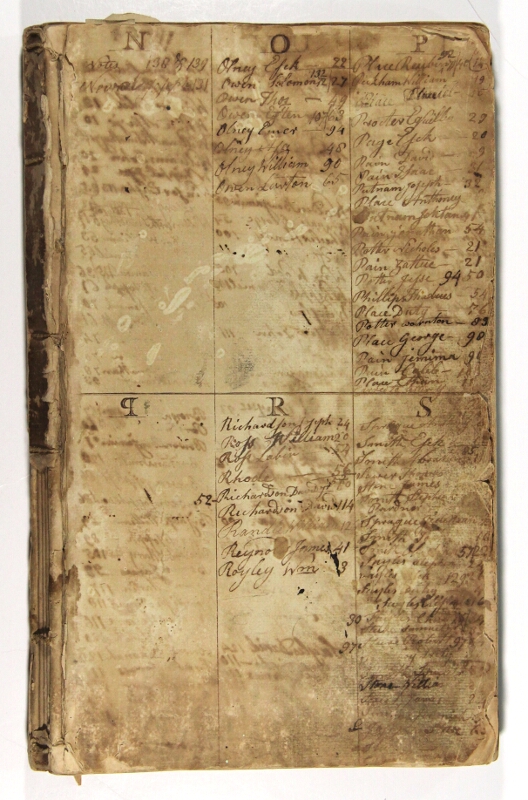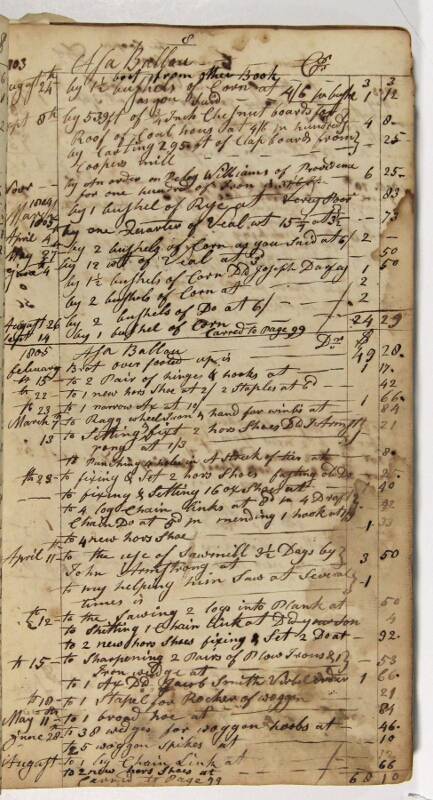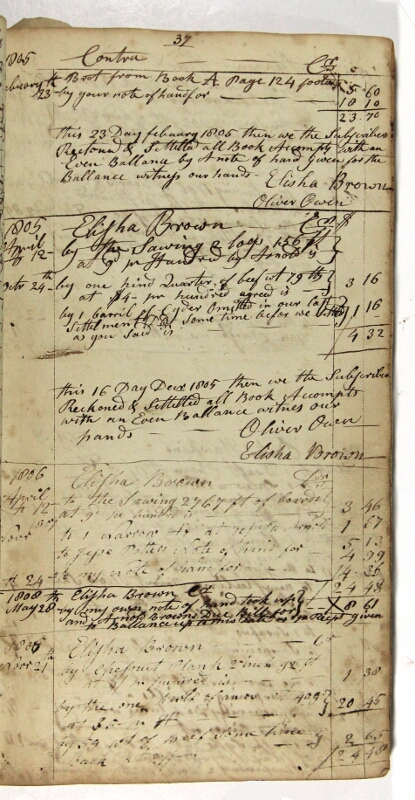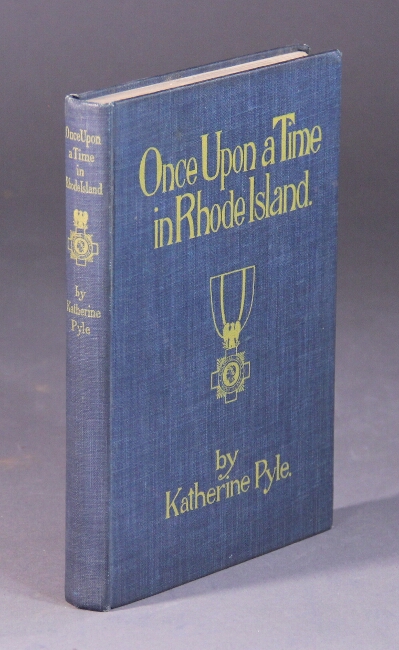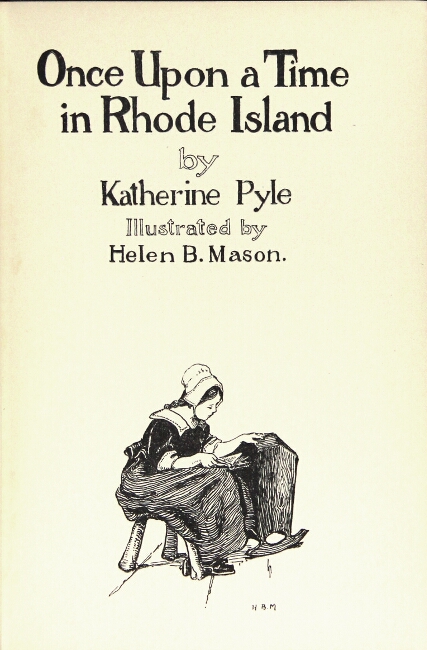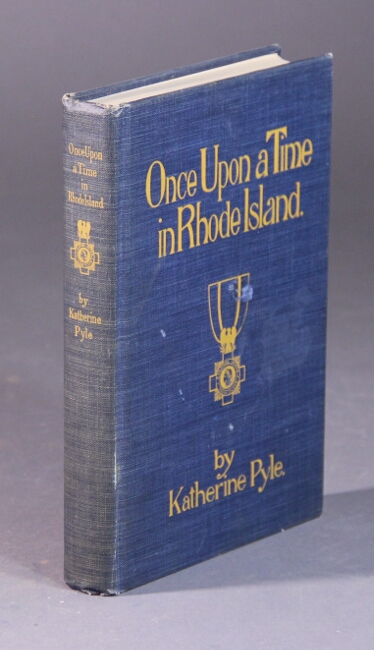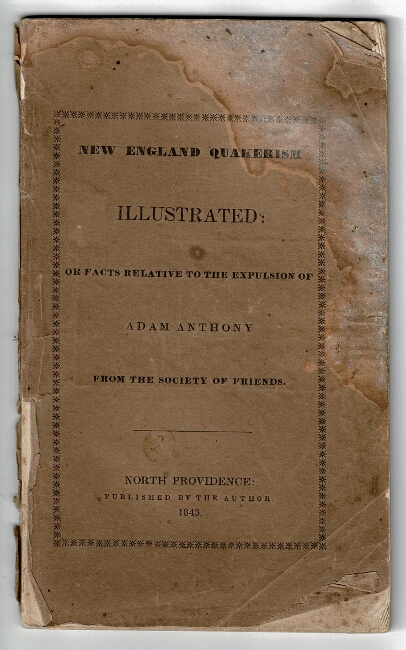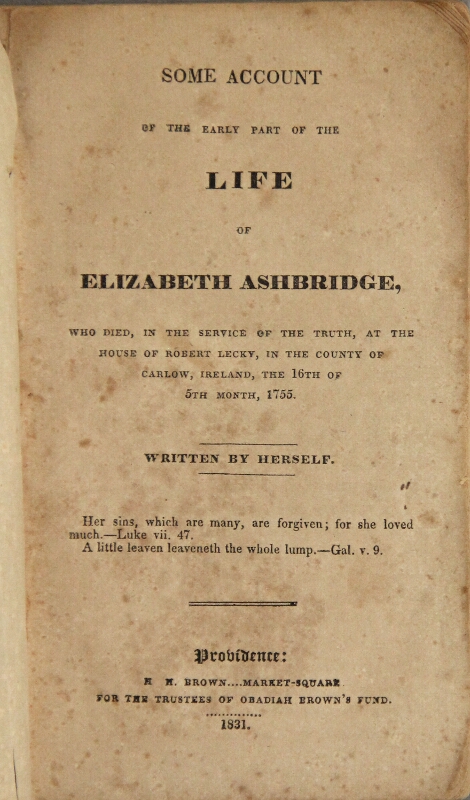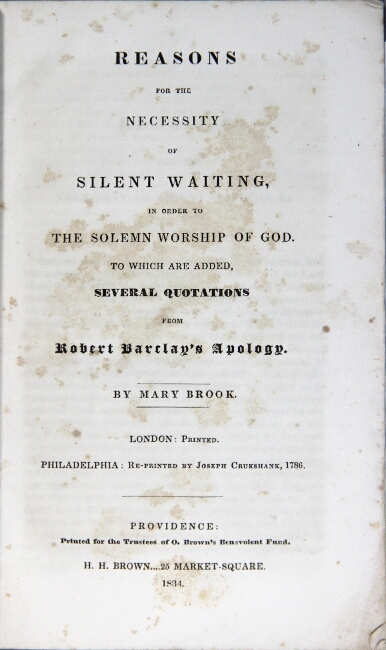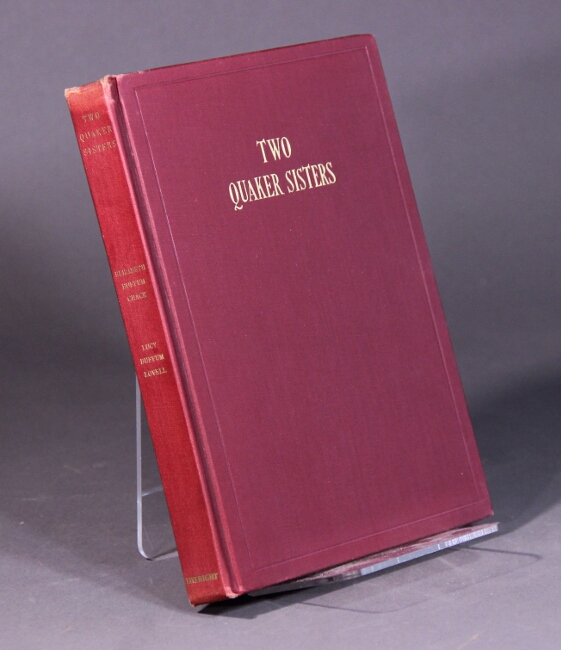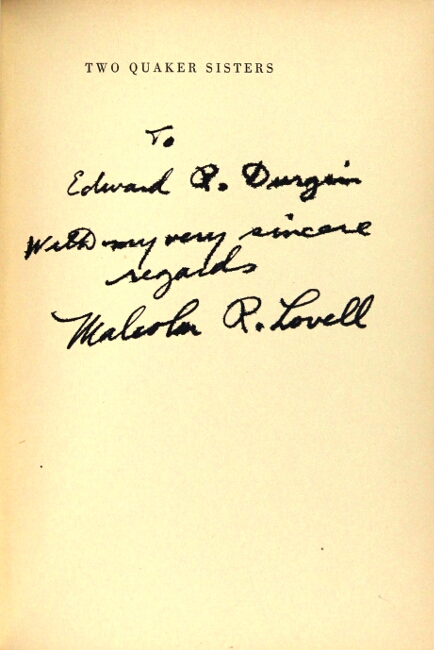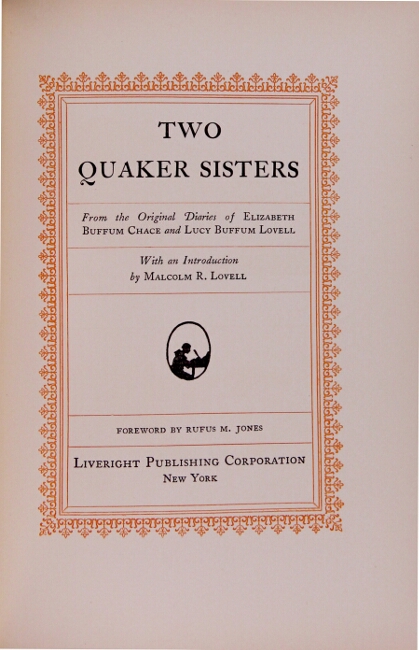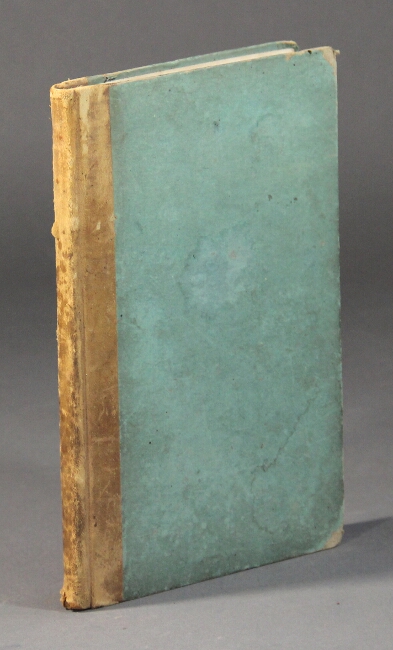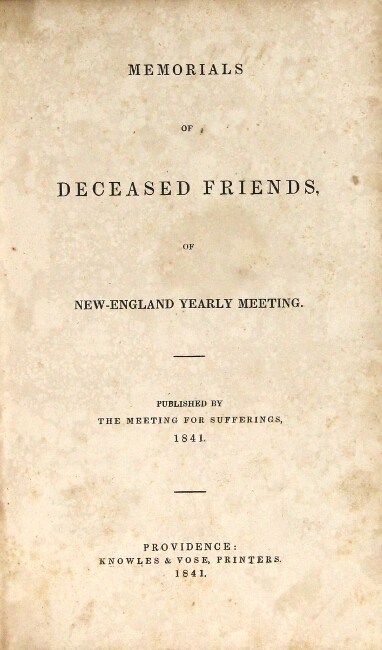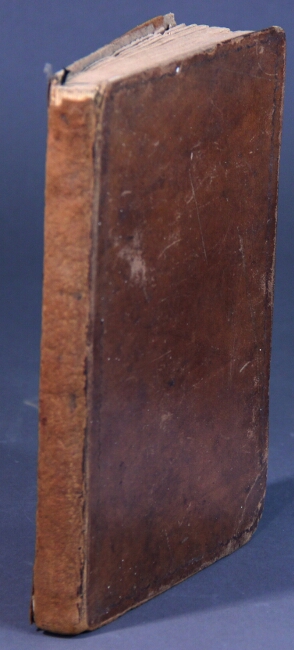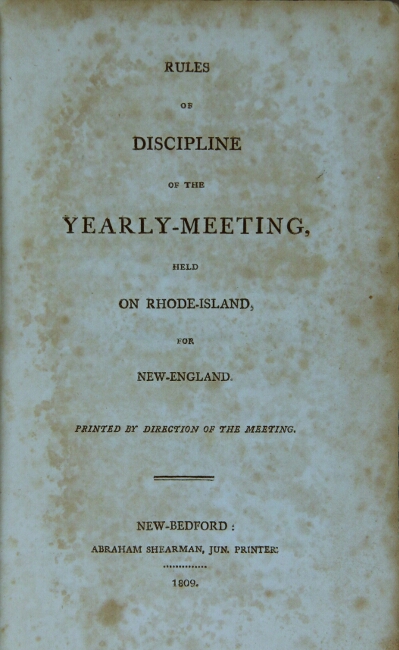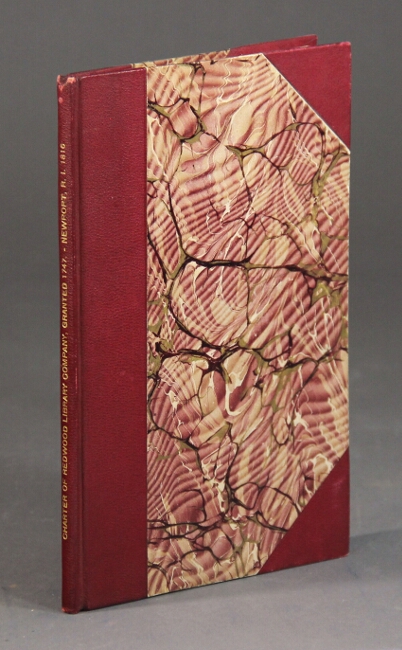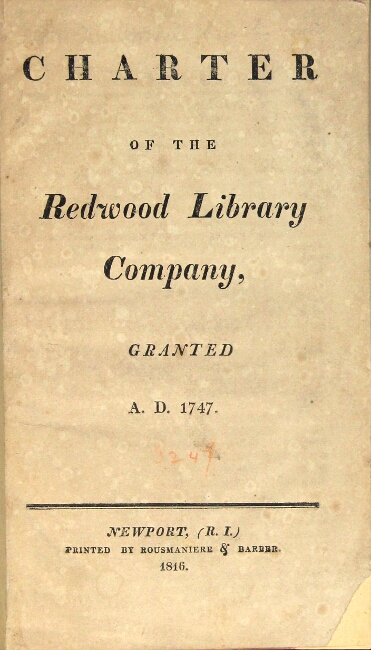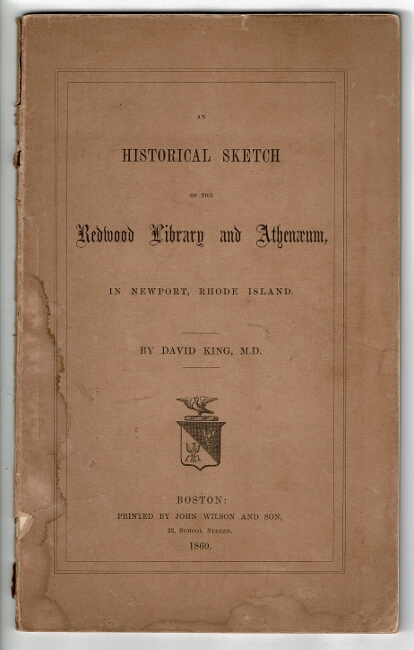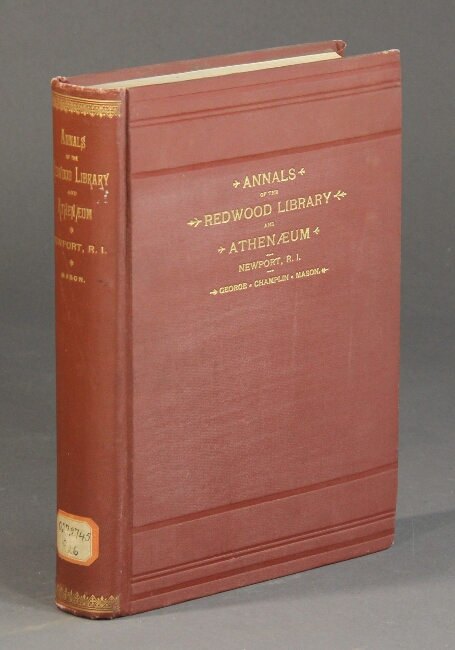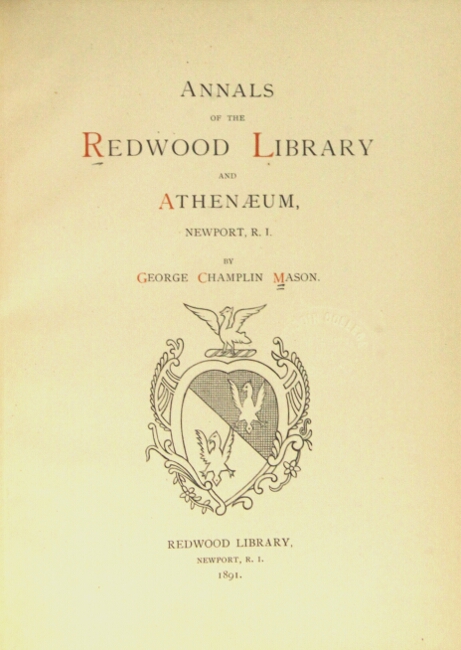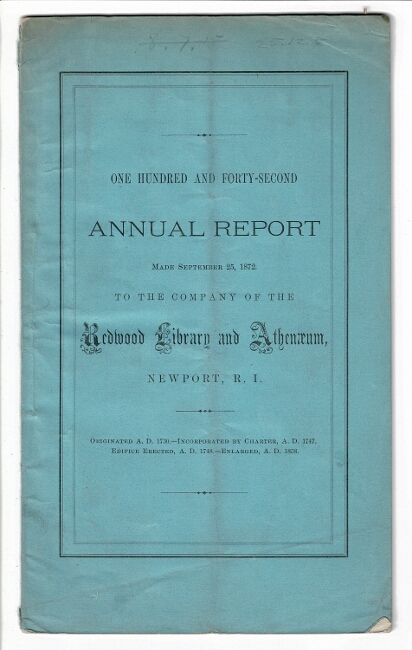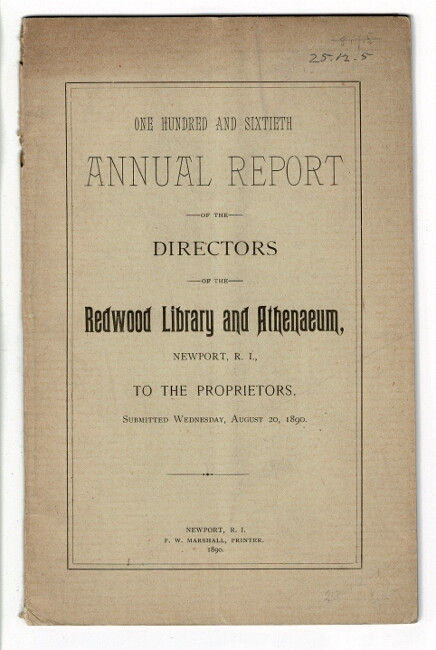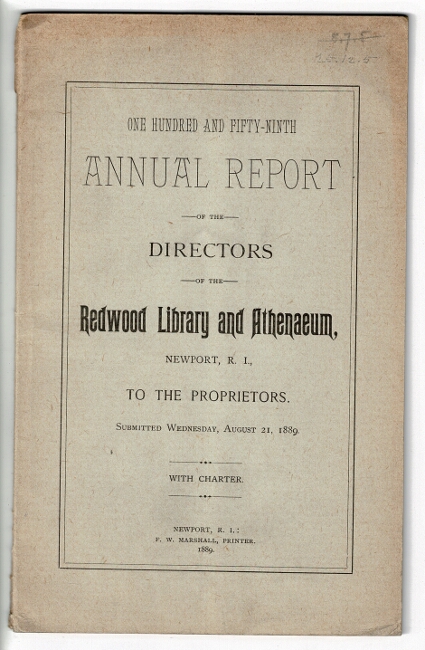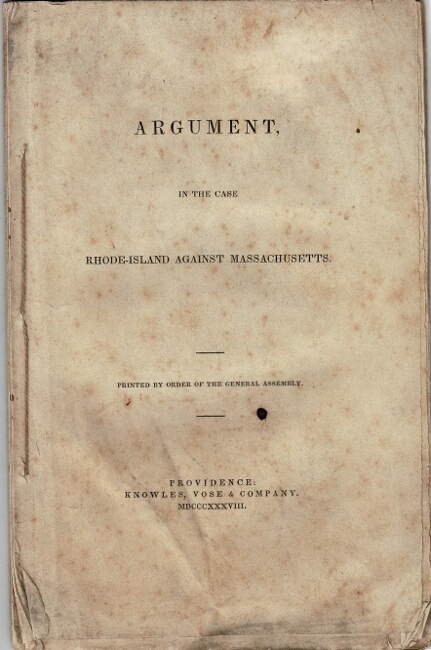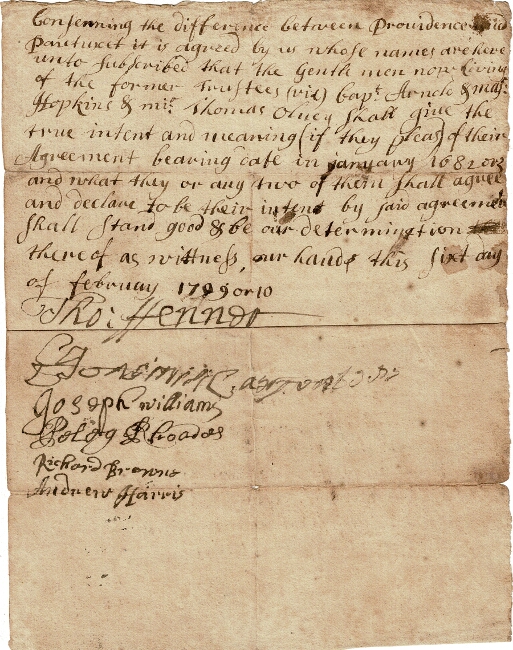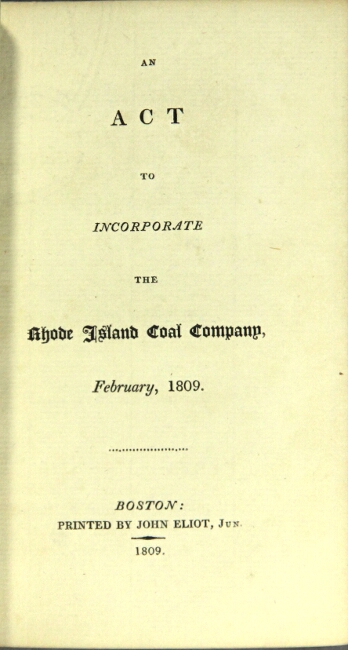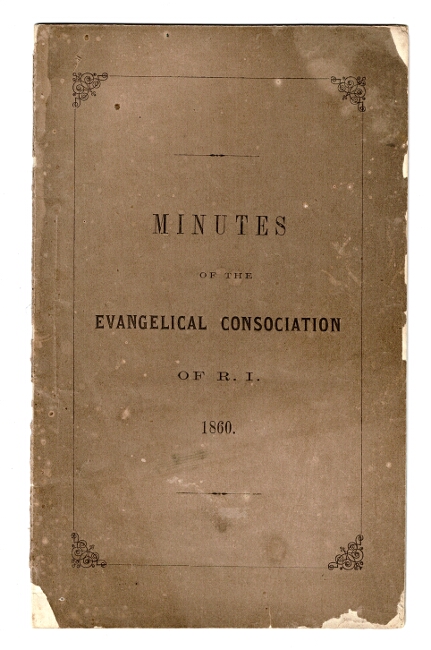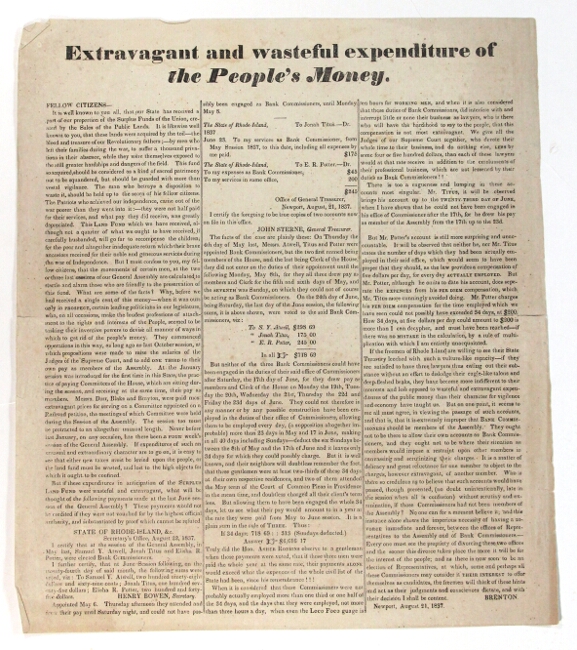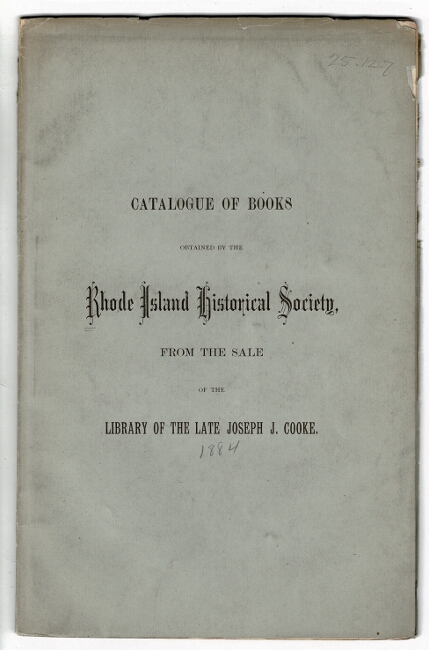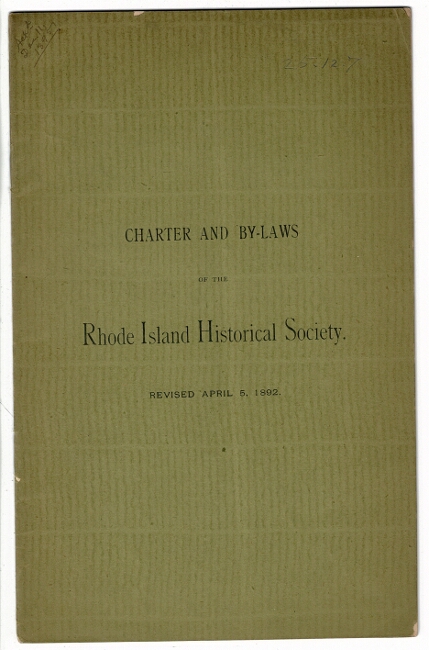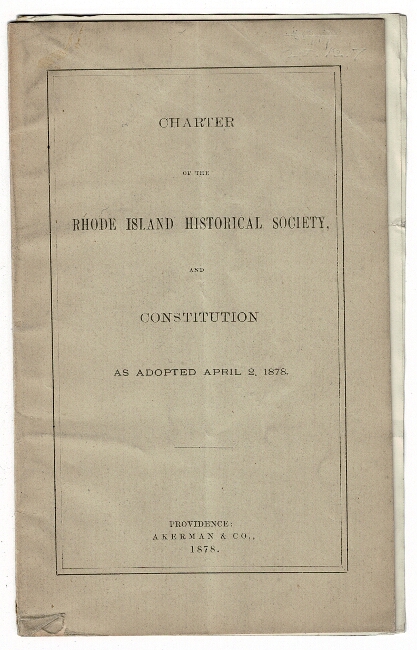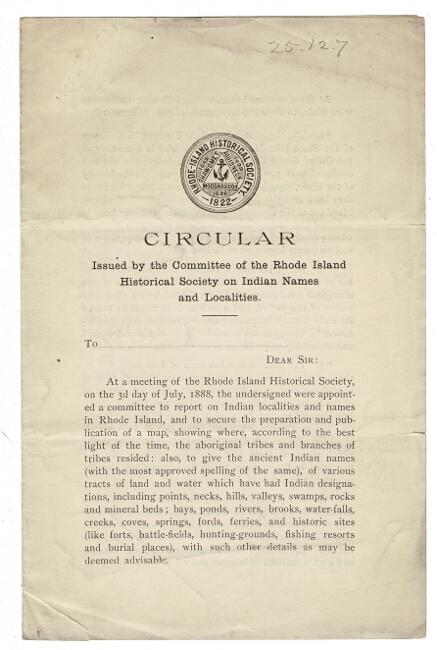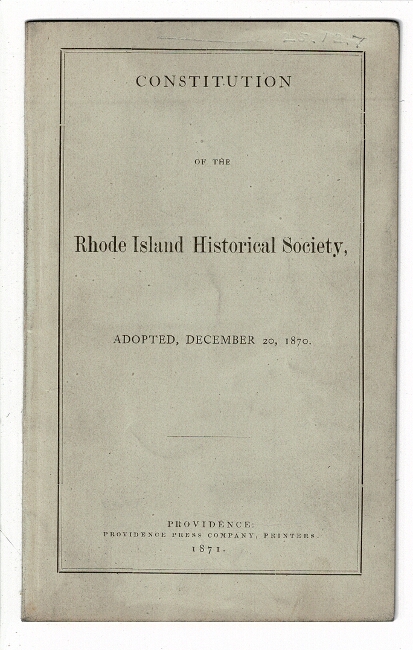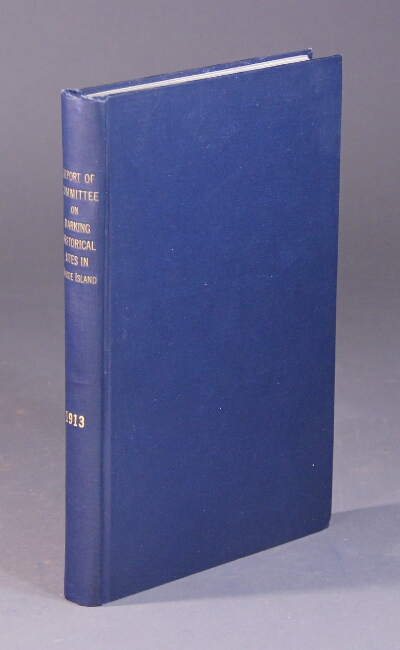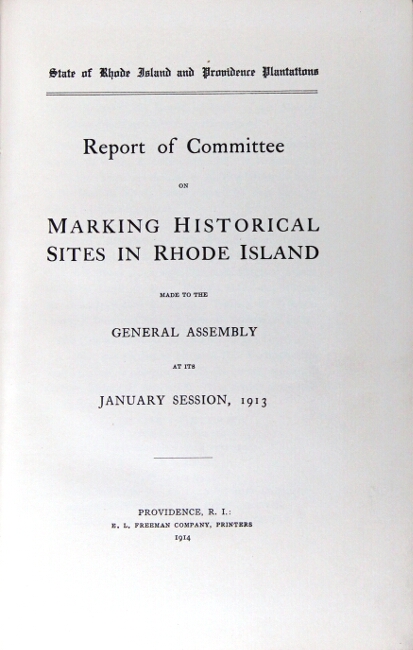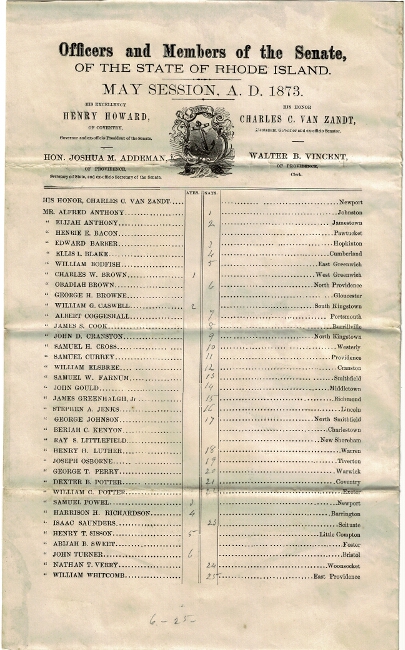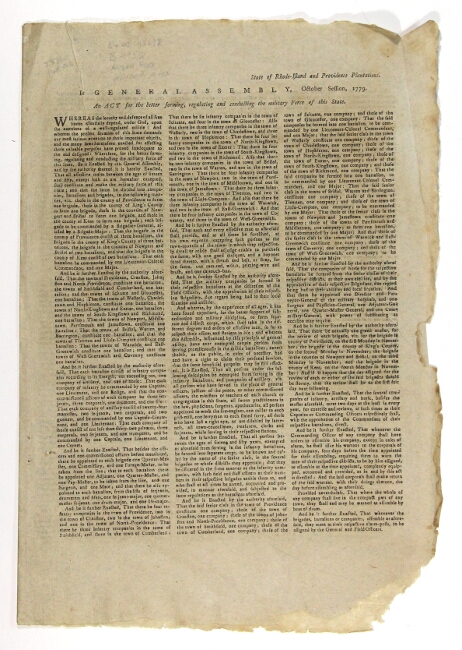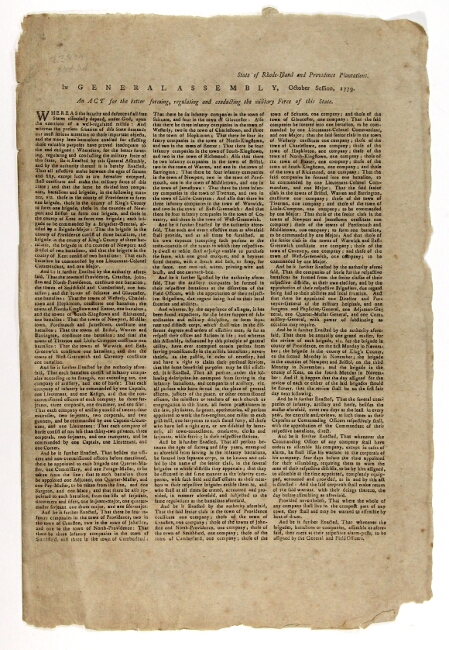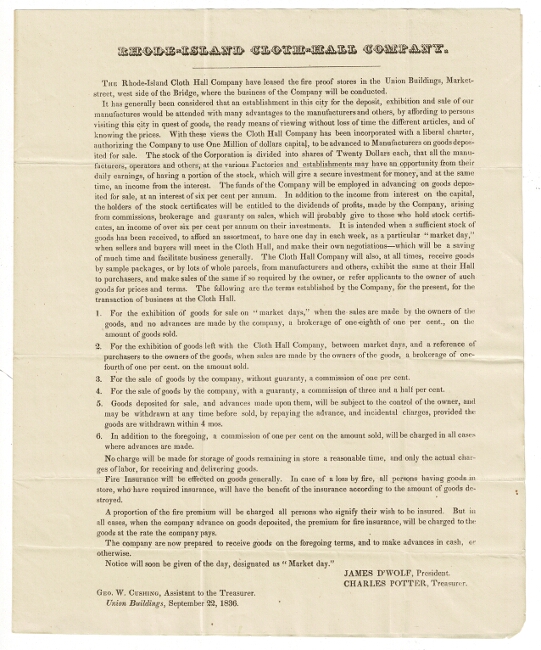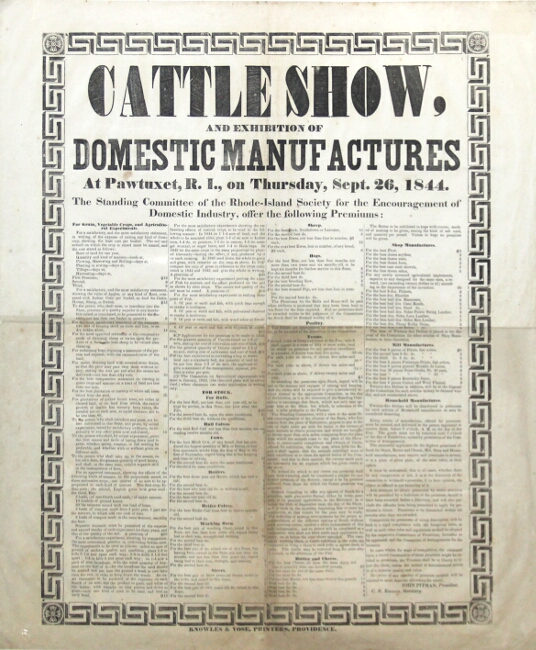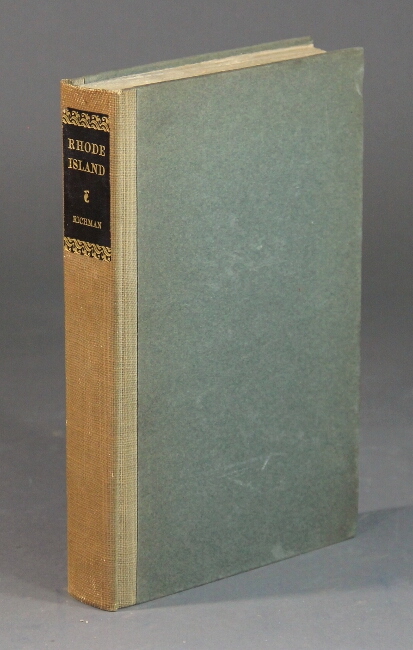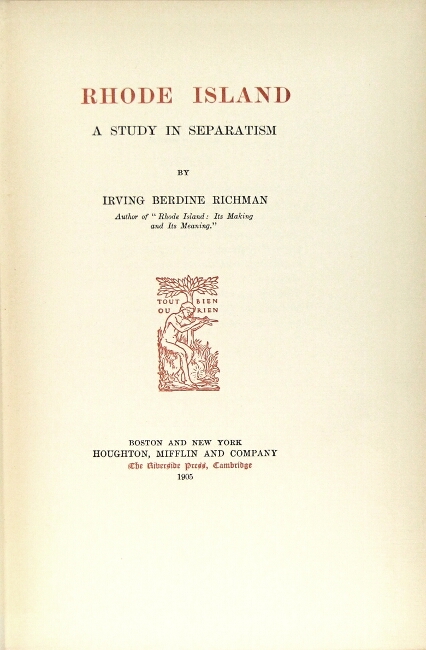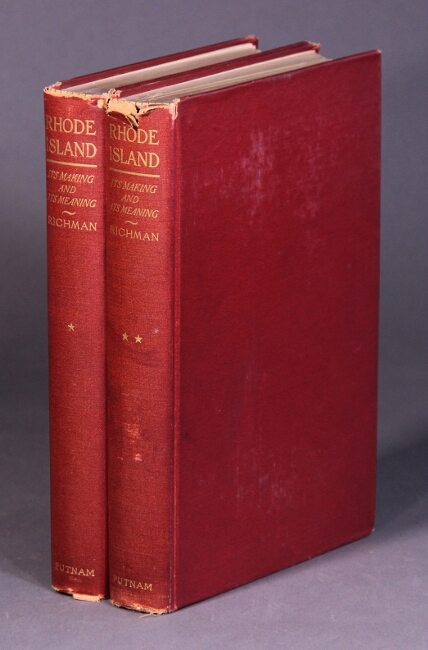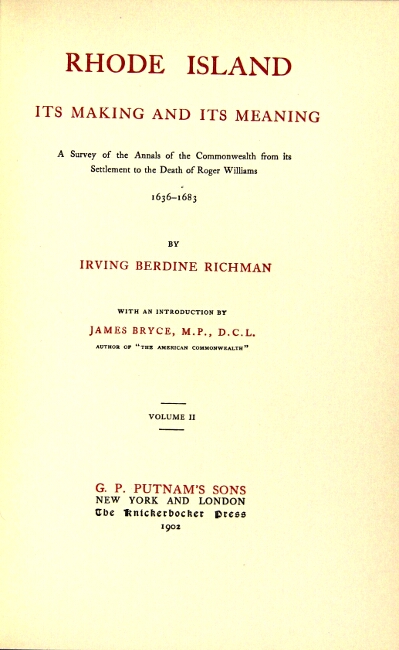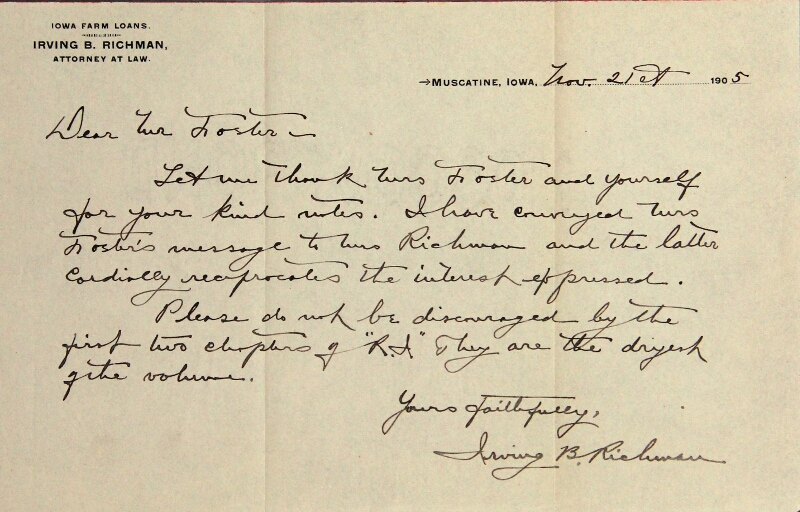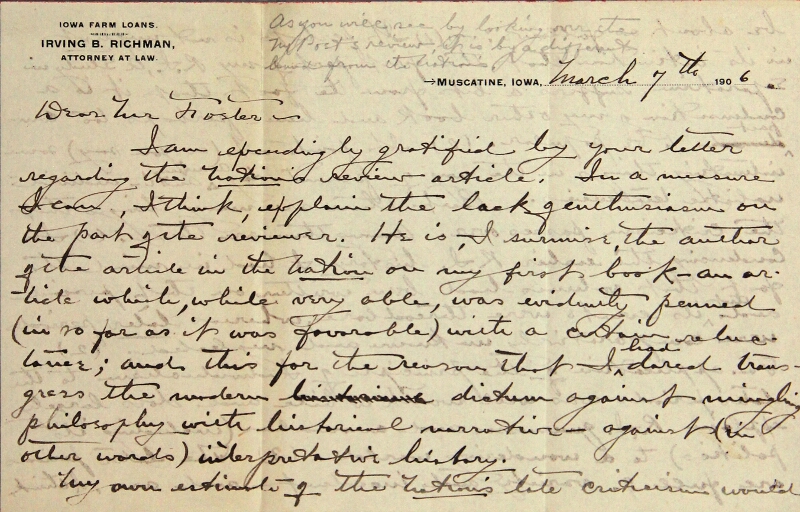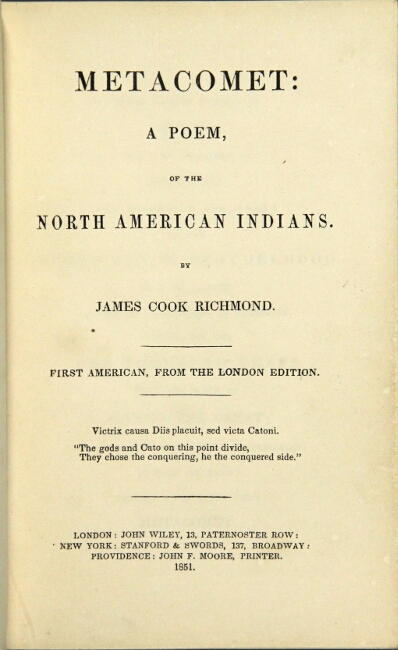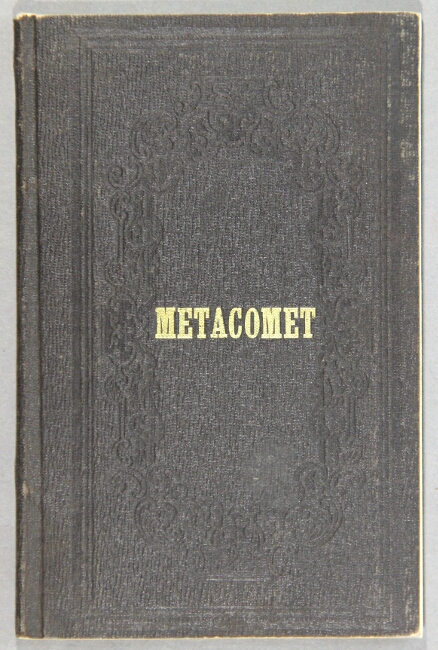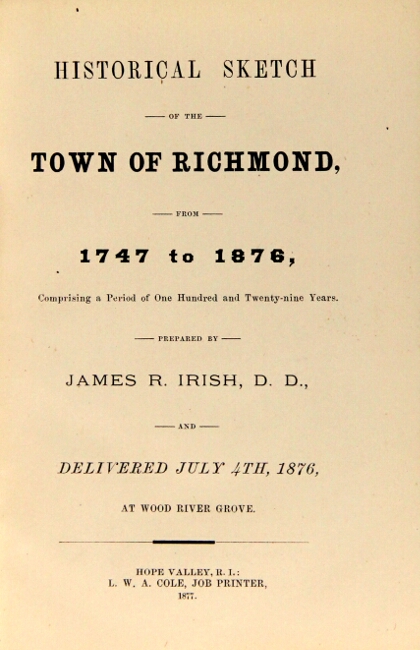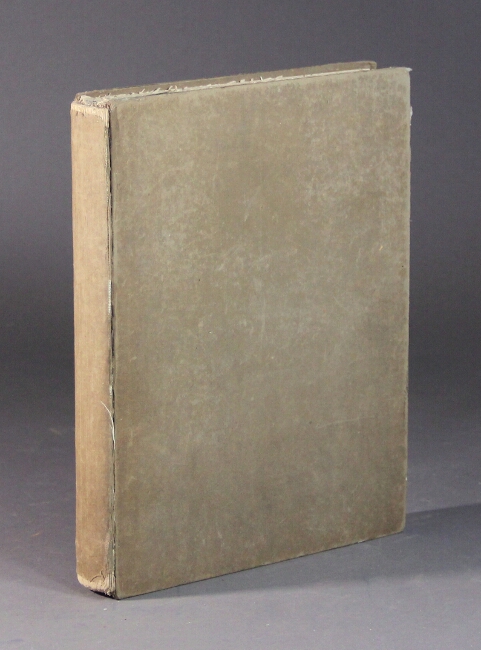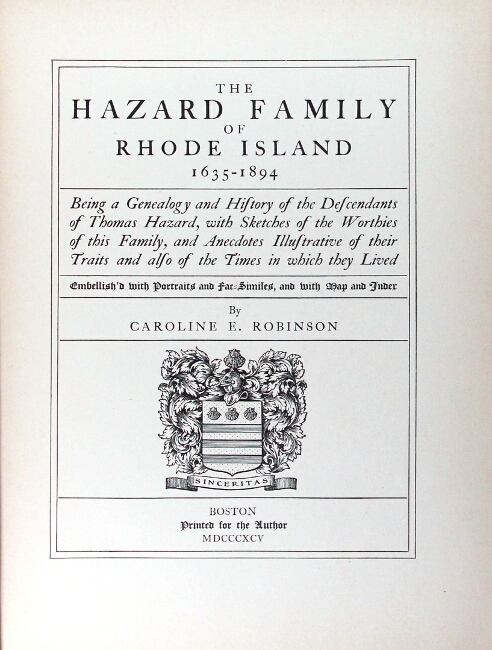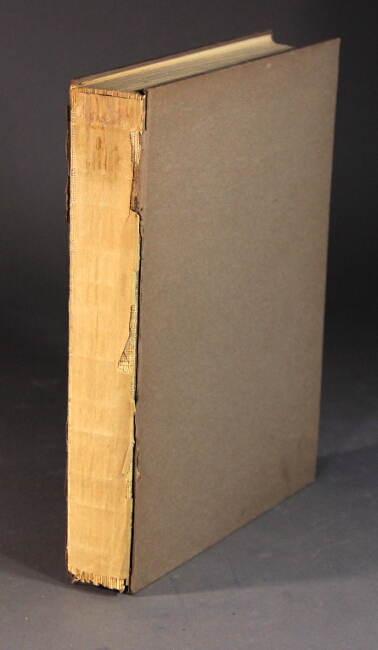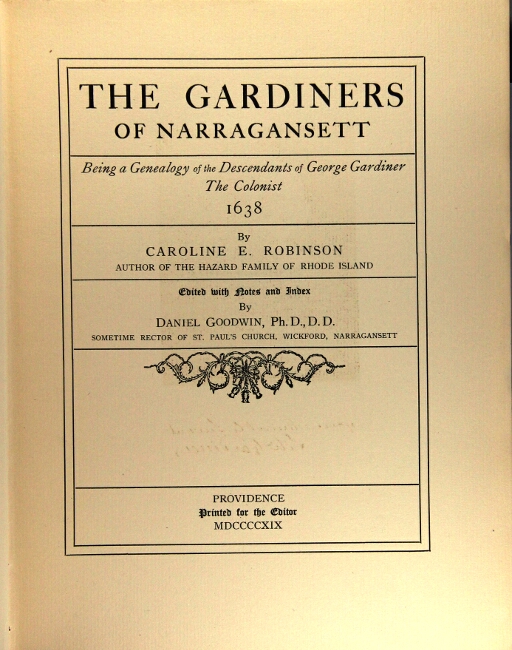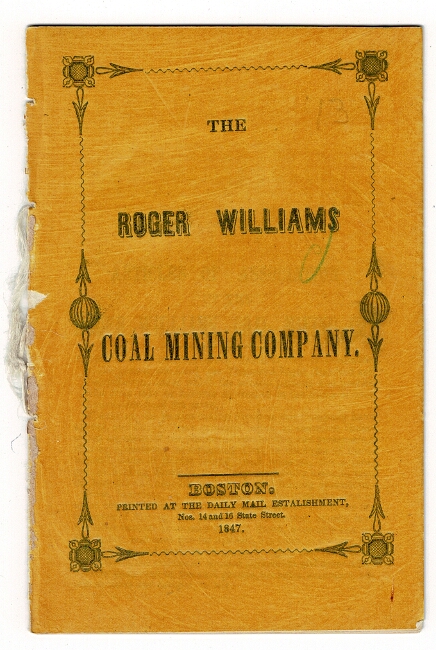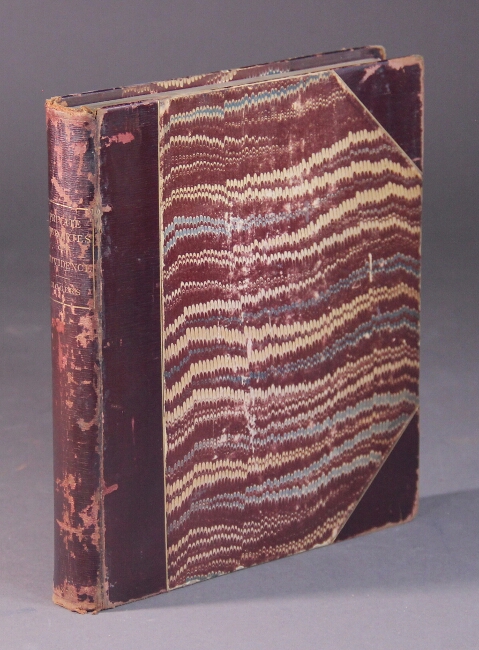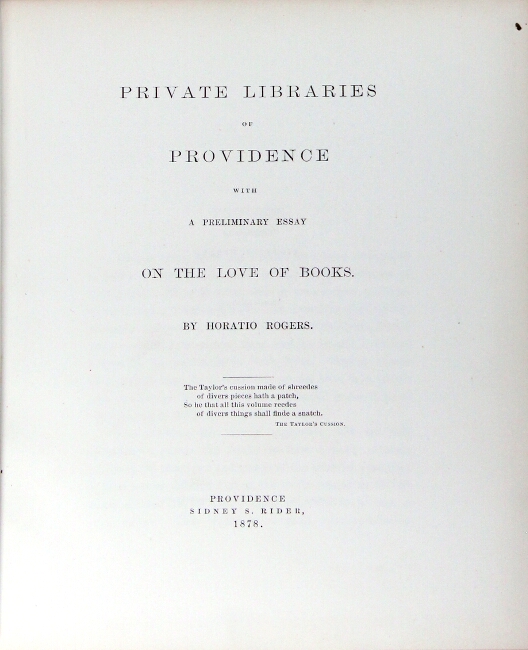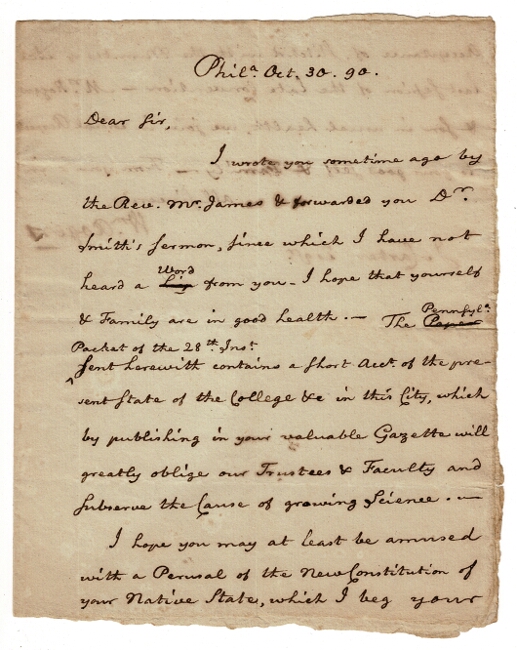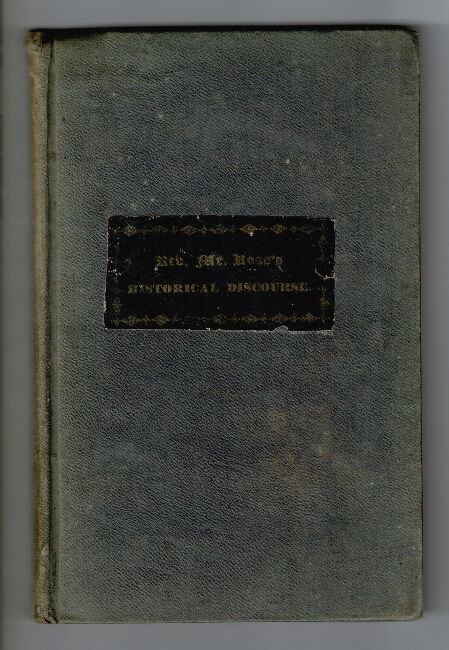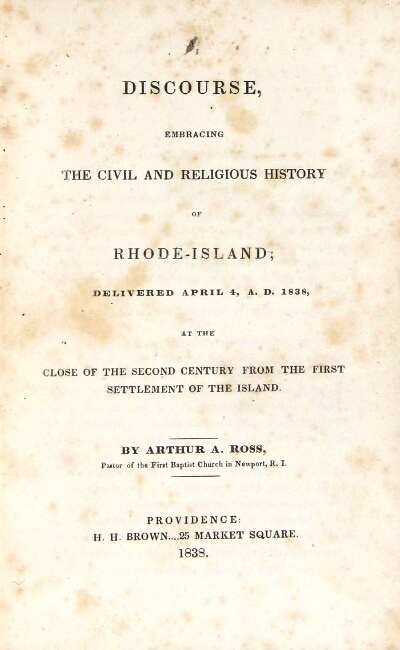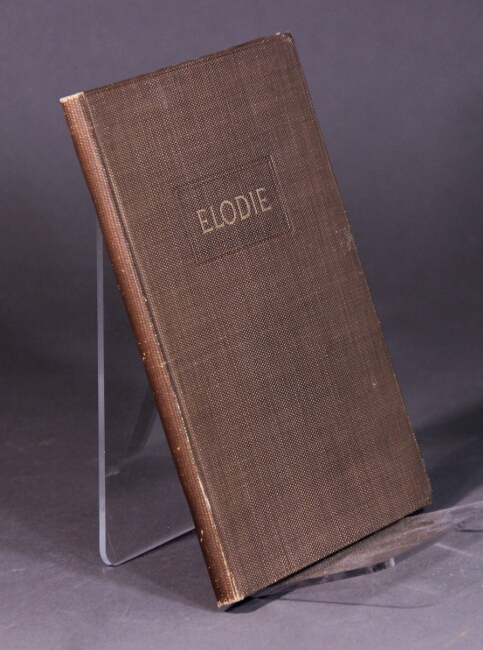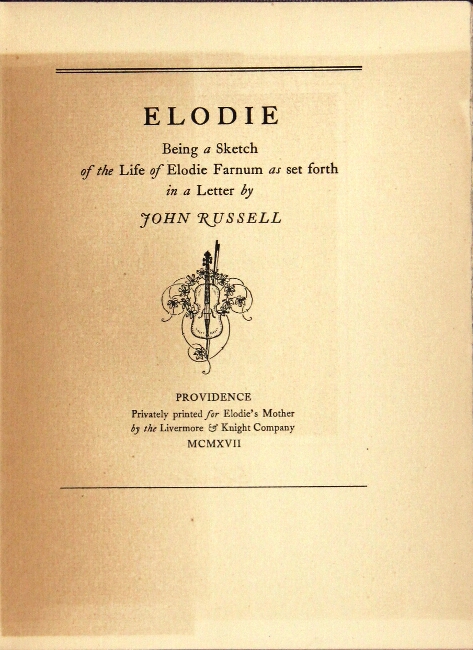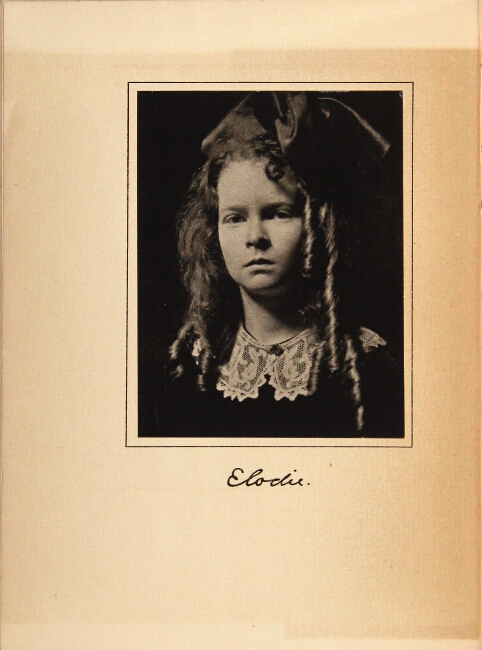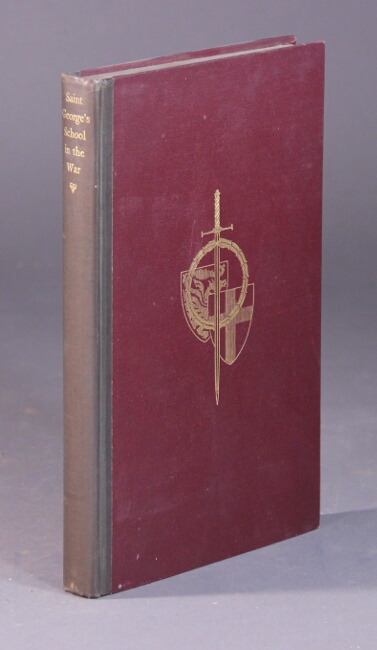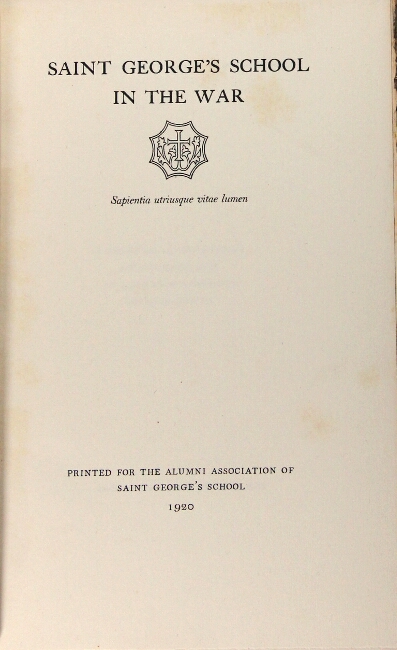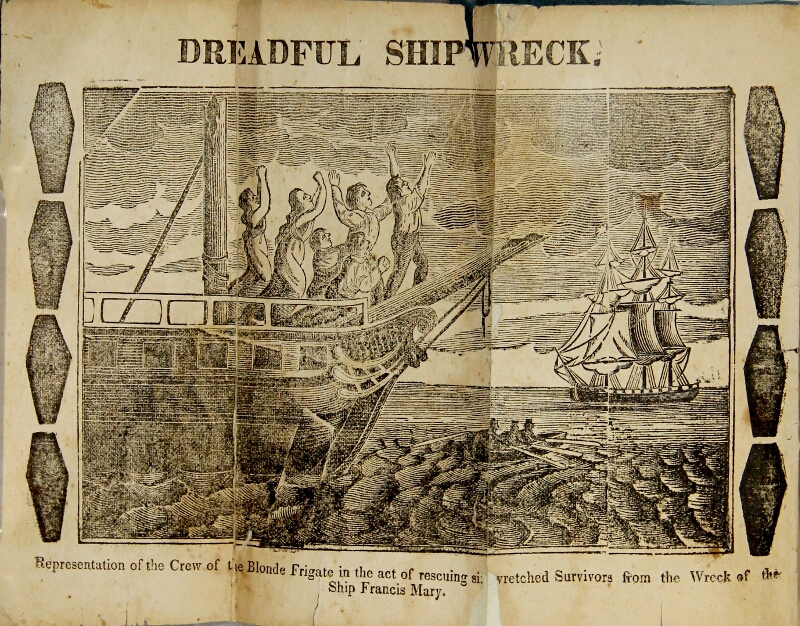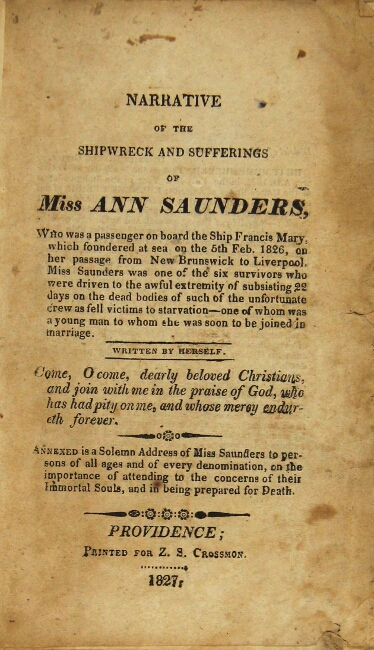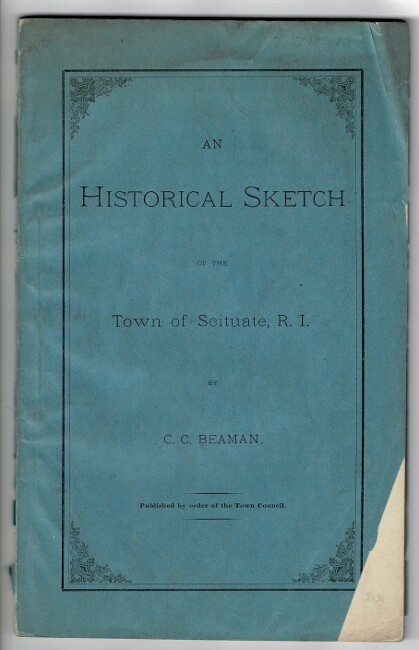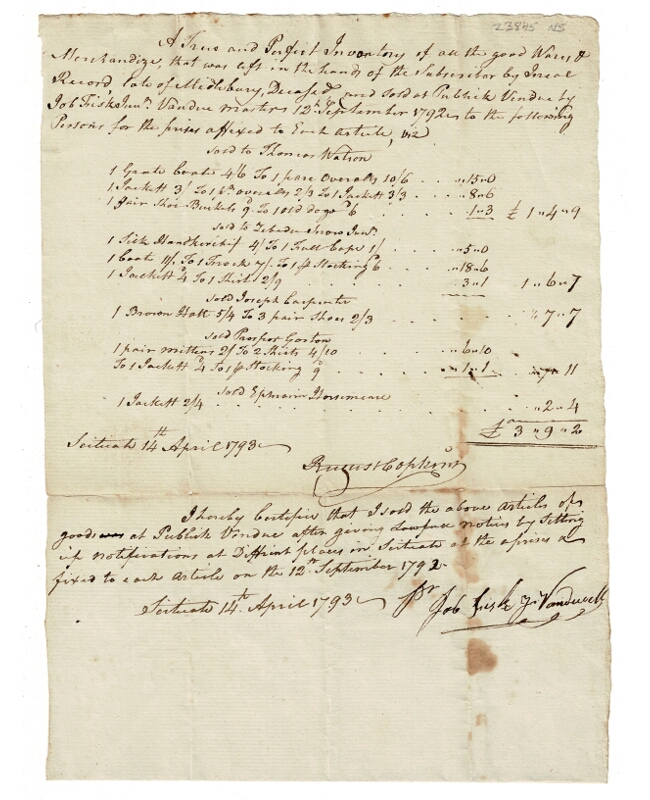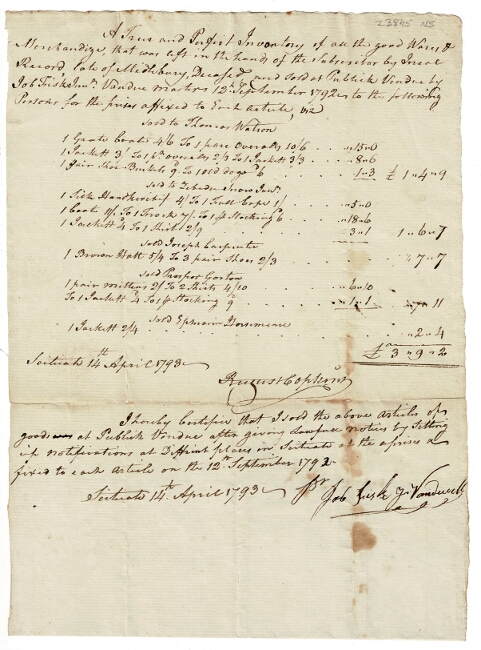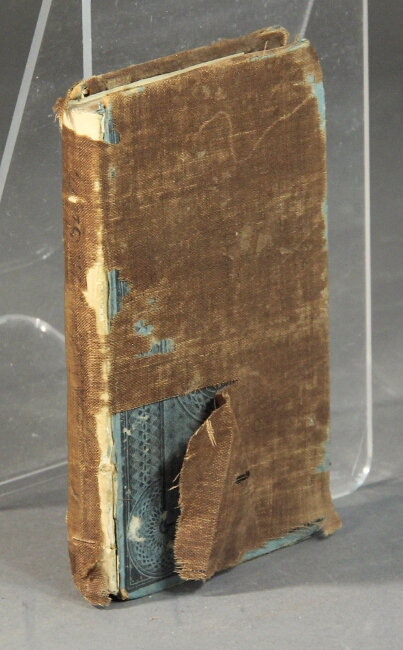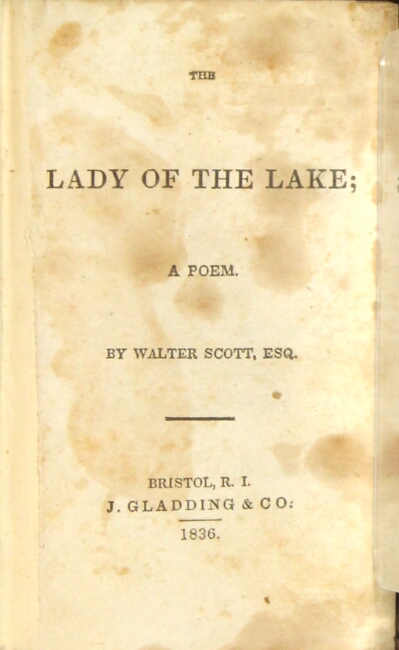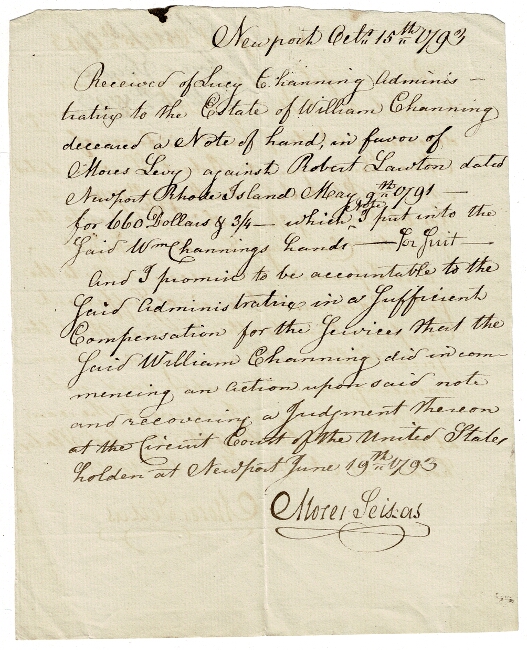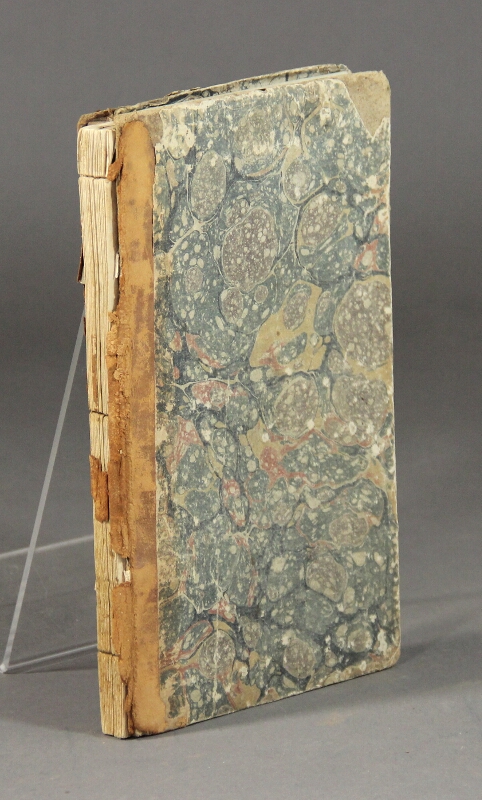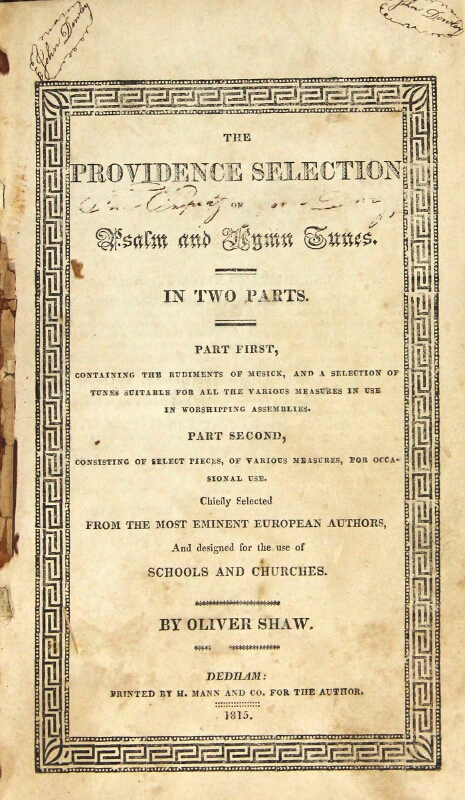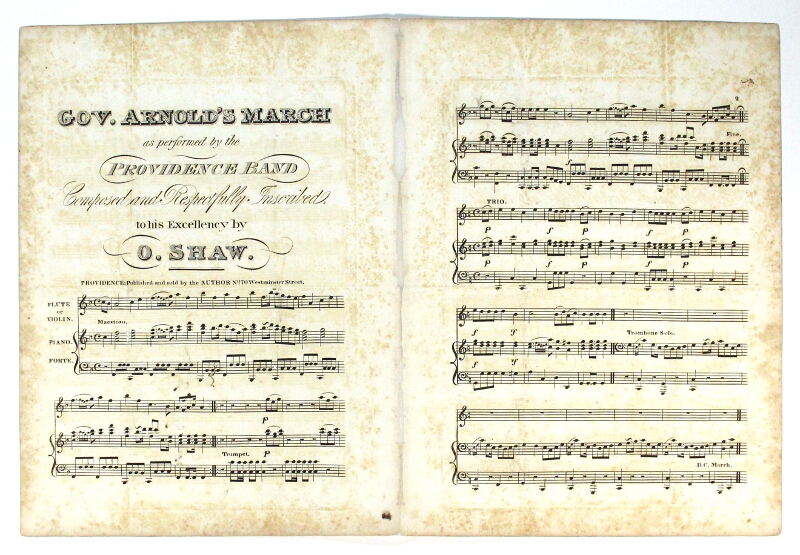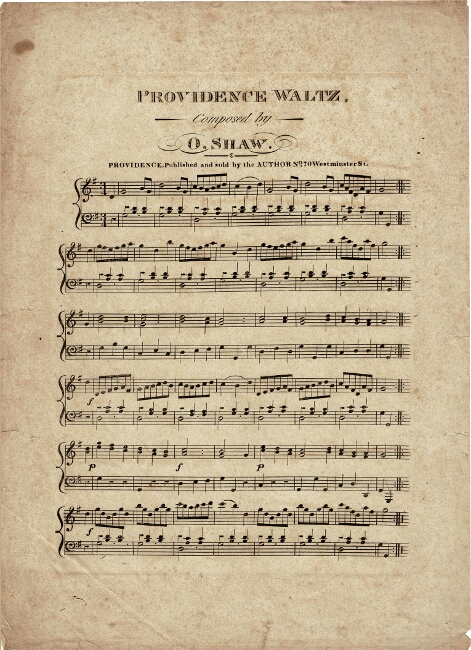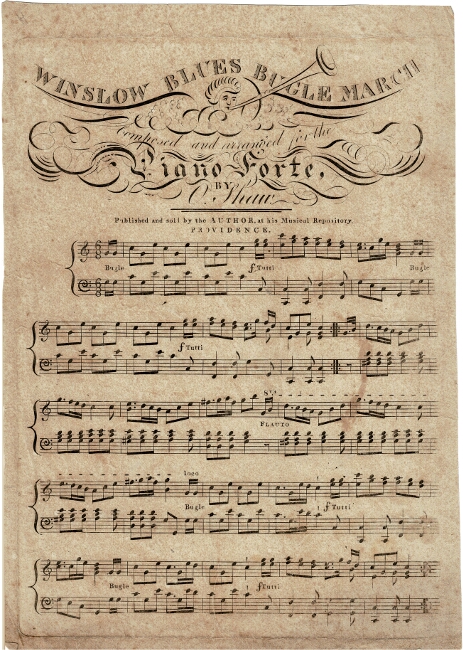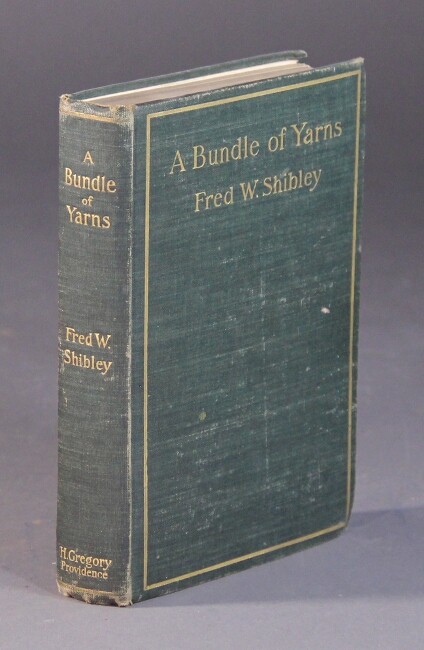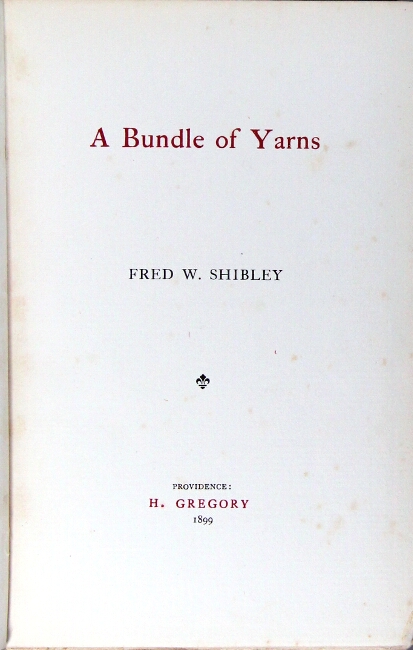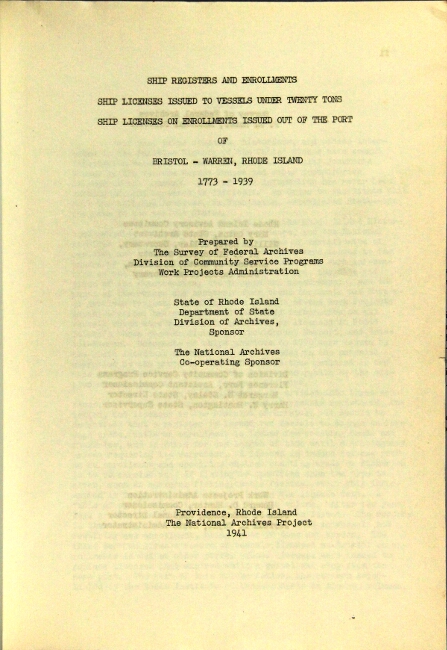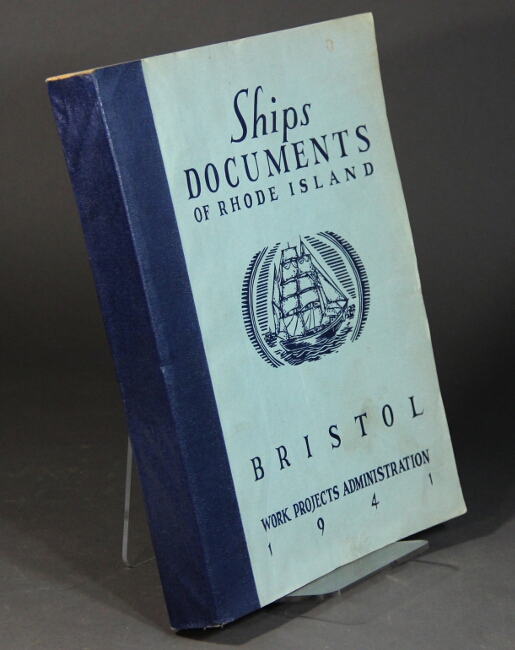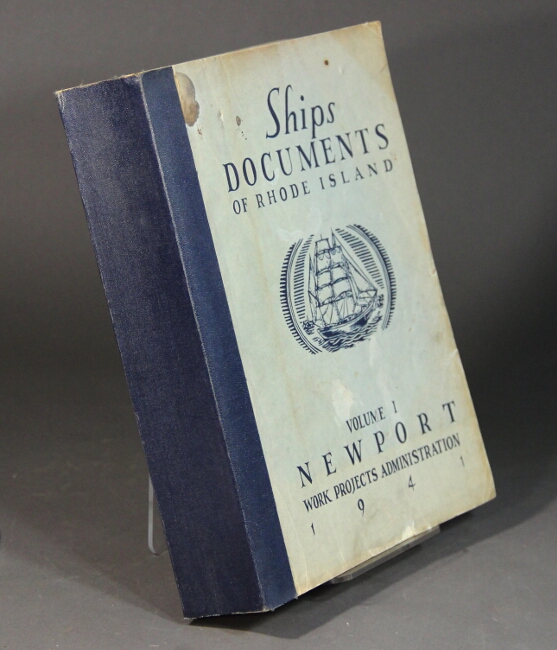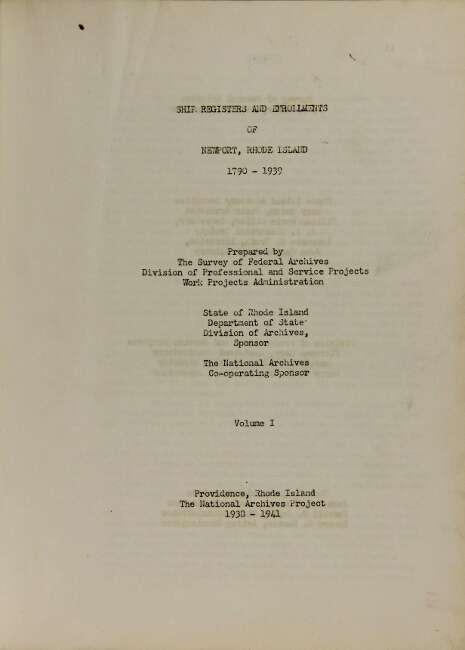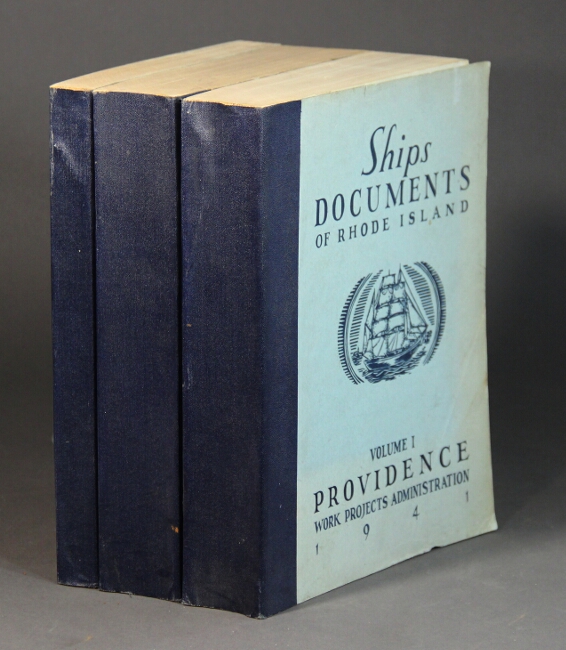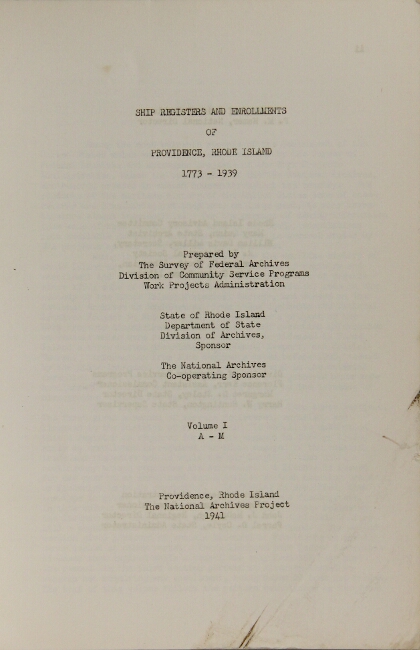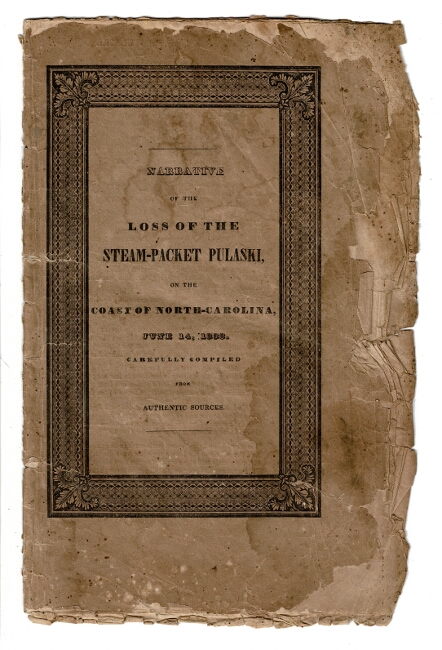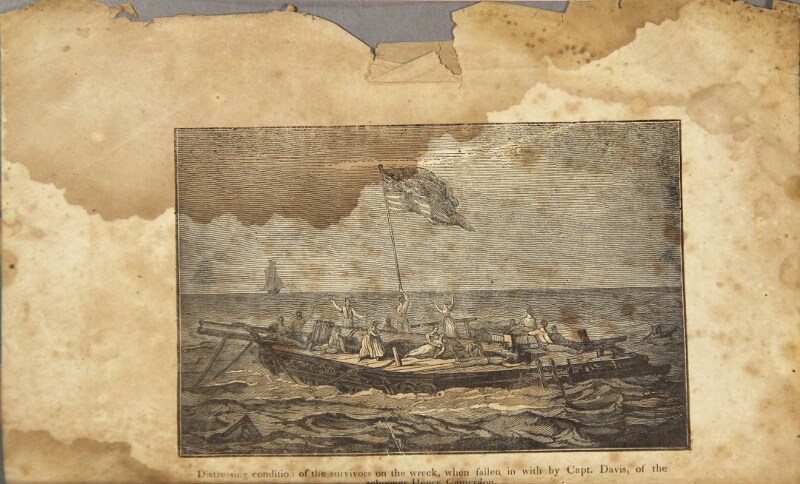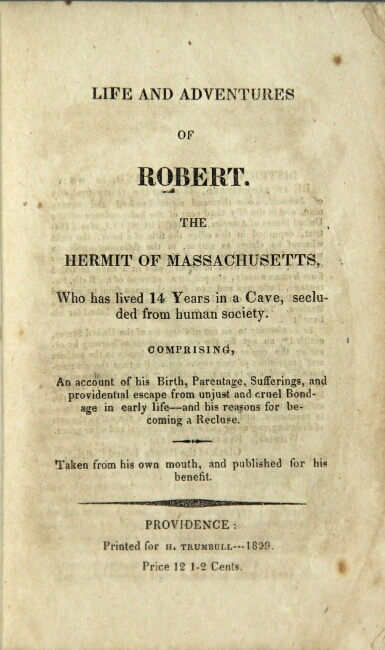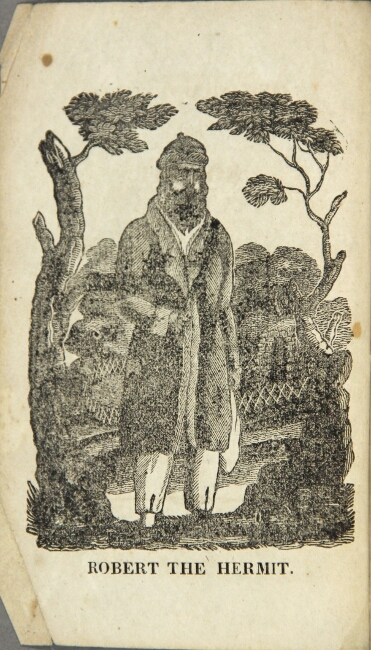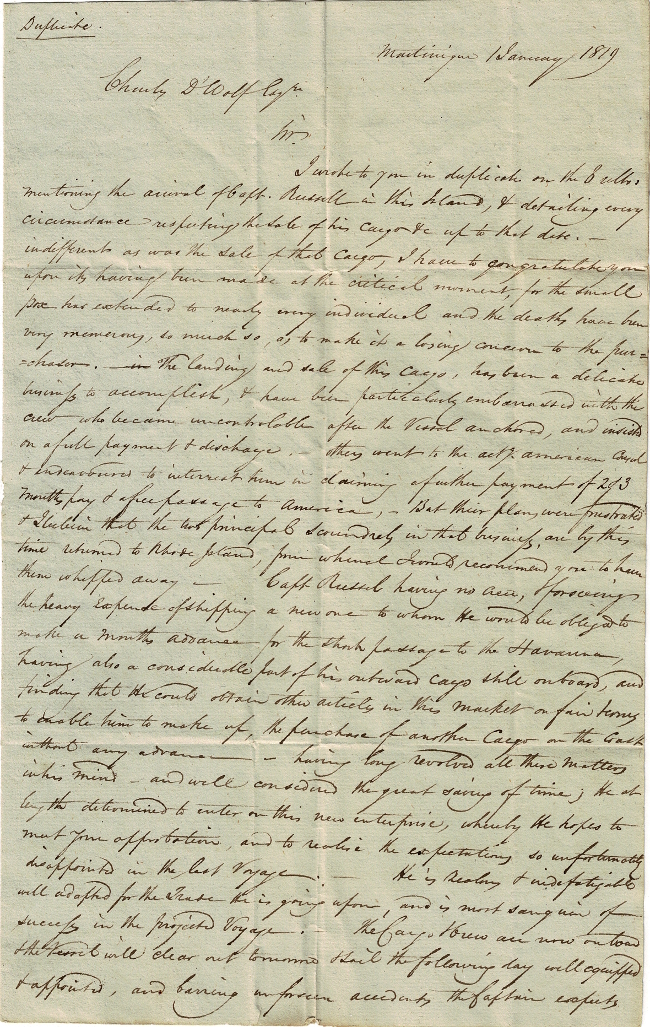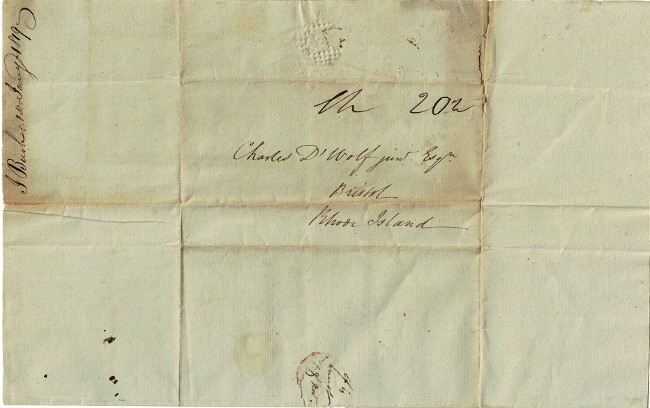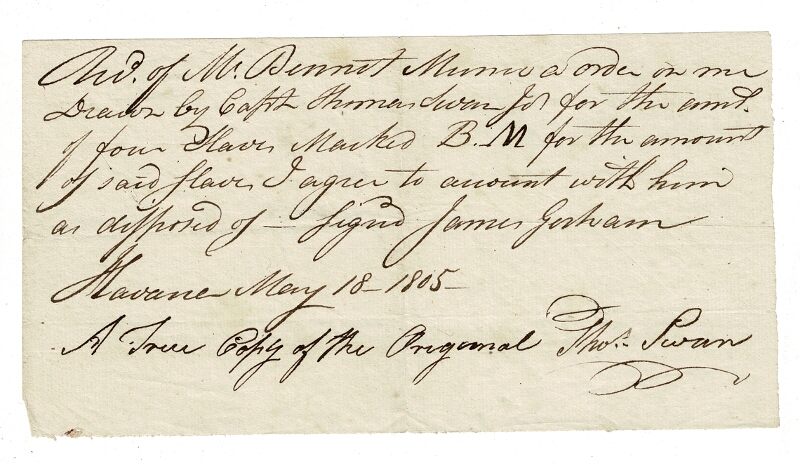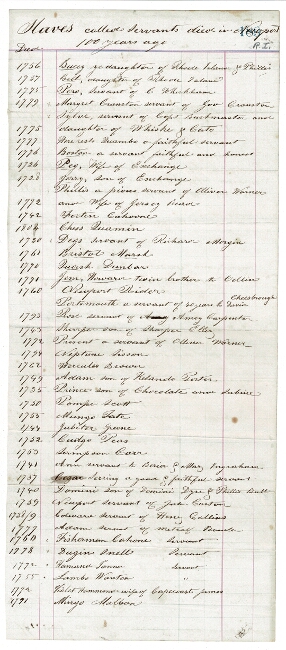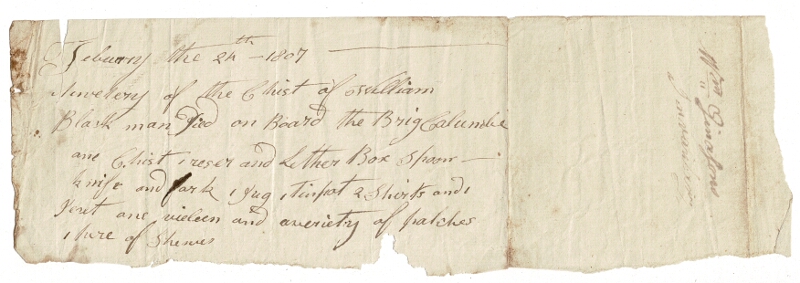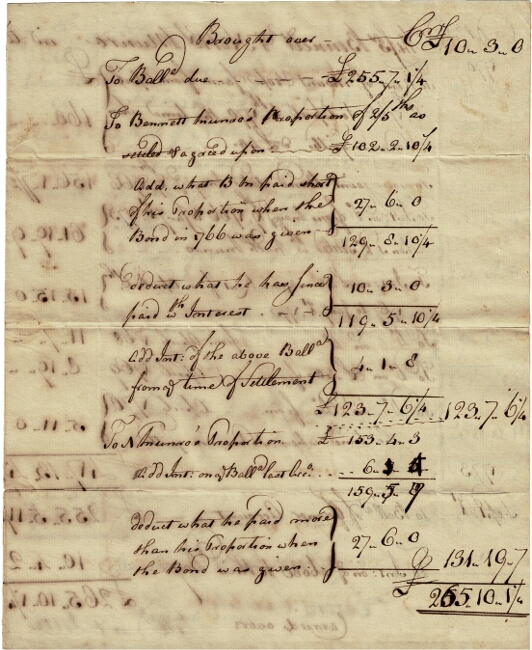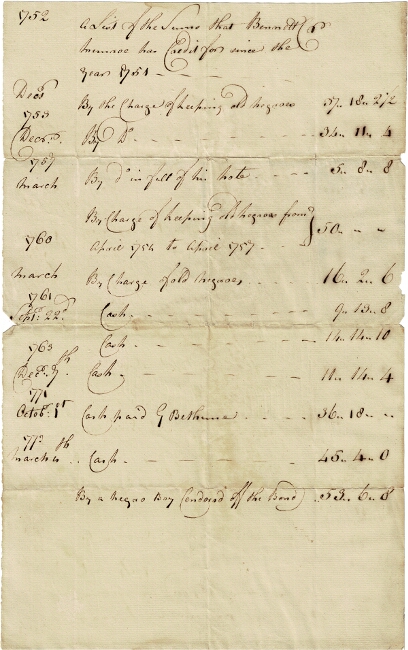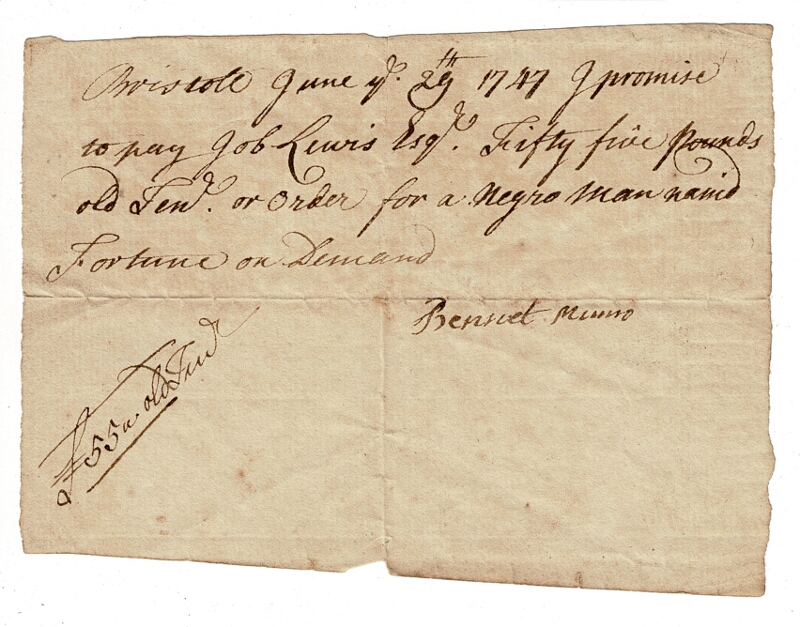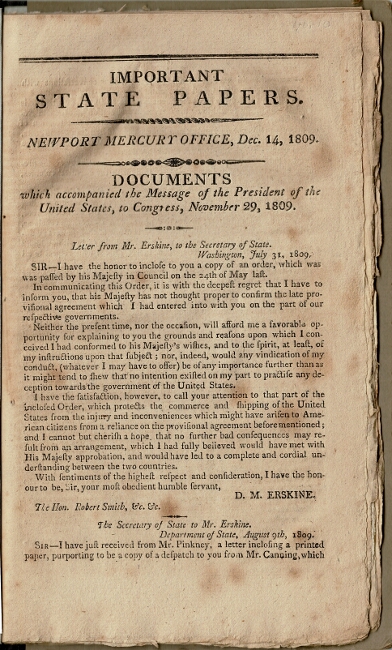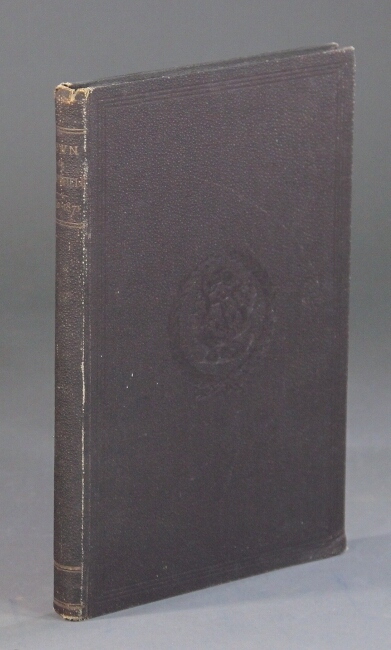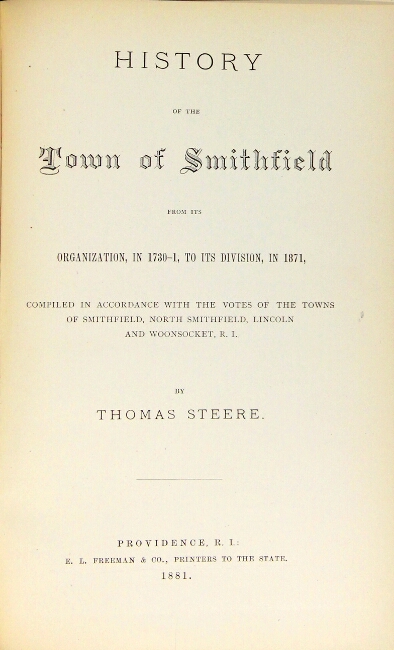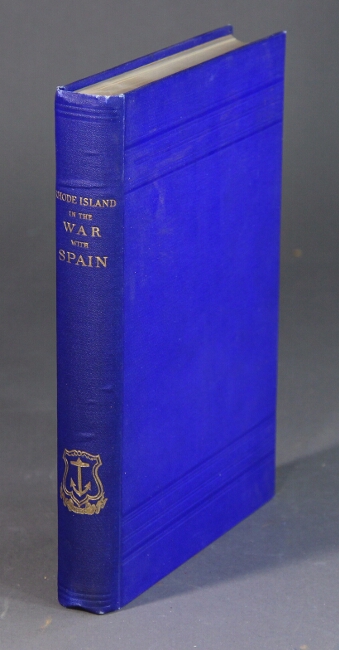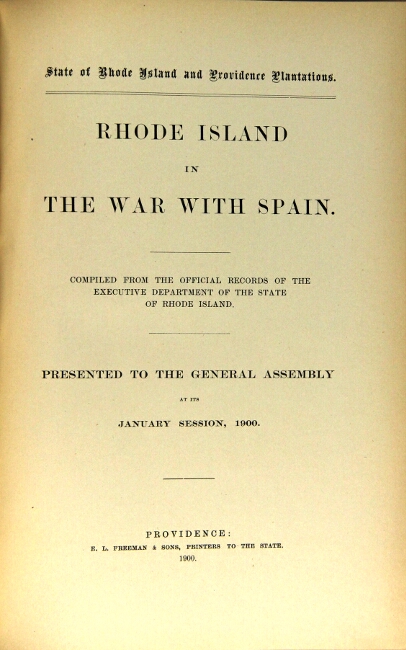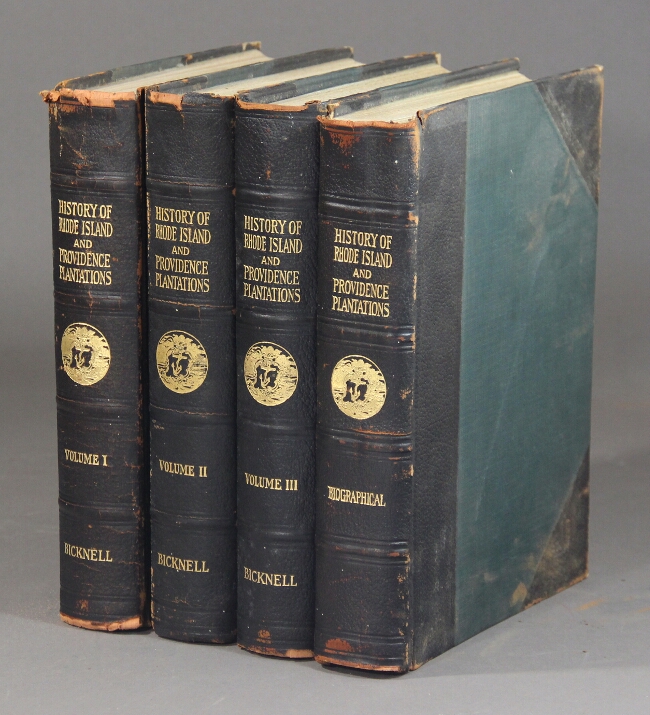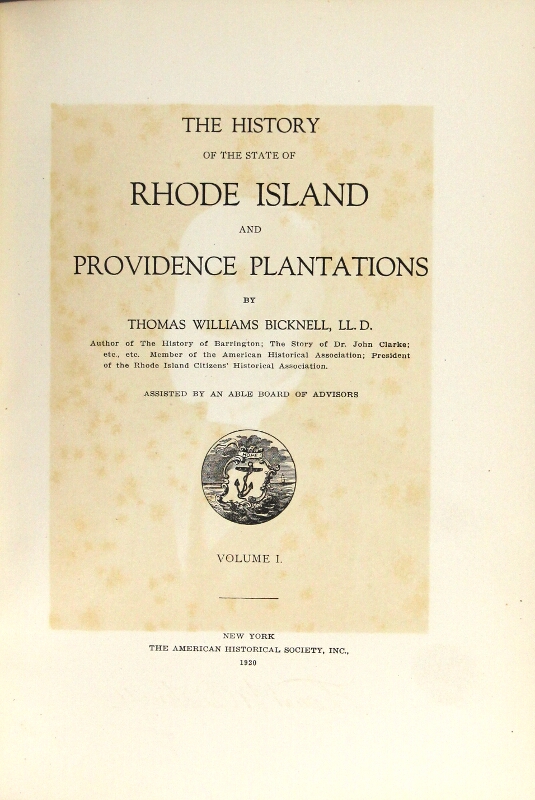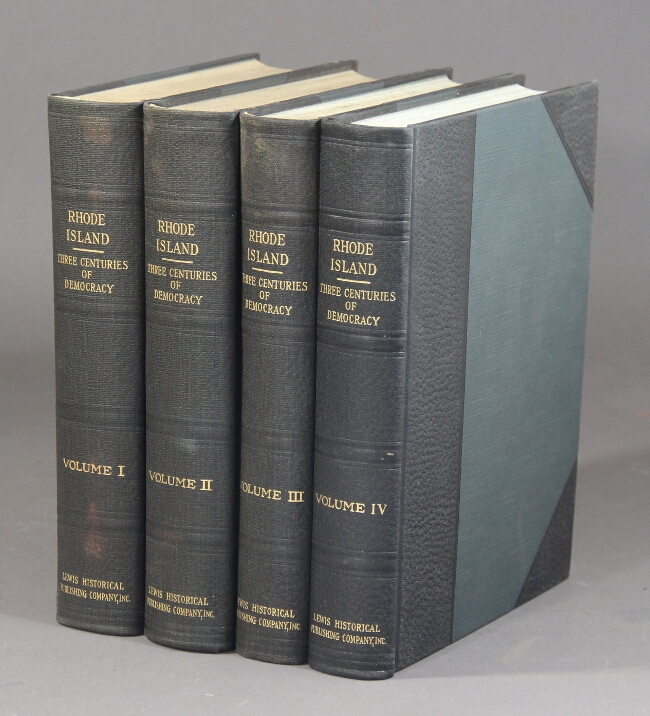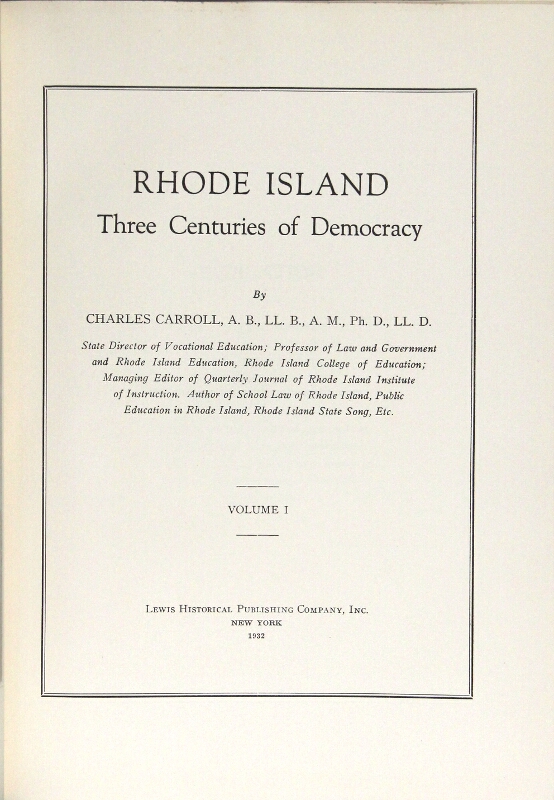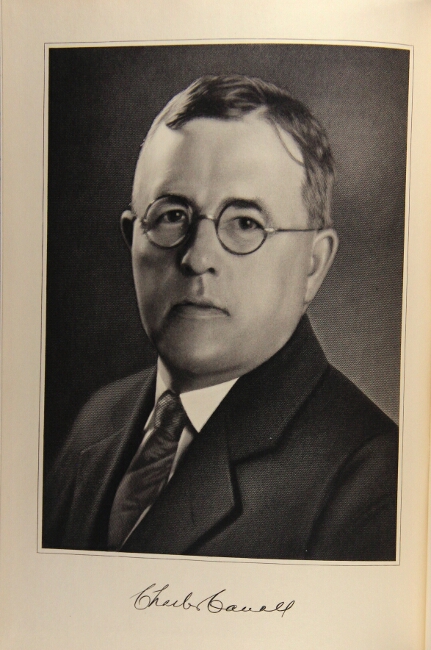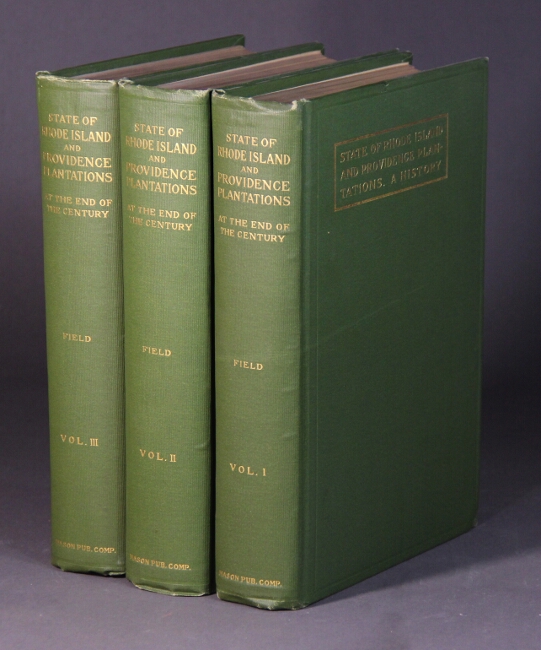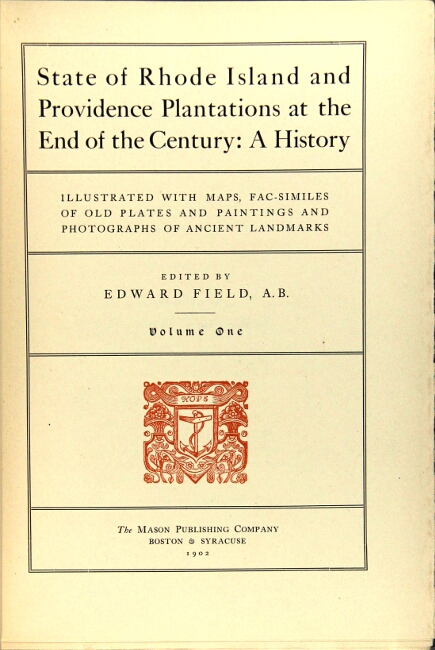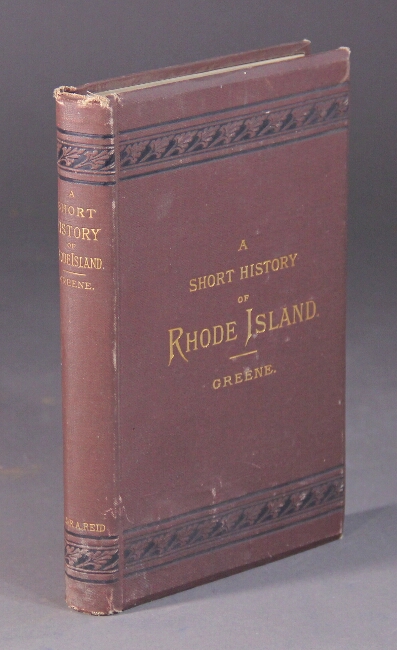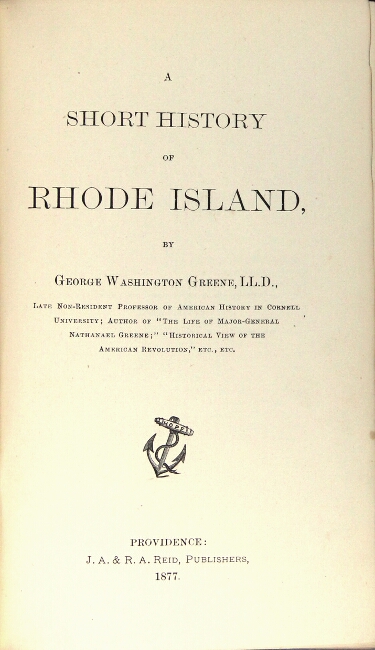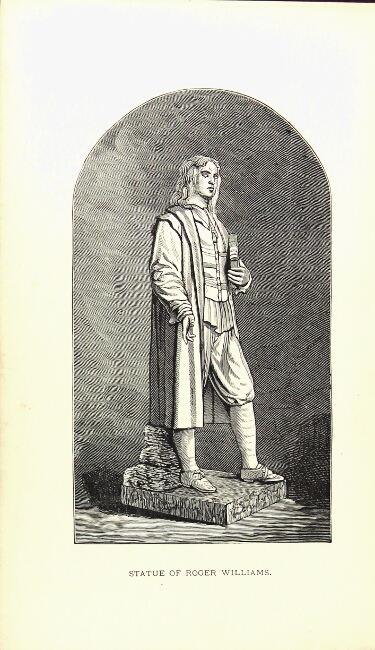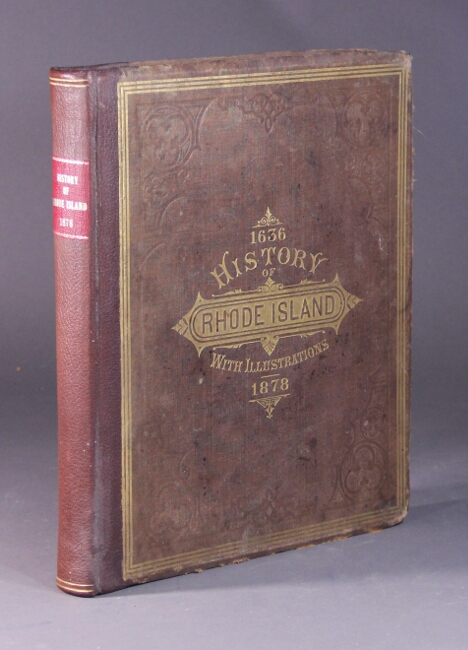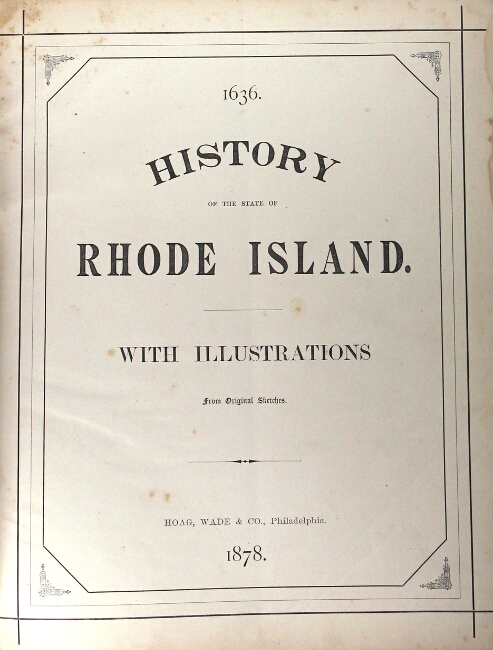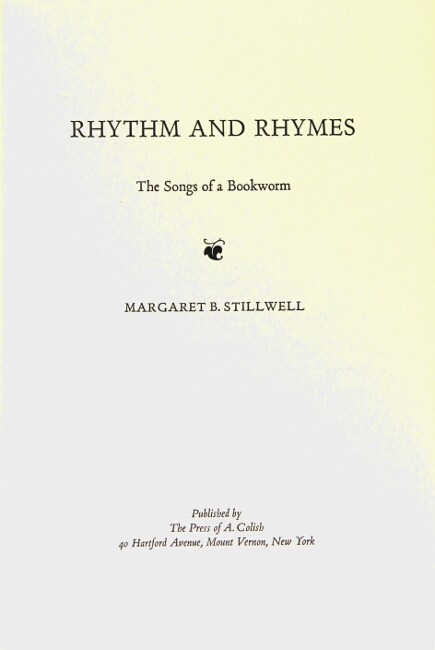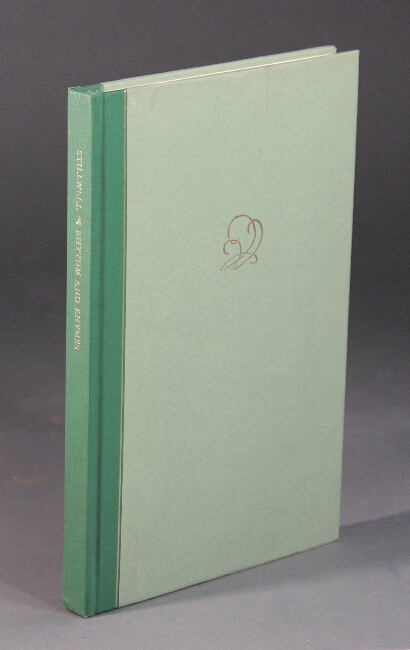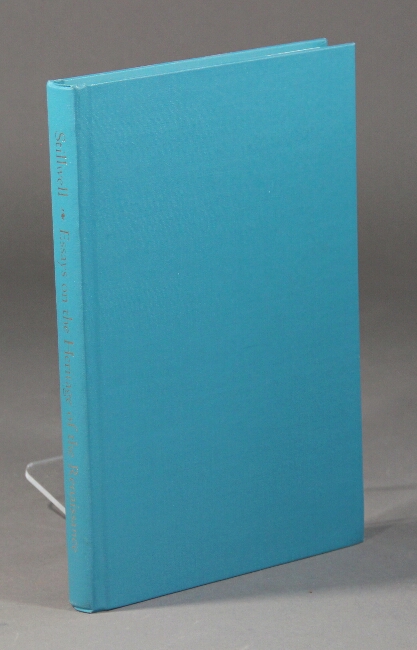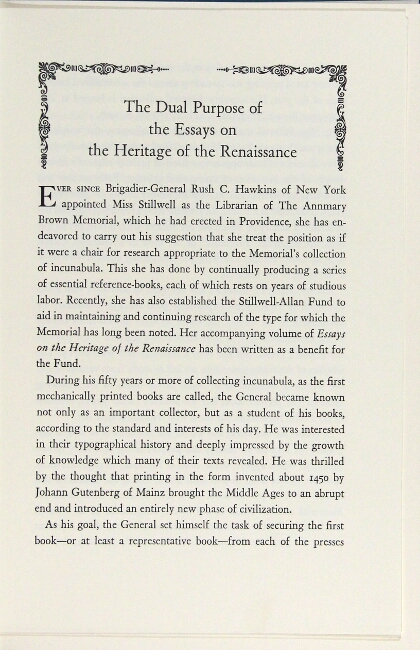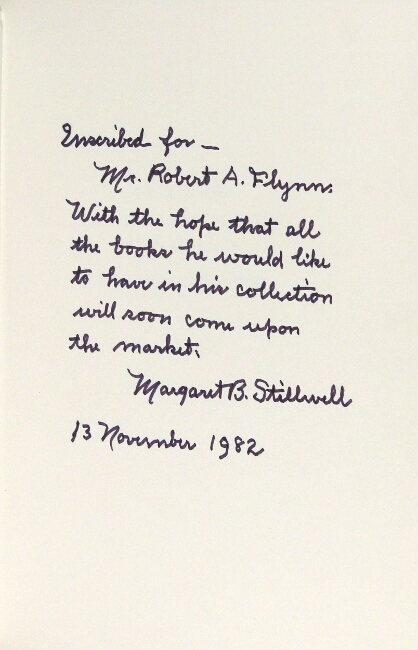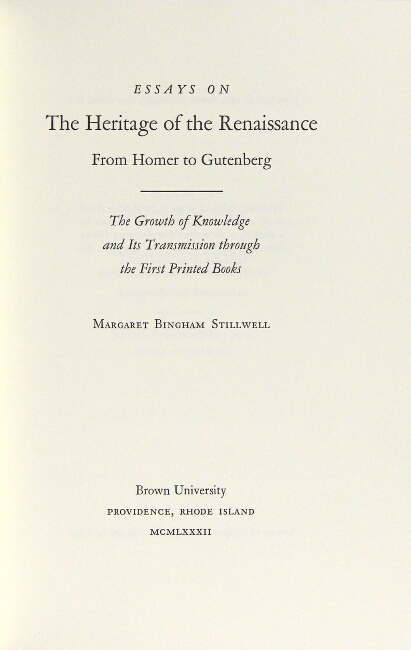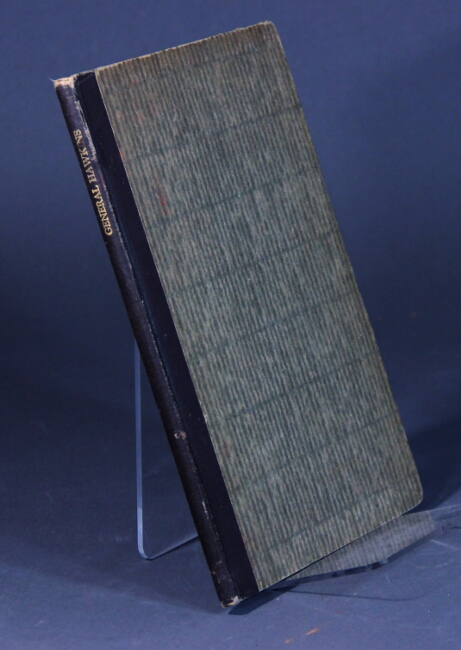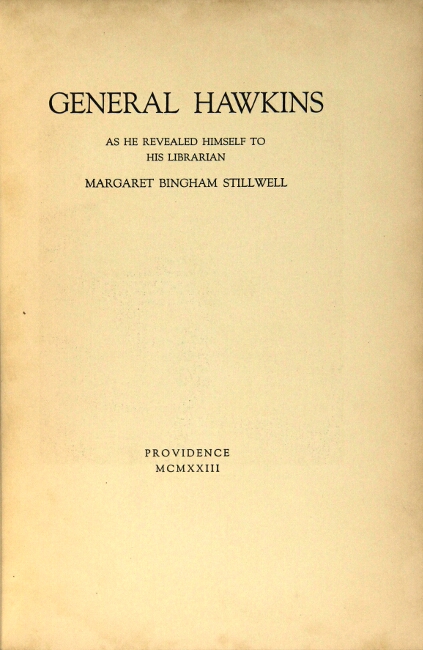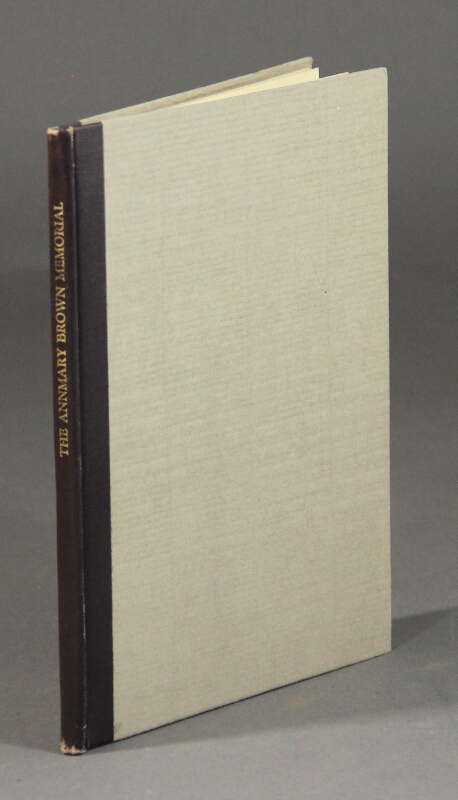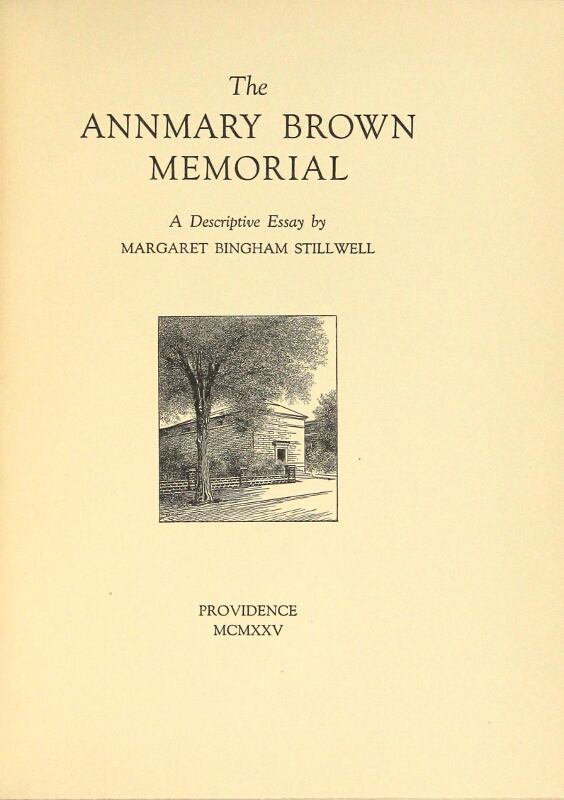701. [Providence.] Angell's Lane. The history of a little street in Providence. Providence: Ackerman-Standard Press, 1948.
$75
8vo, pp. [14], 198, [2], xxxvi; pictorial endpapers, 34 illustrations and a chronological table; original brown cloth, black leather label lettered in silver on spine; previous owner's inscription; very good.
Introduction by Lawrence C. Wroth.
The history of Thomas Street, "a center for thinking men, for men of achievement in the arts, in religion, in law, in commerce, in philosophy and the sciences for a good two centuries."
702. [Providence.] A discourse delivered at Providence, August 5, 1836, in commemoration of the first settlement of Rhode-Island and Providence Plantations. Being the second centennial anniversary of the settlement of Providence. Providence: B. Cranston & Co., 1836.
$40
First edition, 8vo, pp. 72; lightly foxed, removed from binding, wrappers wanting; all else very good.
Pitman (1785-1864) was a United States District Judge of the United States District Court for Rhode Island.
American Imprints 39630; Bartlett, p. 205; Parks 3331; Sabin 63049.
703. [Providence.] Twelfth annual report upon the births, marriages and deaths in the city of Providence for the year 1866. Providence: Hammond, Angell & Co., printers to the city, 1867.
$65
8vo, pp. [4], 48; vignette title page, tables throughout; original blue printed wrappers; light chipping of the spine; very good.
704. [Providence.] The early records of the town of Providence ... printed under the authority of the City Council ... by Horatio Rogers, George Moulton Carpenter and Edward Field, record commissioners. Providence: Snow & Farnham, city printers, 1892-1915.
$1,000
21 volumes, small 4to, portraits and facsimiles, original terracotta cloth, printed paper spine labels; very good.
The first volume is inscribed "Given to Fannie Sheldon Jencks Howe by her friend and former pastor Dr. Augustus Woodbury, and after her to become the property of her eldest son, Sheldon Jencks Howe. 1896."
Exhaustive records of Providence from its founding in 1636 (although the earliest entry is August 1633, the date of birth of the first child of Roger Williams) up to 1750.
Volume 1: Being the first book of the town of Providence, otherwise called the Long Old Book with Parchment Cover;
volume. 2: Being the second book of the town of Providence, otherwise called the Town old book, the Short old book, the Old burnt book and sometimes called the Book with brass clasps;
volumes 3-5: Being part of the third book of the town of Providence, otherwise called the Book with the brass clasps;
volumes 6-7: Being part of Will book no. 1, otherwise called the first booke for Providence Town Councill perticulior use;
volumes 8-9: Being part of the book of records of town meetings no. 3, 1677 to 1750 and other papers;
volume 10: Being the book called Town council no. 1, 1692 to 1714, and containing the records of Providence Town Council;
volume 11: Being the book of records designated as "Town meeting no. 1, 1692-1715";
volume 12: Being the book called Town Council no. 2, 1715 to 1732 and containing the records of the Providence Town Council;
volume 13: Being the book called Town meeting no. 2, 1716 to 1721 and containing the records of the Providence town meeting;
volume 14: Being the first book for the recording of deeds and called Deed book no. 1;
volume 15: Being the Providence town papers vol. 1, 1639-April 1682, no. 01-0367;
volume 16: Being the records contained in Will book no. 2 from Sept. 12, 1716 to Jan. 5, 1728;
volume 17: Being the Providence town papers vol. 2 April 1682-March 1722, no. 0368-0717;
volumes 18-19: Being official records and documents of title and proceedings relative to the north burial ground;
volume 20: Being the first part of the second book for the recording of deeds and called Deed book no. 2;
volume 21: Being the beginning of the second part of the second book for the recording of deeds and called Deed book no. 2.
705. [Prudence Island Journal.] A farmer's winter-time journal kept on Prudence Island in Narragansett Bay. Prudence Island: November 1, 1870 to March 22, 1871.
SOLD
Small 8vo (approx. 7½" x 5"), 97 pages, perhaps 15,000 words, mostly in ink but some pencil, black paper-covered boards; 2 leaves with portions torn away, otherwise very good condition and the penmanship legible.
Now on the National Register of Historic Sites, the original construction of the farmhouse and barn took place in 1805. In 1869 Edward Farnum purchased the 18-acre property from Elizabeth Dennis, the widow of the original owner. The Farnum family continued to farm there until 1955 except for a hiatus 1907-1928 when the farm was leased to tenants.
"Farnum Farm is significant as a rare surviving example of agricultural life in the 19th and 20th centuries on Prudence Island. The farm encompasses several of the historic elements of an island farmstead, including house, barn, milk house, fields, garden, woodland, orchard, and stone walls. Farnum Farm is the last remaining working historic farmstead on Prudence Island and is an important document in Rhode Island and Prudence Island agricultural history" (from the registration form for the National Register).
The first entry is for Oct. 26, 1870: " We had the first frost of the season at Prudence, the ice forming 1/2 inch thick in the calf tub." On Nov. 1 Farnum writes: "Went to Prov[idence] - purchased amongst a number of other things a bbl. flour Linden Mills, at $8.50 and 8 pcs second hand sash for $12 ... Wrote Lyman Bostock to bring me three tons Franklin stove coal..." Nov. 2: "Transplanted my asparagus shoots, sixty of them from the 25-cents worth of canned Collossal seeds I planted last spring..."
This is a farmer's journal kept in winter, so there's quite a bit about getting the crops in, making sure the farm animals are fed, and food for the house. Lots of entries describe the slaughter of ducks, chickens, pigs, and heifers. He often recounts visits with friends, and what seems like a very communal way of living with other islanders. Bartering among them seems common. As winter settles in he finds himself reading more and making repairs to the farmhouse and outbuildings. Over the course of this journal he makes several trips into Providence and Newport, to shop for supplies or to sell his produce. He is literate and a hard worker. The following is a sample from the first two months. Punctuation has been inserted for clarity.
"The cows are drying off - the heifer gives not more than 3 pints, the black cow perhaps 5 quarts ... I have 8 blueberry plants left from the seed I planted in the spring. These and half the asparagus were hoed up by the boys in their ignorance ... All of Potter's Portugu men, four of them - with another, a cousin of John - the chamber-maid, came in tonight to introduce to me the cousin as a laborer desiring to work for me through the winter - well, I hired him at 5 dollars per month ... He speaks no English - has been in the country two months ... While transplanting the cabbage plants today my 3 tons Franklin coal arrived - cost me $9 per ton in Bristol - $3 freight and paid Tom Allen for carting two loads making the 3 tons costing me $31 ... We got nearly all the marigolds into the cellar today...
"Finished Venetia this evening. Rather powerful - but some parts are crude and hurried. D'Israeli evidently felt the necessity of getting rid of his two heros - or his double hero in a thorough manner ... Mr. H.'s sheep again in my garden for the fourth time. I shooed them off on horeseback ... Drove to the school house this evening with Miss Melman and Mother Albro to hear Elder Green hold forth. He believes in dreams, has lately had some very curious dreams about this island and says he firmly thinks some great change will take place here in the course of 6 months. He does not believe in the immortality of any man’s soul – says Jesus had no immortal soul – But it is the body that’s to be prepared for happiness after the resurrection …
"Pulled 4 horse-cart loads of yellow globe turnips (tops and all) and dumped them at the cellar door. I shall heretofore give the tops and worm-eaten ones to the cows … Sent C. J. Albro the litter of young turkeys … they hatched in August and have done well … Sent the man John to Prov to purchase earrings and gold for him to send to his friends in Portugal. He has not been able to return from Bristol the same day and I fear he will not be back till Tuesday, now when I want him so much…
"We killed and dressed today Miss M., John and I all working from 8:30 to 3 o’clock 16 ducks & 2 chickens – the ducks all had pin feathers & were so hard to pull that we all hard sore fingers tonight, and am glad the job is over with. I have now killed all the young ducks I have for market – I have saved two for Lizzie’s Thanksgiving dinner … My duck opinion this year is as follows – began with 5 Aylesbergs (1 drake) one of the ducks died – raised 40 young ducks from I believe about 150 eggs. The six earliest ducks I sold to Stokes for $4.50 about the first of July. July 29th sent 14 ducks to Newport and 5 chickens and up to this month have got no return from them…
"Albro requested me this morning to bring to the wharf to him half a dozen cabbages for his friends in Newport, so I carried down six of the largest some of them weighing upwards to 25 pounds I think (Marblehead monarchs), 6 of them filling a barrel … Yesterday and today I have caught and killed in my hands 18 mice … Drove to the point this evening with Miss Melman first fishing – Capt Cory, Miss Cory and Fred aided us – we caught 32…
"I took the steamboat this morning for Providence … when getting on board the boat I was very much shocked to receive a letter from the expressman announcing the death of my sister Lizzie. I had long known of her feeble health but was very unprepared for this – she had made arrangements to receive all of us this Thanksgiving … Reading Tennyson lately, The Idylls of the King – the evenings are so long I usually read for sixty mins, read aloud a good deal – of Idylls it seems to me I like Elaine as well as any but I must read them again to form a final conclusion. I am somewhat astonished that I have only just become an admirer of Tennyson … Read from Hume’s Chapt. 1 this eve and The Lady of the Lake aloud…
"One horse cart load of seaweed was all my shore afforded – that I put over the grape vines in the garden, covering again with boards – hauled at the same time an ox-cart load of gravel on the lane at the barnyard. Brought my steer from T. L. Allen’s this morning – tied him in the barn in the afternoon. He looks quite well … Read a number of Moore’s Irish melodies and some of Burns’ shorter pieces…
"Killed 20 chickens the dressing of which with the ordinary chores occupied the whole of the day … Went to Prov – gave my chickens to Jencks to sell as Stokes was full. He sold them for 22 cents per pound and with him they amounted to 85½ pounds. He charged me but 50 cents. Met Hattie in Providence … Christmas. We had a spare rib for dinner and our turkey. Spent most of the day reading Hume, his acct. of Cromwell’s administration. Hume calls him a usurper of illegal authority – a criminal of the highest order and gives him credit for every ability intellectual & moral of the first quality – except elocution … Yesterday I traded one of my pigs for a plow with Mr. Knowles. Plow valued at $6. Pig weighed 60 lbs.”
706. [Public Park Association of Providence.] Parks of Providence and other cities. State House, Normal School. Rain baths. Biographical sketches of prominent deceased members [wrapper title]. Providence: Snow & Farnham, printers, 1891.
SOLD
8vo, pp. 126; illustrated; original printed brown wrappers; wrappers toned and brittle; all else very good.
Inscribed at the top of the front wrapper "R. A. Guild from the author." And the author has also written in the middle of the wrapper "By Dr. J. Newell."
707. Iron forge account books from Gloucester, R.I.. [Gloucester, R.I.: 1783-1809.].
SOLD
2 volumes, folio, nearly 1,000 pages of accounts in ink, legible; covers missing, edges often frayed and text toned, occasional dampstaining obscures some lines; volume I lacks index pages A-F; volume II has N-Z in index only; loose receipts and notes of debts occasionally laid in; the bindings are sound. Volume I covers the period 1783-1790; volume II 1803-1810.
Oliver Owen (1763-1825) of Putnam & Company was operating an iron forge in Gloucester as early as 1785. He was in business with Eli Putnam, another Gloucester entrepreneur. Early accounts show much activity in "fetching one ton of iron oar from Cranston," and "carting one ton of pig iron from the furnace." Products included horse shoes, cart hoops, hatchets, spindles, axes, and all manner of iron tools. The furnace was fired by coal, and entries for the constant fueling needed, such as "by seven load of coal" are common.
Bicknell's History of Rhode Island describes the extent of the industry in Gloucester, paraphrased here: Coaliers operated as many as a dozen pits which produced nearly a quarter million bushels of charcoal a year. Nearly thirty factories manufactured potash for soap-making. Tannin was produced at the Acid Works in Harmony for hide-curing and dye-setting. John Waterman owned a paper mill on Brandy Brook in the 1790s. Forges were vitally important. Iron ore found in the Chepachet River banks was made into farm tools, nails, and horse and oxen shoes. Daniel Owen exported tools and horse shoes to England in the mid-1700s. In the early 1800s, Oliver Owen made edged tools with the triphammer established at his nail factory on the Chepachet River. Blacksmiths were found at many crossroads and, in the larger communities, wheelwright, carriage and harness shops were added.
The Owen family served many customers in Providence County including many recognizable Rhode Island names: the Sayles. the Bowens, the Browns, the Watermans, the Olneys, the Ballous, and the Spragues - these as well as many other recognizable Rhode Island names are to be found in these ledgers. By 1819, however, only three furnaces were operating in the state. An account book of importance to the study of the economic history of the state, and to the earliest beginnings of the industrial revolution in Rhode Island.
708. Once upon a time in Rhode Island ... Illustrated by Helen B. Mason. [Garden City, New York: Doubleday, Page & Company, The Country Life Press for] Society of Colonial Dames in Rhode Island, [1914].
$25
First edition (sheets bulk at 7/8"), 8vo, pp. [14], 5-204, [2]; 12 full-page illustrations; original blue cloth lettered in yellow on upper cover and spine; very good copy.
Accompanied by a later issue (sheets bulk at 5/8"), otherwise as above.
Twelve stories from history about Rhode Island people and events: the Norsemen, Roger Williams, the Gaspee incident, Gilbert Stuart, Oliver Hazard Perry, etc.
709. [Quakers.] New England Quakerism illustrated: or facts relative to the expulsion of Adam Anthony from the Society of Friends. North Providence: published by the author, 1843.
$150
First edition, 12mo, pp. 71, [1]; original printed brown wrappers; errata slip on verso of front wrapper; front wrapper stained extending into the text for several leaves, joints partially cracked; good.
Regarding Anthony's farm which he sold in distress and wanted sold back to him. Printed by R. W. Potter in Pawtucket.
American Imprints 3672; not in Bartlett or Sabin.
710. [Quakers.] Some account of the early part of the life of Elizabeth Ashbridge, who died, in the service of the truth, at the house of Robert Lecky, in the county of Carlow, Ireland, the 16th of 5th month, 1755. Providence: H. H. Brown, for the Trustees of Obadiah Brown's Fund, 1831.
$750
12mo, pp. 60; original drab front wrapper; some browning, very good.
Preceded by several other editions between 1774 and 1820, this poignant autobiography chronicles the spiritual journey of an independent woman in a patriarchal world. Born in England in 1713, Elizabeth Ashbridge eloped at the age of 14, but within several months she was a widow. After her parents refused to take her in she went to Ireland to live with Quaker relatives. At the age of 19 she immigrated to the United States where she was indentured as a servant in New York. After two years she managed to purchase her freedom from a cruel master, then married a teacher named Sullivan who proved to be abusive. Disappointed that the Anglican ministry was closed to women, she tried other denominations, but became disenchanted with clerics indifferent to her aspirations. Visiting Quaker relatives in Pennsylvania, she converted. Her growing independence and secular life increasingly alienated her husband. After Sullivan's death, quickened by habitual drunkenness, she married Aaron Ashbridge, a respected Quaker from Chester Co., Pennsylvania.
Elizabeth Ashbridge overcomes an authoritarian father, a cruel master, an abusive husband, and the hypocrisy of the priestly class. In her failed marriage and in her faith, Ashbridge chooses conscience over convention. Her story provides a unique perspective on the situation of women at the time of the Great Awakening.
A thriving Quaker population in Rhode Island likely accounts for the publication of this edition, paid for by the Obadiah Brown Fund, which was founded in Providence in 1823 by bequest of Obadiah Brown "to be a fund, independent of New England Yearly Meeting, to enhance the Religious Society of Friends through grants to individuals and Friends organizations, and specifically for 'the printing and disseminating of useful books for the promulgation of the gospel and by that means, as well as, otherwise spreading our Religious Principals where they are little known'.”
Obadiah Brown was the son of Moses Brown, the founder of the Quaker School in Rhode Island (i.e. Moses Brown), and the nephew of John Brown, founder of Brown University. The original bequest from Brown was $100,000, said to be the largest single bequest to an institution of learning up to that time. The Obadiah Brown Fund exists to this day.
This edition not in Smith, Friend's Books (see pp. 135-36); American Imprints 5802.
711. [Quakers.] Reasons for the necessity of silent waiting, in order to the solemn worship of God. To which are added, several quotations from Robert Barclay's Apology. Providence: printed for the trustees of O[badiah] Brown's Benevolent Fund [by] H. H. Brown, 25 Market-Square, 1834.
$125
First edition, 8vo, pp. 24; original drab wrappers with an 1834 Burriville, R.I. gift inscription on the front wrapper; very good.
First published in the United States in Philadelphia, 1786. A thriving Quaker population in Rhode Island likely accounts for the publication of this edition, paid for by the Obadiah Brown Fund, which was founded in Providence in 1823 by bequest of Obadiah Brown "to be a fund, independent of New England Yearly Meeting, to enhance the Religious Society of Friends through grants to individuals and Friends organizations, and specifically for 'the printing and disseminating of useful books for the promulgation of the gospel and by that means, as well as, otherwise spreading our Religious Principals where they are little known'.”
Obadiah Brown was the son of Moses Brown, the founder of the Quaker School in Rhode Island (i.e. Moses Brown), and the nephew of John Brown, founder of Brown University. The original bequest from Brown was $100,000, said to be the largest single bequest to an institution of learning up to that time. The Obadiah Brown Fund exists to this day.
712. [Quakers.] Three-page autograph letter signed to Horace Stearns, hatter, Cornhill, Boston. Smithfield: December 18, 1823.
$275
4to, in ink, approx. 55 lines, approx. 300 words, on integral sheets, with docket, postmark, and address panel on verso of the second sheet; very good. Seal with small triangle cut out, no loss. Very legible.
Written in the Quaker style, Thomas Buffum of Thos & Arnold Buffum, importers and hat manufacturers, writes to his dealer in Boston: "When we first made thee a Consignment of hats thou proposed to give us a guarantee from thy Uncle James Stearns for the amount thou might Sell if thou canst now give us his guarantee we would make an arrangement to supply thee with a good aportment of Fur & Cotton hats both for wholesale & retail on much more favorable terms ... for all sold at wholesale we would still allow a Commission we wish the guarantee to run to Richard M. Smith Agent of the Beaver Hat Company Providence."
Buffum notes "We are making very handsome Napped hats finished in best New York Style ... at $2.50 a piece." He includes a list of various other types of hats he makes including "beaver hats, mens cotton ditto, youths ditto ... full trimmed Yorkies at 1.25," etc.
Arnold Buffum (1782-1859), father of Elizabeth Buffum Chace, was also known for his abolitionist sympathies and was the first New England Anti-Slavery Society agent. An article was written on his work in William Lloyd Garrison's The Liberator on Sept, 8, 1832. Horace Stearns was one of the furrier and merchant family in business since 1810 and in 1821 was at 22 Cornhill Street under the name of Thomas Stearns & Company (Horace S.), hat manufactory, Brattle Street.
713. [Quakers.] Two Quaker sisters from the original diaries of Elizabeth Buffum Chace and Lucy Buffum Lovell ... foreword by Rufus M. Jones. New York: Liveright Publishing Corporation, [1937].
$40
8vop, pp. xxx, [2], 183, [1]; front endpaper map, rear endpaper genealogical tree, frontispiece portraits, 20 plates; original red cloth stamped in gilt on upper cover and spine; worn and torn dust jacket.
Inscribed on the half-title "To Edward R. Durgin with my very sincere regards Malcolm R. Lovell."
Two militant abolitionist sisters from Rhode Island.
714. [Quakers.] Memorials of deceased Friends of New-England Yearly Meeting. Published by the Meeting for Sufferings, 1841. Providence: Knowles & Vose, printers, 1841.
$50
First edition, 8vo, pp. viii, [9]-96; bound with, probably as issued: The Testimony of the Society of Friends on the Continent of America. Printed in Philadelphia, 1830. 8vo, pp. 36; together in likely original green paper-covered boards, sheep shelfback (scuffed); very good.
Memorials contains nearly 30 memorials of Quakers who had died during the previous year, including Obadiah Brown, Elizabeth Mott, and David Buffum.
Not found in American Imprints; Sabin 47739.
715. [Quakers.] Quaker marriage contract between John Borden and Sarah Shearman. Portsmouth: December 8, 1784.
$1,250
Folio pro-forma document (approx. 16½" x 13"), filled in and signed by the principals and 34 witnesses; docketed on verso and recorded by Thos. Gould, Jun., Middletown, December 10, 1784; watermarked paper, archival repairs along two vertical folds, and a horizontal fold. Inch or smaller tears in two margins, not affecting text.
The Bordens and Shearmans (Sherman) were among the early Quaker families who settled Portsmouth, Rhode Island. This marriage contract, taken at the public meeting house in Portsmouth, certifies that John Borden of Portsmouth, son of Joseph and Catherine, married Sarah Shearman, daughter of Job (then deceased) and Martha. The contract is signed by the martial couple and thirty-four witnesses, likely all, or mostly Quakers. They include members of the Lawton, Mott, Anthony, Almy, Chase, Freeborn and other families. The current Quaker meeting house (built ca. 1699) still stands--it was occupied by British troops during the Revolution. In the year of this marriage, 1784, Moses Brown School was founded by the Quakers in Portsmouth; it was moved to Providence in 1819.
Richard Borden arrived in Boston with his wife and two sons, fifteen years after the Mayflower had landed in 1620. In March 1638, Anne Hutchinson was put on trial in Boston, excommunicated and banished. She was a signer of the Portsmouth Compact, considered by many as the first declaration of religious freedom in the colonies. With the help of Roger Williams, the group of settlers purchased land from the native Americans at Aquidneck, which would become the site of Portsmouth, Rhode Island.
The original John and Richard Borden and their families were members of this group. Richard was to become a leader in the Portsmouth community, and was one of the founders of the Society of Friends in Portsmouth. He was the direct ancestor of this John Borden (1752-1828) and his second wife, Sarah Shearman (1764-1862). Sarah's ancestor, Philip Sherman, was one of the most conspicuous figures in the early affairs of the Colony of Rhode Island, and played a prominent part in public life. He was general recorder of the Colony, and in 1665-67 served as deputy to the General Court of Rhode Island. On April 4, 1676, he was one of sixteen men chosen to assist and advise the Council. On moving to Rhode Island, he left the Congregational church and joined the Society of Friends.
716. [Quakers.] Rules of discipline of the yearly meeting held on Rhode Island for New England. Printed by direction of the meeting. New Bedford: Abraham Shearman, Jun., 1809.
$500
8vo, pp. xvi, 156; contemporary full calf, spine and back cover worn and abraded, moderate foxing; good and sound.
Interesting annotated copy (author(s) unknown) with substantial commentary on tipped-in slips and in the margins of the text - about a dozen in all, each about a paragraph or two in length. Corrections are dated 1811-1856. For example: A tipped in revision between pages 12 and 13: "Being very desirous that friends should keep commendable plainness and simplicity in the burial of the dead ... it is the advice of this meeting, that no monuments be set up in our burial grounds ... except a plain stone not to exceed fifteen inches in height..."
The Society of Friends periodically appointed committees to revise their religious discipline. During the time period of the revisions in this book, which was originally printed in 1809, the Gurneyite/Wilburite Separations were occurring in in Ohio, New England, and New York. The Providence Journal in 1852 was printing news of the "Great Quaker case" which pitted Gurneyites against the Wilburites. The decision settled the title for property (in favor of the Gurneyites) belonging to the Society of Friends within the jurisdiction of the New England Yearly meeting. The first book of Rules of Discipline from 1785 was revised in 1807. In this year, twenty-two years after the publication of the first printed edition of the Book of Discipline, "during which period the new regulations which had taken place having rendered it an imperfect collection of the rules of the Society, and the book being out of print, the Yearly Meeting committed the revisal of our Discipline to the meeting for sufferings, and that meeting having with care and diligence completed and laid the same before the Yearly Meeting in 1785."
American Imprints 17585
717. [Quakers.] Journal of the life, travels and gospel labours of that faithful servant in minister of Christ, Job Scott. New-York: printed and sold by Isaac Collins, no. 189, Pearl-Street, 1797.
$150
12mo, pp. xii, [2], 360; contemporary and likely original full sheep; rubbed and worn, hinges cracked; good, and the binding remains sound.
Early ownership signature of Hannah Winslow. A small typed note on the front pastedown notes: "Bought Libbie Sale, Jan. 24 & 25, 1911."
"In this travelogue and account of American Quaker practice, Scott recounts how he traveled from his home in Rhode Island to congregations of Friends throughout the United States as they then existed, before making an expedition to Europe to attend meetings in England, Wales, and Ireland. Though evocative place names are abundant, travel-detail is limited. His diary is divided between his soul-searching and specific accounts of his experiences at various meetings. Although Scott often records feeling compelled to remain silent in these meetings, he was a notable speaker, and his writings, although they became controversial after his death, were highly influential" (OCLC).
Not in Bartlett; Evans 32810; Howes S228; Sabin 78288.
718. Charter of the Redwood Library Company, granted A.D. 1747. Newport, (R.I.): printed by Rousmaniere & Barber, 1816.
SOLD
8vo, pp. 14; bound with, as issued: Catalogue of the Books Belonging to the Redwood Library Company. In Newport, State of Rhode-Island, April, A.D. 1816, pp. [15]-36, [4]; 20th-century half red morocco over marbled boards, gilt-lettered spine; text a bit toned, else near fine.
American Imprints 38763; Bartlett, p. 224; Hammett, p. 126-27; Sabin 55053.
719. [Redwood Library.] An historical sketch of the Redwood Library and Athenaeum, in Newport.... Boston: printed by John Wilson and Son, 22, School Street, 1860.
$75
First edition, 8vo, pp. liii, [1]; original printed salmon wrappers with small stain in the gutter and with some chipping along the spine; all else very good.
Established in 1747, the Redwood Library and Athenaeum was "the first library in Rhode Island ... the oldest lending library in America, and the oldest library building in continuous use in this country" (Redwood website).
The original building, built in 1750, designed by Peter Harrison "is possibly one of the most architecturally influential buildings in America" (ibid). Within a short time after its founding, "the books purchased with Mr. Redwood's money were considered ... the finest collection of works on theology, history [and] the arts and sciences in the American colonies" (Public Libraries in the United States, vol. I, Washington, D.C., 1876).
Dr. David King was president of the library. The text also includes a complete list of he library's members from 1747 to 1860.
Not in Bartlett; Parks 2154; Sabin 37794.
720. [Redwood Library.] Annals of the Redwood Library and Athenaeum, Newport, R.I. 1698-1821. Newport: Redwood Library, 1891.
$100
First edition, small 4to, pp. [9], 10-528; portrait frontispiece of Abraham Redwood plus 11 plates; Bowdoin College bookplate marked withdrawn, small pressure stamp on title page and sticker on spine; very good and sound in original terracotta cloth stamped in gilt on upper cover and spine.
721. One hundred and forty-second, one hundred and fifty-ninth, and one hundred and sixtieth Annual Reports of the directors of the Redwood Library and Athenaeum, to the proprietors. Newport: James Atkinson [and] F. W. Marshall, printers, 1872, 1889, & 1890.
$60
3 volumes, pp. 26; 38, [4]; 26, [2]; very good in original printed blue and tan wrappers.
The library, the second oldest in the country, was founded in 1730 and incorporated in 1747 and the building erected in 1748.
722. Joseph Reynolds, Day Book, July A.D. 1796 [cover title]. South Kingston: June 10, 1796 - April 30,1801.
$1,500
Narrow small folio, 327 pages in ink, in a relatively neat hand and (mostly) legible; the last 2 leaves a bit defective with loss at the top of the pages; stiff paper covers, the back cover with same loss as the last 2 leaves; printed title on front cover; toned, the binding a bit shaken; good.
As the title implies, this is not a ledger with specific accounts for individuals, but a chronological tally of the commercial activities of Joseph Reynolds. Reynolds (1761-1823) lived from 1761 to 1823, and is buried in Cemetery #80, on Little Rest Road in Kingston. His name also appears on the 1800 census for Washington County.
From the sixth edition of the Explorers' Guide to Rhode Island, p. 289 referencing Joe Reynolds' Tavern on Kingston Road: "Built in the mid-18th century, this was the principal village hostelry in the first half of the 19th century. Both Benjamin Franklin and George Washington are said to have been guests here, and a famous local story recounts how Franklin, arriving on a particularly cold night and not offered a seat by the fire, asked one of the servants to take some oysters to his weary, hungry horse for dinner. The whole assemblage in the Tavern followed the house-boy to see the oyster-eating horse, giving Franklin plenty of room by the fire. The tavern is now a private residence.
This "day-book" records in heavy detail the day-to-day operations of Reynolds and offers significant information on patterns of alcohol consumption in late 18th-century Rhode Island. Much of Reynolds' trade was in alcohol: one of the first entries in the ledger is for a ½ mug of cider and a gill of rum, the 18th-century version of a boilermaker, it appears. Reynolds also sold gin, wine, and punch, generally in quantities that suggest consumption on the premises. Other early entries are for lodging and meals, suggesting that Reynolds was also an innkeeper; entries for axes and pitchforks suggest that he was also a legitimate smith, not just a farrier. The name of each customer and the date of his visit are recorded in full. It seems possible to reconstruct the comings and goings of Reynolds' clientele with a good deal of accuracy.
723. [Rhode Island & Massachusetts Housewright & Builder.] Day book 1833-1840. .
$650
Tall narrow folio, 150 pages, in ink; the first 6 leaves with overpasted newspaper clippings; some pages loose, cut or missing; some pencil doodlings; some toning and occasional offsetting; contemporary and likely original calf-backed marbled boards, spine partially perished and joints cracked.
Detailed accounts of the work of a largely unknown itinerant Massachusetts housewright and general builder, Simeon P. Pullen. Housewrights were somewhat different than simple carpenters in that they could make plans, organize other workers, and bring a building project to completion. Little is known about Simeon P. Pullen personally, although his marriage to Mary L. Bradford appears in the Fall River, Mass., records in 1829.
His work detailed here was for jobs in Fairhaven, Dartmouth, New Bedford, Mansfield, and Providence, R.I., and he boarded his family on location. For a job in Dartmouth in April 1, 1834: "Simeon P. Pullen moved into David Crosby house the last day of march 1834 hired the hole consern for one year and to pay him forty dollars rent". His crew at the time included David Cardy who began work May 12, 1834 for $5 a month, Crapo (probably Isaac Crapo), and Sparrows, whose first name is not given.
The next job was in Fairhaven with Mr. Pearce "to finish a part of Mr. Abernathy hous for $225. and find more (new?) stuff (?)". In 1833: "Mr. William and Charles Mason to Pearce & Pullen for work on Andrew Rodman house witch thay agree to pay and on Miss rodman hous". In Dartmouth in 1834 Pullen did a major job building a bridge for Joseph Gifford at $1.17 per worker per day.
In Providence in 1836 & 1837, Pullen was in partnership with one Isaac G. Brown. They worked on projects for Mr. Baker, Elisha Durfee's wharf, and D. Vincent. "Providence August 1837. D. Vincint to Brown & Pullen for one door frame $1.00, to one window fraim .50, for putting the pediment a crost the north end $12, for a pot closet under the garet stairs $2.00, to cobboards in the chimney $6.00, for repairing the well drum .50, to buildin the fence at .33 per foot $13.33..."
In August of 1838, Pullen built a jeweller's shop in Providence for Benjamin B. Brownell for $450. He and his crew worked on the steamboat John W. Richmond as well as for "Dr. Arminton". The steamboat John W. Richmond, plied the waters between New York and Providence and was named for a successful physician who was also known for holding much of the State of Rhode Island's Revolutionary Debt in bonds and stocks. The last jobs in the book are back in the Fairhaven and New Bedford area.
724. [Rhode Island - Massachusetts Boundary Dispute.] Argument in the case [of] Rhode-Island against Massachusetts. Printed by Order of the General Assembly. Providence: Knowles, Vose & Company, 1838.
$325
8vo, pp. 60; stitched, as issued; external leaves foxed and dust-soiled, a crimp in lower margin throughout; all else very good.
This case before the U.S. Supreme Court involves a boundary dispute between the two states dating back nearly 200 years. The Court rejected the states' rights argument made by Daniel Webster, representing Massachusetts, and affirmed its authority to determine the boundary, Justice Taney dissenting.
The Court adopted Hazard's position, which involved a sophisticated exposition of early Constitutional history, holding [over Chief Justice Taney's dissent] that it did have jurisdiction. Ironically, Massachusetts presented a State Rights argument, that the Court might lack the power to execute its judgment against Massachusetts. Hazard, seizing a delicious opportunity, responded, "What! does Massachusetts threaten? Is Massachusetts ready to become a nullifying State, and to set up her own will in defiance of the decrees of this Court and the Constitution itself?"
American Imprints 50778; Bartlett, p. 36; Sabin 70550. See 37 U.S. 755 [1838].
725. [Rhode Island - Massachusetts Boundary Dispute.] Massachusetts Bay court document concerning the Massachusetts and Rhode Island boundary. Boston: November 11, 1710.
$800
Holograph document (approx. 12" x 7"), signed by G. Willard, Secretary; integral leaf attached, docketed on the verso of the second leaf; previous folds, else near fine.
Serious difficulties occurred between the border inhabitants of Massachusetts and Rhode Island because of conflicting grants. Governor Samuel Cranston of Rhode Island pushed to appoint commissioners to settle the line. Major Joseph Jenks (later Governor of R.I.) was part of one commission and this document states: "Upon reading a letter from Samuel Cranston, Esq. Governour of her Majesty's Colony of Rhode Island...that the General Assembly...have fully empowered Major Joseph Jenks of Providence...and that what shall be concerted and agreed upon...shall be a final issue & settlement of the said partition line..."
The second part of the document concerns an answer to the proposal stating that Dudley (Gov. Joseph Dudley of Massachusetts 1647–1720), desired a conference with Jenks and "That his Excellency is hereby empowered with the advice...of Nathaniel Payne, Esq, Mr Nathl Blagrove and Maj. Samuel Thaxter...to make a final issue of that difference." Payne, Blagrove, and Thaxter were Massachusetts representatives.
The commissioner's action was approved by the legislatures of both colonies in March of 1711. The agreement that was made states "That the stake set up by Nathaniel Woodward and Solomon Saffrey, skillful, approved artists, in the year of our Lord one thousand six hundred and forty-two, and since that often renewed, in the latitude of forty-one degrees and fifty-five minutes, being three English miles distant southward from the southernmost part of the river called Charles River, agreeable to the letters-patents for the Massachusetts province, be accounted and allowed on both sides the commencement of the line between Massachusetts and the colony of Rhode Island..."
However, disputes raged on and in 1750, the General Assembly of Rhode Island passed an act authorizing the boundary line to be run, and appointing certain persons to perform this duty. In the preamble to this act, it is stated that the line never had been settled and "run according to the royal charter; and that divers persons have set forth their right to the Assembly to be under the jurisdiction of Rhode Island, instead of that of Massachusetts." The border was not settled between the two states until many years later.
726. [Rhode Island - Massachusetts Boundary Dispute.] Rhode Island boundary document, relating to the Pawtuxet lands. [Providence?: February 6, 1709 "or 10.".
SOLD
Small octavo sheet (approx. 7½" x 5½"), accomplished in ink, signed by Thos. Fenner, Benjamin Carpenter, Joseph Williams, Peleg L. Rhodes, Richard Browne, Andrew Harris. Some browning, old folds, very good. Docketed on the verso: "The committee for Providence & Pawtuxet recording their differences."
This document relates to the ongoing disagreements about the boundaries of the Pawtuxet Purchase, which had been originally negotiated by Roger Williams. Some of the "Arnold-Harris" group, called the "Monopolizers" by Williams, became so frustrated in settling their claims they asked the magistrates of Massachusetts Bay to settle the dispute. This document (here given in full) begins: "Confirming the difference between Providence and Pawtuxet it is agreed by us whose names are here unto subscribed that the gentlemen now living of the former trustees (viz) Capt. Arnold & Maj. Hopkins & Maj. Thomas Olney shall give the true intent and meaning (if they pleas) of their agreement bearing date in January 1682 and what they or any two of them shall agree and declare to be their intent by said agreement shall stand good & be our determination thereof as witness, our hands this sixt day of February 1709 or 10." With signatures of the committee above following.
The controversy was not settled until Rhode Island Governor Samuel Cranston's efforts between 1710 and 1714 settled the disputes largely in favor of Providence and Warwick and against the old claims of William Harris and the Arnolds. One signer of this document, for example, was Andrew Harris, Jr. 1676-1725 grandson of William Harris, one of the original Rhode Island proprietors. Early on, the line between Warwick and Providence was established as the Pawtuxet River, so the southern part of the village of Pawtuxet became a part of Warwick. The part north of the river was a part of Providence until Cranston was split off in 1754.
727. [Rhode Island Coal Company.] An act to incorporate the Rhode Island Coal Company, February, 1809. Boston: printed by John Eliot, Jun., 1809.
$225
Small 8vo in 4s (approx. 6¼" x 4"), pp. 24; original marbled wrappers; very good.
The Rhode Island Coal Company was a Massachusetts corporation, but mined in Rhode Island. Commercial coal mining began in Rhode Island in Portsmouth in 1808 and lasted there until about 1912; on the west side of the bay it lasted into the 1950s.
American Imprints 18512; Goldsmiths'-Kress 19818.13; Rink 3410; not in Bartlett or Sabin.
728. [Rhode Island Evangelical Consociation.] Minutes of the annual meeting of the Rhode Island Evangelical Consociation and of the Rhode Island Home Missionary Society and plea; held at Slatersville ... June 12th and 13th, 1860. Providence: M. B. Young, 33 Westminster St., 1860.
$75
8vo, pp. 22, [2]; original printed brown wrappers; corners chipped, some soiling; text very good.
Concerning the Congregational denomination, with 21 churches in R.I.
Not in Bartlett; AAS only in OCLC.
729. [Rhode Island Graft.] Extravagant and wasteful expenditure of the people's money. Fellow citizens -- it is well known to you all, that our state has received a part of our proportion of the surplus funds of the Union, created by the sales of the public lands.... [Newport: publisher not identified, 1837.].
$650
Folio broadside (approx. 13¾" x 12"), text in triple column under the running head, signed at the end of the third column "Brenton" and dated August 21, 1837; a touch of creasing in the margins; near fine.
Protests the use of funds generated by sales of public land to raise the salaries of state judges and assemblymen, and to pay state bank commissioner Samuel Young Atwell, Jonah Titus, and Elisha R. Potter.
NY Historical only in OCLC. Not found in American Imprints, Bartlett, Hammett, or Sabin.
730. Catalogue of books obtained by the Rhode Island Historical Society, from the sale of the library of the late Joseph J. Cooke, March-December, 1883. Providence: Kellogg Printing Co., 5 Washington Row, 1884.
SOLD
8vo, pp. 36; original gray printed wrappers; some soiling, else very good.
Born in 1813, Cooke died in Providence in 1881. His great-grandfather was the governor of R.I. during the time of the American Revolution. He retired early and spent a good part of his fortune assembling a library. Before his death he bequeathed $5000 to eleven different institutions (among them AAS, Yale, Redwood Library, Brown, Harvard and the R.I. Historical Society) on the condition that the money be spent at the auction of his library after his death. The R.I. Historical Society acquired something on the order of 350 titles, catalogued here.
731. Charter and by-laws of the Rhode Island Historical Society. Revised April 5, 1892. Providence: printed for the Society by Snow & Farnham, 1892.
$40
8vo, pp. 19, [1]; vignette title page; original printed green wrappers; near fine.
732. Charter of the Rhode Island Historical Society, and Constitution as adopted April 2, 1878. Providence: Angell, Hammett & Co., printers, 1878.
$45
12mo, pp. 12; lightly soiled else near fine in original printed gray wrappers.
Tipped in at the back is a bifoliate invitation to the Society's quarterly meeting, April 6, 1880.
733. Circular issued by the Committee of the Rhode Island Historical Society on Indian names and localities. Providence: 1888.
$25
Bifolium (approx. 8½" x 5½"), lightly soiled; very good.
"Dear Sir: At a meeting of the Rhode Island Historical Society, on the 3rd day of July 1888, the undersigned were appointed a committee to report on Indian localities and names..." Committee members included Henry J. Steere, chairman; Amos Perry, secretary; Henry T. Beckwith, and four others.
734. Constitution of the Rhode Island Historical Society, adopted, December 20, 1870. Providence: Providence Press Company, printers, 1871.
$45
12mo, pp. 11, [1]; lightly soiled, else fine in original printed gray wrappers.
735. Report of Committee on Marking Historical Sites in Rhode Island made to the General Assembly at its January session, 1913. Providence: E. L. Freeman Company, printers, 1914.
$40
8vo, pp. 183, [1]; frontispiece and 18 plates; near fine copy in original blue cloth, gilt-stamped spine.
Includes addresses delivered at the dedication of memorial tablets 1906 to 1909, including the Gilbert Stuart House in North Kingston, the site where stood the house of Roger Williams, the Joseph Reynolds house in Bristol, Lafayette's headquarters during the Revolution, the mass grave at the Great Swamp Fight, and others.
736. [Rhode Island Legislature.] Officers and members of the Senate, of the State of Rhode Island. May session, A.D. 1873. .
$50
Folio bifolium (13¾" x 8½"), text in double column listing the Senate members under the running head with narrow columns for "yea" and "nay," so likely used as a ballot; wood-engraved state seal; page [3] lists the Standing Committees of the Senate and the Joint Committees of the Two Houses. Previous folds, very good.
737. [Rhode Island Militia.] State of Rhode Island and Providence Plantations. In General Assembly, October Session, 1779. An act for the better forming, regulating, and conducting the military force of this State. [Providence]: John Carter, [1779].
SOLD
Folio broadsheet (approx. 15" x 10"); text in triple column beneath the running head; some toning of the paper and wrinkles in the margins; all else very good. In fact, 2 copies of the same on integral leaves, and rare thus.
The text is signed William Mumford.
During the Revolutionary War, the Rhode Island Militia was reorganized repeatedly to keep up with the escalating demands of waging war against a power as great as Britain. Parts of the state were occupied by British forces early in the war, and there were insufficient troops to attempt to liberate those areas independently. In 1779 the structure of the militia was significantly changed, creating a greater hierarchy of military units formed into companies, regiments and brigades. First introduced in the June session, this act of October 1779 authorized a specific number of companies for each town.
OCLC locates only the R.I. Historical and AAS copies; Alden 800; Bristol B4956; Shipton & Mooney 43698 (adds LC); Winship, p. 40.
738. [Rhode Island Militia.] State of Rhode-Island and Providence Plantations. In General Assembly, October Session, 1779. An Act for the better forming, regulating and conducting the military Force of this State [drop title]. [Providence]: John Carter, [1779].
$1,500
Folio broadsheet, text in triple column beneath the running head; uncut; slight toning else near fine. First introduced in the June session. The text is signed William Mumford.
During the Revolutionary War, the Rhode Island Militia was reorganized repeatedly to keep up with the escalating demands of waging war against a power as great as Britain. Parts of the state were occupied by British forces early in the war, and there were insufficient troops to attempt to liberate those areas independently. In 1779 the structure of the militia was significantly changed, creating a greater hierarchy of military units formed into companies, regiments and brigades. First introduced in the June session, this act of October 1779 authorized a specific number of companies for each town.
OCLC locates only the RI Historical and AAS copies. Alden 800; Bristol B4956; Shipton & Mooney 43698 (adds LC); Winship, p. 40.
739. [Rhode Island Quakers.] Collection of approximately 20 manuscript letters, invoices, receipts, relating to the two Howland brothers and others in the Rhode Island Quaker community. East Greenwich, R.I. [et al.]: 1758-1840.
$1,600
"The Howland family of East Greenwich, R.I., figured prominently in New England Quakerism during the late eighteenth and early nineteenth centuries and contributed to the state’s public affairs. Brothers Daniel (1754-1834), an approved minister, and Thomas Howland (1764-1845), an educator, were active members of the Society during the tumultuous years between the 1780s and 1840s, caught up in the moral demands for a response to slavery and other social issues and in the divisions wrought by evangelical influences ... Thomas filled a variety of roles for the Monthly Meeting at East Greenwich, and the Quarterly and Yearly Meetings ... [and] spent much of adult life engaged in Friends’ affairs. In addition to serving as clerk of the meeting at Greenwich from 1815 to 1818, and on the Yearly Meeting for Sufferings, Thomas was closely allied to the educational efforts of New England Friends led by his friend Moses Brown, serving as a teacher and Superintendent at the Friends Boarding School (later the Moses Brown School) in Providence" (U. Mass Amherst - Howland Family Papers).
1) Invoice apparently for legal services (approx. 12" x 7¼") dated July 1758 to July 1759 from John Andrews to Daniel Howland listing approximately 26 line items with prices, for "fees in case Vaughn vs. Watton ... Sprague vs. Watton ... Miss Barton vs. Watton ... Elisha Wever vs. Watton ... Blank writt (sealed) ... filling [i.e. filing] pleas, 36 decons at July term, 1759 ... excg. 27 bills credit .... fees in case of Maxwell vs. Spaulding," etc. boldly signed D. Howland. The verso contains a list of credits against the 100 pounds due, leaving a balance of 68 pounds, six shillings. This is likely Daniel Howland (1724-1802), the third to be named Daniel in the Howland clan, who later represented Portsmouth in the R.I. General Assembly.
2) Manuscript slip (approx. 2½" x 6¼") dated "July 2, 1761 to Daniel Howland, Esq. This is to clarify that I have received ... 5 yeas on the writt. Robert Taft & Thomas Hickes, Preserved Pierce, sheriff."
3) Legal notes on a bifolium (approx. 13" x 8¼") with "A list of writts Abel Potter" with 11 cases underneath; "Writts returnable July court A.D. 1763 whereon Preserved Pierce Jun. appears to be attorney" with ten cases listed underneath; and "Writts returned July term A.D. 1763, Col. Andrews atto[rney]" with 14 cases listed underneath. Some of the cases listed are Aylsworth vs. Peckham, Reynolds, vs. Spink, Henry Hopkins vs. Preserved Pierce, Silas Casey vs. Saml. Anthony, and many others.
4) One-page A.L.s. (approx. 8½" x 7½") dated East Greenwich, January 3, 1785 beginning: "From our monthly meeting held in Cranston & Greenwich to the Quarterly meeting to be held next at Swansey for Rhode Island. Dear friends, In love we salute you and kindly inform that we received your last epistle which was read in our meeting and was to satisfaction - the queries with answers from both preparative meetings were read in this meeting ... our representatives who are Thomas Aldrich, Sylvester Weeks and Thomas Hazard, Jun. which being what appear needfull all present. Conclude four friends and brethern, Signed in and on behalf of said Meeting, by John Casey, clerk." The ink is rather faded on this letter and portions are impossible to read.
5) Two-page A.L.s. (approx. 12¼" x 7¼") with notes of "Our monthly meeting held at Smithfield ye 31st of ye 3d. 1785. Dear Friends, We salute you in love and inform your last Epistle to us has been read in this meeting to satisfaction, and the particular recommendations therein are noticed and under our care. For a further account of the state of this meeting we refer you to the answers underneath which we send by our representatives who are Rufus Smith, Jonathan Mowry & William Buffam..." This is followed by a page and a half of 13 answers (testimonies) beginning: "A.1 All meetings kept up measurably to reputation, and duly attended by the greater part of friends who mostly observe the hour, mostly clear of indecency except drowsiness. A.2 Love and unity is measurably maintained among us... A.3 Generally careful to avoid the frequent use of Spiritous Liquors and attending public places unnecessarily ... A.13. A degree of care remains among us and judgment placed on the obstinate. Signed ink and on behalf of said meeting by George Arnold, clerk."
6) Two-page A.L.s. (approx. 10¼" x 7¼") from Daniel Page to Thomas Howland, dated Weare [Mass.] 5th Month, 1820. "Although it is but a short time since I last parted with thee, yet then little did I think so long a time would elapse before I should have the pleasure of seeing thee again, but alas I was under the necessity of parting with thee sooner than I expected, and as we are now far separated, I thought I could do no less than to write a few lines to one who has been my kind and agreeable instructor and caretaker ... I return my sincere thanks, and also for thy kind instruction and agreeable council which I hope will be carefully observed. I will inform thee that after I left the institution [the Friends Boarding School in Providence - i.e. Moses Brown School] I arrived home seventh day following and found my friends and relations all well. It was pleasant to meet my friends at Weare, yet I have not forgotten my acquaintance at Providence. I sometimes indulge the flattering idea of visiting you ... I have two more letters to write this afternoon. I therefore must close this soon. Please to give my love to cousin Mathew and Betsey ... I should be pleased to receive a letter from thee." Signed "Daniel Page 2nd." Page was likely a student at the Friends School who had returned to Weare following the academic year or possibly graduation.
7) Lengthy four-page A.L.s. (approx. 9¾" x 8") from Comfort Allen to Thomas Howland dated 14 October, 1821. Chatty letter concerning family and friends. "I now seat myself, dear Thomas, to inform thee of things that have lately passed thinking thou would like to know ... Yesterday we had a very pleasant walk to the shore off East of Governor Fenner in passing through the yards and lots it brought Thomas Dawes and Mary to my recollection ... Yesterday had a letter from Betsey ...Her health is much improved and likewise she thought it was good for her to continue so ... This day William Cooper is to be married and is going [on] a journey be gone two weeks my brother takes his place. I find always something to disturb our peace and pleasure. Each bitter has its sweet, etc. Our school increases some thirty boys forty five girls some pretty children, ones on each side of the house ... My health returned once more to its usual strength and with care I think I can keep it ... to me health once lost is hard to regain ... Amy Batty has been sick and in consequence sent for her mother to spend a few days with her. She had a great deal to say to us ... This was a week ago today ... In the evening they all collected in the girls room..."
8) Three-page A.L.s. (approx. 9" x 8") from Samuel B. Toby to Thomas Howland dated Bristol, January 30, 1825. "I have remembered, with feelings of gratitude, the evening, the many kind tokens of regard, which at different times, thou hast manifested towards me: and I have often wished since I have been at Bristol to write to thee and well remember the promise I made thee ... Often, my friend, I do look back upon the variety of events which occurred during my residence at the school, and a consciousness that it was, in a good degree, my honest intention to discharge my duty in its various relations is at present the source of much peace to my mind ... Remember that I did not intentionally err. Pardon me for these remarks. It is not my wish to secure anything that occured at the school ... In looking at the state of our religious society I feel at times much depressed and am made renewedly sensible of the necessity of looking for strength and ability to the 'fountain where all good comes.' It appears to me (although the state of things is grevious to those who feel interested in the cause of truth) that we have no cause to be discouraged. For as God raised up this society and supported our forefathers in their sore afflictions and presentations, he can and undoubtedly will, in the right time, interpose for the help of his humble, dependant servants ... Lydia Taber, who thou will recollect was a scholar during thy administration at the school, with many others enquired for thee. I did not see Lydia Frye but was informed by her husband that she was not in good health ... During my absence I spent a night with John Warren - he is the same at home as he is abroad - the affectionate man, the humble christian - he appears to be very lively in the ministry..."
9) One-page A.L. (approx. 12¾" x 7½"), unsigned, and possibly a draft or retained copy, likely from Thomas Howland to L. H. Folger on Nantucket, dated East Greenwich, July 17, 1826. "Esteemed friend, I have now recd. the sum of one hundred twenty five dollars & fifty cents of Samuel Brown and have given up his last note which fell due about fifteen months passed. Brown having always been a generous poor man, and but for the assistance of some of his kindred would not probably have been able to purchase a house, was indeed by his solicitations to pay only simple interest. I'm well aware that it may be truly said that I have been generous with another man, but I have done as I believe I should have done had it have been my own..." Howland goes on to relate the difficulties in discharging the mortgage.
10) Lengthy four-page manuscript sermon (approx. 12" x 7½"), possibly written by Daniel Howland (1754-1834), simply dated 1831 and bearing the title "True Regeneration," beginning "Now the Lord's people are a cleane people marvel not but I say unto you must be born a gaine except ye be born a gain ye shall in no ways enter the kingdom of heaven. He that is born again if a new creature rases from deth unto life rased from ded works to living works he is changed both inside and out. The Lord in them and they in the Lord it is said that he who is born of God cant sing and so it is so long as he remains in this state..."
11) One-page manuscript receipt (approx. 3½" x 7½") dated Providence, August 29, 1831. "On demand for value received I promise to pay Daniel Howland, Jr. on order Ten Dollars and sixty-six cents with interest," signed "B. K. Loyd."
12) One-page manuscript expense account (approx. 9½" x 8"), from May 13th, 1833 to July 19th, 1834. "Amounts of money paid out and expended in obtaining pension George Wills for Elizabeth Wills," with 12 line-items underneath, including "2 days attendance on the Courts of Probate," "Horse and waggon to Providence," "Cash pension office," "Paid Nathan Whiteing Esq. for papers," etc. Docketed on the verso: "Silas Wills for obtaining pension - 1834." Unsigned but likely by Thomas Howland.
13) Manuscript invoice (approx. 3¼" x 6½") dated Providence, Sept. 14th, 1835 "Mr. D. Howland to Ann R. Wicks for washing two dozen and ten pieces of cloth at seventy five cents per dozn. is two dollars and twelve cents." Added to this is what remains "due on the last bill - 68 cents. Pay Ann R. Wickes." The D. Howland here is likely the fifth Daniel Howland (1797-1871).
14) One-page manuscript invoice (approx. 8" x 7¾") to Thomas Howland from William P. Place. Itemized invoice with 14 line-items, including repairing shoes, soldering and fixing copper kettle, sharpening plough shears, mending staple yoke, etc.
15) One-page manuscript invoice (approx. 7" x 7¾") to R. G. Howland from Saml. Ford dated Nov. 8, [18]38. Itemized invoice with 4 line-items, for "straps & refig. pants," "Blk. Coat," and two others. R.G. Howland is Richard Greene Howland (1799-1874), son of Daniel. There is a brief inventory of clothes, likely by Richard, on the verso.
16) Manuscript receipt (approx. 3" x 7¾") to Daniel Howland for Stephen Harris for "32 yds. Remnants from shirting - 10 cents = $3.20" dated Warwick, July 23, 1839, signed Peter D. Healy. This would be the fifth Daniel Howland (1797-1871).
17) Three-and-a-half-page A.L.s. to Thomas Howland from A. Pierce dated Pleasant Ville, October 29, 1839. Introducing two young men about to leave for the Providence Boarding School. "They have a rural life for a season to acquire a better library education than their neighborhood or schools in the vicinity afford. They are of good moral habits, little acquainted with the vices of a city life, Both of them have religious concerned parents who feel much solicitude for their present and eternal welfare. Their prospects are after attending a term at the school (if they can be admitted) to return to the humble and honourable occupation of agriculturist ... I have encouraged the boys in their prospects, and hope the resonable expectation of all may be realized ... It is wise when we learn from the things we suffer - I have never been able to see the advantages to be gained by so many offices, caretakers, guardians, &c., when last at the school I heard the comparison made, unasked, that the girls' lodging room was not in so good, or that order was not so well preserved as in former years when the school was larger and care rested on the principle teacher ..." Pierce goes on to talk about the upcoming Quarterly Meeting and who will attend. "I hear our friends J. & D. Otis are zealous ... and they have used their influence [on] others in their belief & acts ... I hear Susan Howland and Phebe Field have since visited families and have been favored to labor with plainness ... It seemed strange to me that when out in that country that they had won over so many to the [word lost to the wax seal]."
18) Two-page A.L.s (approx. 12" x 8") from Benjamin Frye to Thomas Howland, dated Sandwich, [Mass.], August 10, 1839. Benjamin has just returned home from attending meetings but finds both his wife and his married daughter unwell, but the rest of his family is well, and glad for his return. In turn, he asks about Howland's health "as I left thee so poorly ... My mind is so exercised about Baltimore & whether I feel excused from it, am not able now to say but feeble as I am & all other things considered, I can but barely look at it with the tho't of attempting it - Still, I hope to be enabled to endeavor to see & do as the Master may direct - I desire the prayers of my dear friends. My love is affectionately to thy aged sister the widow and her dear daughter Anna..." Frye pens a long postscript on the integral leaf: "As I said in my introduction, favored again to be at home. I may not consistently forget such kind acts & friends as thou art & many others have been where my lot has been cast ... in my very lonely pilgrimage ... As favored as I have been as yet I have no reason to murmur but have cause to say that hitherto the Lord hath helped me, may I still so demean myself before him."
19) One-page manuscript "memoir" (approx. 9¾" x 8") of Thomas Howland, unsigned, undated, but in a contemporary hand, 30 lines, approx. 400 words.
20) One page manuscript invoice to Daniel Howland from Seckhill & Mason, docketed on verso January 16, 1841. For 28 feet of hearthstone, drayage, lathing & plastering, the laying of 2400 bricks, 8 casks of lime, 1,000 lathes, and 8 loads of mortar for a total of $343.04. The Daniel Howland here is likely the fifth Daniel Howland (1797-1871).
21) Three small slips of accounting: Thomas Howland's accounts for Stafford vs. Greene; undated expenses related to S. Well for obtaining pension; and an invoice to Thomas Howland for milk, biscuits, and molasses dated April 2, 1841.
740. [Rhode-Island Cloth-Hall Company.] Rhode-Island Cloth-Hall Company ... James D'Wolf, President . [Providence], Union Buildings: September 22, 1836.
$500
Quarto bifolium circular (approx. 9¾" x 8"), printed on the first page only with address panel on verso of the integral leaf; previous folds, very good.
Rhode-Island Cloth Company circular announces that it has leased the fire proof stores in the Union Buildings, Market-street west side of the Bridge (Providence), where the business of the company will be conducted. The circular goes on to describe the terms of the company for exhibiting goods for sale, including the particulars of fire insurance. Signed in type by James D' Wolf, President, Charles Potter, treasurer, and Geo. W. Cushing, Assistant to the Treasurer. The circular is addressed in ink to the cotton merchants Borden & Bowen in Providence.
The establishment of the little-known Rhode Island Cloth-Hall Company (incorporated in 1836) was an effort to sell Rhode Island produced goods in Providence at an exhibition "Cloth Hall" rather than having them shipped to New York, Baltimore, and Philadelphia to be sold on commission by other merchants. Unfortunately, Cloth Hall was a failed experiment and lasted only a few years.
American Imprints locates a Charter for the company printed in 8 pages, also in 1836, but not this bifolium circular. Not in OCLC, Bartlett, Parks, or Sabin.
741. [Rhode-Island Society for the Encouragement of Domestic Industry.] Cattle show, and exhibition of domestic manufactures at Pawtuxet, R.I., on Thursday, Sept. 26, 1844. The standing committee of the Rhode-Island Society for the Encouragement of Domestic Industry, offer the following premiums.... Providence: Knowles & Vose, printers, [1844].
$950
Large folio broadside (approx. 24" x 19¾"), text in quadruple column under the running head, the whole within a Greek key border; previous folds with some wear; very good and attractive.
The text is divided into categories: grain, vegetable crops, and agricultural experiments; stock (bulls, calves, cows, heifers, working oxen, steers, sheep, hogs, poultry, teams); butter and cheese; shop manufactures; mill manufactures; and, household manufactures. Signed in type at the end of the last column, John Pitman, president; and C. S. Rhodes, secretary.
OCLC locates a 4-page octavo bifolium printed on blue paper with nearly the same title at Brown, but not this broadside. Not in American Imprints; not in Sabin.
742. Rhode Island a study in separatism. Boston and New York: Houghton, Mifflin and Company, The Riverside Press, 1905.
$125
"Rhode Island Edition," limited to 100 copies printed for Preston and Rounds Company, 8vo, pp. x, [2], 395, [1]; 2 color maps; original plain buckram-backed boards, black leather label lettered in gilt on spine; near fine.
This copy with a presentation "For Mr. and Mrs. Foster with the sincere regards of Irving B. Richman, Nov. 10th, 1905."
This comprehensive work gives a social and political overview of Rhode Island's history, including its founding by Roger Williams and his belief in religious freedom.
Parks 879.
743. Rhode Island its making and its meaning. A survey of the annals of the commonwealth from its settlement to the death of Roger Williams 1636-1683 ... With an introduction by James Bryce. New York & London: G. P. Putnam's Sons, The Knickerbocker Press, 1902.
$125
2 volumes, 8vo, pp. [2], xiv, [2], 266; [2], iv, 295, [1]; title pages printed in red and black; large folding map; top of both spines a little chipped, otherwise very good and sound in original red cloth, gilt-stamped spine.
Laid in is an extract about Rhode Island and Roger Williams at the Chicago 1893 exposition, as well as 2 autograph letters signed from Richman on 5 pages to a Mr. Foster concerning various reviews of the book.
744. Metacomet: a poem, of the North American Indians ... First American, from the London edition. London: John Wiley ... New York: Stanford & Swords ... Providence: John F. Moore, printer, 1851.
$150
12mo, pp. xxiii, [2], 26-47, [1]; original brown blindstamped cloth lettered in gilt on the upper cover; fine.
This copy inscribed lightly in pencil on the front free endpaper: "Miss Alden / from the author."
Richmond (1808-1868) was a Providence native. This is the first and only published canto of his epic poem on King Philip, written while the author was an unwilling inmate at the McLean Asylum for the Insane at Somerville, Mass, and which seems to have been published to vindicate his sanity and to attack the medicos who pronounced him insane. A few years later he was murdered in Poughkeepsie.
Bartlett, p. 232; Sabin 71136.
745. [Richmond.] Historical sketch of the town of Richmond, from 1747 to 1876, comprising a period of one hundred and twenty-nine years. Hope Valley, R.I.: L. W. A. Cole, job printer, 1877.
$100
12mo, pp. iv, [1], 6-96; original limp brown pebble-grain cloth, unadorned; near fine.
This Sketch was delivered as a lecture July 4th, 1876, at Wood River Grove. Includes a genealogical supplement on first families of Richmond.
Parks 3765.
746. The Hazard family of Rhode Island 1635-1894. Being a genealogy and history of the descendants of Thomas Hazard, with sketches of the worthies of this family, and anecdotes illustrative of their traits and also of the times in which they lived. Embellish'd with portraits and fac-similes, and with map and index. Boston: printed for the author, 1895.
$325
Only edition, "printed under the supervision of D. B. Updike," 4to, pp. vi, [2], 293, [1]; original drab paper-covered boards, unadorned; spine ends chipped; very good.
Detailed history of the extensive Hazard family, including Arnolds, Gardiners, Clarke, Mowrys, Potters, Updikes, and Perrys, including Matthew Calbraith Perry and Oliver Hazard Perry. Ownership signature of Rowland G. Rodman, also a family member.
747. The Gardiners of Narragansett. Being a genealogy of the descendants of George Gardiner the colonist 1638. Edited with notes and index by Daniel Goodwin ... sometime rector of St. Paul's Church, Wickford, Narragansett. Providence: printed for the editor [by Snow & Farnham Co.], 1919.
$150
Only edition, 4to, pp. vii, [3], 313, [1]; largely unopened; gravure frontispiece portrait, tipped-in plan; original drab paper-covered boards, unadorned; spine perished; binding a little shaken; all else very good.
Detailed history of the very extensive Gardiner family.
748. [Roger Williams Coal Mining Company.] The Roger Williams Coal Mining Company [wrapper title]. Boston: printed at the Daily Mail Establishment, Nos. 14 and 16 State Street, 1847.
$250
16mo, pp. 16; original printed yellow front wrapper, rear wrapper wanting; very good.
Articles of Incorporation for a mining company ready to extract coal in Cumberland and Valley Falls, Rhode Island, and a 5-page account of Coal Exploration in Rhode Island and Massachusetts.
Not in OCLC, not in American Imprints.
749. Private libraries of Providence with a preliminary essay on the love of books . Providence: Sidney S. Rider [printed by the Providence Press], 1878.
$150
Edition limited to 250 copies, small 4to, pp. iv, [2], 255, [1]; frontispiece, 10 plates; original three-quarter maroon morocco, gilt-lettered direct on spine; spine scuffed, rear joint neatly reinforced; good copy, internally very clean.
A note on the flyleaf reads "Bought of Sidney Rider, Sept. 2nd '78" and with the ownership signature of "Albt. B. Yohn."
With accounts of 8 collectors and their libraries, John Carter Brown and John Russell Bartlett among them.
750. One-and-a-half-page autograph letter signed to John Carter, printer and publisher of the Providence Gazette. Philadelphia: October 30, 1790.
$1,500
4to, 20 lines, approx. 145 words, on integral leaves; docket on verso of the second leaf; lightly toned, near fine.
William Rogers (1751-1824) "was the first student to matriculate at Brown University. He was born in Newport on July 22, 1751. He enrolled on September 3, 1765 ... He was the only student until June 10, 1766, when Richard Stites, young brother-in-law of President Manning, enrolled" (Encyclopedia Brunoniana). He was by turns a chaplin and a professor in Philadelphia at the College and Academy of Philadelphia (later the University of Pennsylvania), and an early abolitionist.
Here, Rogers asks Carter to publish an account of the college in the Providence Gazette. “The Pennsylvania Packet of the 28th inst. sent herewith [not present] contains a short acct. of the present state of the college, &c. in this city which by publishing in your valuable Gazette will greatly oblige our trustees & faculty and subserve the cause of growing science. I hope you may at least be amused with a perusal of the new Constitution of your native state, which I beg your acceptance of, stitch'd with the minutes of the last session of the late convention..."
Carter was a native Philadelphian, hence the reference to "your native state."
751. A discourse embracing the civil and religious history of Rhode-Island; delivered April 4, A. D. 1838, at the close of the second century from the first settlement of the island. Providence: H. H. Brown, 1838.
$100
First edition, 12mo, pp. 161, [1]; original green cloth, black paper label printed in gilt on the upper cover; label a little dull, very light foxing, very good.
Early ownership signature of Hiram A. Ross (a relative of the author?) on the front free flyleaf.
"In his Centennial sermon preached at the close of the second century of the settlement of Newport, he was very largely assisted by his friend, Mr. B. B. Howland, one of his deacons, who was more than anyone else familiar with the history of his native town. Mr. Ross was desirous of making known his obligations to Mr. Howland, but could not obtain his consent" (Hammett).
American Imprints 52714; Bartlett, pp. 233-34; Hammett, p. 132; Parks 1199; Sabin 73341.
752. Elodie, being a sketch of the life of Elodie Farnum as set forth in a letter by John Russell. Providence: privately printed for Elodie's mother by the Livermore & Knight Company, 1917.
$150
Small 4to, pp. 32; mounted photographic frontispiece portrait, 11 illustrations on rectos and versos of 3 plates; original brown cloth stamped in gilt on the upper cover; newspaper shadow on title page, else very good and sound.
Elodie was the daughter of Herbert Cyrus Farnum the landscape painter known for his paintings of Africa where he spent much time with his wife and Elodie. She was a talented violinist, some say a musical genius, and her untimely death in 1914 was a devastating loss to him and precipitated also the loss of his wife a few years later. Included here are 7 poems by her.
753. [Saint George's School.] Saint George's School in the war. [Boston]: printed for the Alumni Association of Saint George's School [by D. B. Updike at the Merrymount Press], 1920.
$35
8vo, pp. xii, [2], 168, [2]; frontispiece, 16 gravure portraits and 3 other gravure plates; original red cloth stamped in gilt on the upper cover, black cloth spine lettered in gilt; generally fine.
Biographies of 16 alumni who lost their lives in World War I, together with the war records of all alumni who bravely fought.
754. Narrative of the shipwreck and sufferings of Miss Ann Saunders, who was a passenger on board the ship Francis Mary, which foundered at sea on the 5th Feb. 1826, on her passage from New Brunswick to Liverpool .... Providence: printed for C. S. Crossmon, 1827.
$325
First edition, 12mo, pp. [3]-38; dramatic folding woodcut frontispiece; modern wrappers. Bookplate of Clifford W. Ashley laid in. Text toned and with a few short tears entering from the margins (no loss), frontispiece with neat reinforcement at the folds on verso; a good copy.
"Miss Saunders was one of the six survivors who were driven to the awful extremity of subsisting 22 days on the dead bodies of such of the unfortunate crew as fell victims to starvation - one of whom was a young man to whom she was soon to be joined in marriage ... Annexed is a solemn address of Miss Saunders to persons of all ages and of every denomination on the importance of attending to the concerns of their immortal souls, and in being prepared for death."
"Ann Saunders 's narrative is much less detailed and horror-filled, and more sanctimonious, than the report of Captain Kendall which is printed in R. Thomas's Remarkable Shipwrecks (New York, 1836)" (Huntress).
American Imprints 30525; Huntress 234C; Sabin 77169.
755. [Schofield & Rhodes.] Schofield & Rhodes account book. [Providence]: 1855-56.
$200
Folio, 25 manuscript pages in ink of accounts; stiff marbled paper wrappers; very good.
An account book from the provisions business of Schofield & Rhodes in Providence. The business opened in 1855, at 118 Benefit Street with investments in foodstuffs and clothing from Thomas Harris Rhodes (1800-1876) and Albert G. Schofield (b. 1809). The account book shows items such as flour, sugar, tea, raisins, molasses, coffee, cotton sheeting, calico, etc. and the names of the purchasers.
Albert Schofield was apparently the same business man and teacher who founded Schofield's Commercial College at 81 Westminster Street in Providence in 1846. His college was successful and lasted a number of years. Rhodes was a bank cashier at State Bank at the time the two went into business together.
The business struggled early on since an accounting dated July 1, 1856, shows an overall loss of .45. They began with an investment of about $8000. The last three pages of the book are copies of promissory notes; " Providence, RI. March 1, 1856. $210. Sixty days from date for value received I promise to pay to the order of Scholfield & Rhodes Two Hundred and Ten Dollars at the Arcade Bank Providence. Ralph Stodard." Several dozen financial interactions are shown.
756. [Scituate.] An historical sketch of the town of Scituate [wrapper title]. An historical address delivered in Scituate ... July 4th, 1876, at the request of the town authorities. Phenix: Capron & Campbell, steam book and job printers, 1877.
SOLD
First edition, 8vo, pp. 59, [1], 8; original printed blue wrappers; corner torn from the bottom of the upper wrapper, back wrapper loose, but present; all else generally very good.
Phenix is a section of West Warwick.
757. [Scituate.] A true and perfect inventory of all the good wares & merchandize that was left in the hands of the subscriber by Israel Record.... Scituate: April 14, 1793.
SOLD
4to (approx. 10½" x 8"), single sheet accomplished in ink, docketed on the verso by Rufus Hopkins. Signed by Hopkins and Job Fisk, Jr. Previous folds, some browning, near fine.
Israel Record, "late of Midlebury, deceased" may have been an early settler of Middlebury, Vermont who returned to Rhode Island. Thomas Watson, Zebedee Snow, Joseph Carpenter, Prosper Gorton, and Ephraim Horsemeare (?) purchased Record's goods at public auction. Among the items were shoes, stockings, coats, mittens, and a silk handkerchief, each with prices realized duly recorded. Scituate is indicated as the origin of this document based on the names of the purchasers of the goods.
758. The lady of the lake; a poem. Bristol, R.I.: J. Gladding & Co., 1836.
$125
16mo, pp. 232; original printed blue paper-covered boards, over which a hand-made muslin cover; front endpaper replaced, the muslin frayed and torn revealing the Gladding imprint on the lower cover which is upside down.
This is only the second pre-1850 Bristol imprint I have encountered. Gladding "was a zealous Methodist ... He carried on the bookbinding business on Bradford St. He issued a number of other works [besides this one], mostly those of standard British authors" including an edition of the Life and Adventures of Robinson Crusoe. Gladding shortly moved to Philadelphia where he published under the Gladding & Friend imprint.
American Imprints 40101; Thompson, Sketches of Old Bristol (1942), p. 160ff.
759. Autograph document signed: "Received of Lucy Channing administrating to the estate of William Channing deceased, a note of hand in favor of Moses Levy against Robert Lawton...". Newport: Oct. 15, 1793.
$8,500
One-page octavo document approx. 8" x 6¼"; previous fold, else near fine.
Lucy Ellery Channing's father was William Ellery, signer of the Declaration of Independence from Rhode Island.
"For 660 dollars & 3/4 which note I put into the said Mr. William Channings hands - for suit - and I promised to be accountable to the said administratrix in a sufficient compensation for the services that the said William Channing did in commencing an action upon said note and recovering a judgment thereon at the Circuit Court of the United States holden at Newport June 19, 1793." Signed by Moses Seixas and docketed on the verso.
Moses Sexias was Moses Levy's grandson. Moses Levy had died a year earlier. Moses Seixas (1744-1809) was a "first generation Jewish-American whose parents migrated from Lisbon, Portugal, to Newport. Seixas rose to prominence as warden of Newport's Touro Synagogue of Congregation Jeshuat Israel, Grand Master of the Grand Lodge of Free and Accepted Masons of Rhode Island, and co-founder of the Bank of Rhode Island.
Seixas is best remembered for the congratulatory letter he penned on behalf of his congregation to then recently inaugurated President George Washington in 1790. Written just months after Rhode Island became the last state to ratify the United States Constitution, Seixas sought assurances that the enumerated rights of freedom of religion and enfranchisement would apply to American Jews in the new republic" (MountVernon.org).
760. The Providence selection of psalm and hymn tunes. In two parts. Part first, containing the rudiments of musick, and a selection of tunes suitable for all the various measures in use in worshipping assemblies. Part second, consisting of select pieces, of various measures, for occasional use. chiefly selected from the most eminent European authors, and designed for the use of schools and churches. Dedham: H. Mann and Co. for the author, 1815.
SOLD
8vo, pp. 127, [1] index; title printed within a Greek key border; contemporary sheep-backed marbled boards; spine largely perished, front hinge cracked; good; textblock is sound. Signature of an early owner John Dowley several times on the title leaf.
After a few introductory pages, printed music throughout, including numerous compositions by Shaw. A childhood accident cost Shaw (1779-1848) the sight in one eye and a bout with yellow fever contributed to the loss of sight in the other before the age of 21. Shaw had been destined for a seafaring life, but perhaps because of his blindness turned to music. He met the blind organist John Berkenhead of Newport who gave him lessons and he also studied with Gottlieb Graupner in Boston.
Shaw formed an association with Herman Mann when he moved to Dedham in 1805 and while there gave lessons to a youthful Lowell Mason. He settled in Providence, Rhode Island in 1807, remaining there for the rest of his life.
Shaw participated fully in the musical life of the Providence community as a composer, publisher, teacher, church organist, and tenor soloist; as an organizer and leader of musical societies; and generally as a musical entrepreneur. He published more than seventy songs and thirty or more instrumental works. From 1809 to 1832 he was the organist of the First Congregational Church of Providence. Also during those years he brought together and presided over an amateur choral group, named the Psallonian Society, which was incorporated in 1816 and dissolved in 1833. This society paralleled on a smaller scale the Handel and Haydn Society of Boston, founded in 1815, with which Shaw was also associated from time to time.
On 5 July 1826 Shaw performed one of his best-known songs, "Mary's Tears," as a tenor soloist at a Handel and Haydn Society program for President James Monroe at the First Church in Chauncy Place in Boston. The Mozart Musical Society of Pawtucket, Rhode Island, also listed Shaw as a member (see American National Biography Online).
Shaw's importance "has sometimes been overlooked...[but was] significant because he was prominent at a time when the country was commencing to reassert itself in music; when it had absorbed the foreigners and ... was again turning its attention to its native-born music makers. Shaw was one of those who paved the road for Lowell Mason" (J.T. Howard, Our American Music, N.Y., 1931.
American Imprints 35913; see Wolfe, Secular Music in America, p. 787-88.
761. [Sheet Music.] Gov. Arnold's March as performed by the Providence Band. Composed and respectfully inscribed to His Excellency. Providence: published and sold by the author, No. 70 Westminster St., n.d., [ca. 1831-32].
$150
Engraved bifolium (approx. 13" x 9"), central fold with a neat, professional repair on the verso, lightly spotted, good or better. Music only, without words.
A duet for flute or violin and piano. As organist, teacher and composer, Shaw played a significant role in the musical life of Providence and the early republic. He turned to music after losing his sight in his early twenties, studying with the blind organist John L. Berkenhead, of Newport. He subsequently studied with Graupner and the clarinetist Thomas Granger in Boston. He became the organist at the First Congregational Church in Providence and was instrumental in the founding of the Psallonian Society there in 1809, "formed by its founders, 'for the purpose of improving themselves in the knowledge and practice of sacred music, and inculcating a more correct taste in the choice and performance of it.' The society lasted until 1832 and in its 23 years gave 31 concerts" (Howard, Our American Music (N.Y. 1931), page 140ff).
As a composer Shaw concentrated on sacred music: " ... he represented the emergence of the native musician after the great immigration of foreigners in latter half of the eighteenth century...." (DAB), helping to pave the way for the work of Lowell Mason.
Boston Public and N.Y. Historical in OCLC; not in American Imprints or Wolfe.
762. [Sheet Music.] Providence Waltz. Providence: published and sold by the author No. 70 Westminster St., n.d., .
$150
Folio broadside (approx. 14" x 10"), a little soiled and with a few short tears and creases in the margin; good or better. Engraved, music only, without words.
As organist, teacher and composer, Shaw played a significant role in the musical life of Providence and the early republic. He turned to music after losing his sight in his early twenties, studying with the blind organist John L. Berkenhead, of Newport. He subsequently studied with Graupner and the clarinetist Thomas Granger in Boston. He became the organist at the First Congregational Church in Providence and was instrumental in the founding of the Psallonian Society there in 1809, "formed by its founders, 'for the purpose of improving themselves in the knowledge and practice of sacred music, and inculcating a more correct taste in the choice and performance of it.' The society lasted until 1832 and in its 23 years gave 31 concerts" (Howard, Our American Music (N.Y. 1931), page 140ff).
As a composer Shaw concentrated on sacred music: " ... he represented the emergence of the native musician after the great immigration of foreigners in latter half of the eighteenth century...." (DAB), helping to pave the way for the work of Lowell Mason.
Not in OCLC, American Imprints or Wolfe.
763. [Sheet Music.] Winslow Blues Bugle March. Composed and arranged for the piano forte. Providence: published and sold by the author at his Musical Repository, n.d., [late 1820s?].
$150
Broadside (approx. 12" x 8"), with an elaborately engraved masthead featuring a cherub with a long bugle; spotted and toned, several short tears in the margins; all else very good. Engraved, music only, without words.
As organist, teacher and composer, Shaw played a significant role in the musical life of Providence and the early republic. He turned to music after losing his sight in his early twenties, studying with the blind organist John L. Berkenhead, of Newport. He subsequently studied with Graupner and the clarinetist Thomas Granger in Boston. He became the organist at the First Congregational Church in Providence and was instrumental in the founding of the Psallonian Society there in 1809, "formed by its founders, 'for the purpose of improving themselves in the knowledge and practice of sacred music, and inculcating a more correct taste in the choice and performance of it.' The society lasted until 1832 and in its 23 years gave 31 concerts" (Howard, Our American Music (N.Y. 1931), page 140ff).
As a composer Shaw concentrated on sacred music: " ... he represented the emergence of the native musician after the great immigration of foreigners in latter half of the eighteenth century...." (DAB), helping to pave the way for the work of Lowell Mason.
Not found in American Imprints; Wolfe 7997; OCLC finds copies at the Newberry, Michigan, and Dartmouth.
764. "Foreigners. To debate the question whether it will be better for the United States to admit foreign emigrants, or not, is to debate an absurdity...". [North Providence, n.d.: ca. 1800..
$2,250
Bifolium (approx. 12½" x 8"), 3-page manuscript on integral leaves, in ink in a very legible hand; neat professional repair to the central fold, moderate toning; very good. The title "Foreigners" from the verso of the integral leaf.
Together with: Allen, Paul. “Foreigners ... Whether it is to the advantage of this country to suffer foreigners to remain in it...” [Providence, n.d., ca. 1800]. Bifolium (approx. 12½" x 8"), 3-page manuscript on integral leaves, in ink in a legible hand; neat professional repair to the central fold, moderate toning; very good. The title "Foreigners" from the verso of the integral leaf.
Together two essays on the subject of immigration and citizenship in the first years of the 19th century, both unpublished, both unsigned. Each author takes a slightly different approach to the political handling of foreigners who emigrated to the United States, and many of the arguments made here concerning foreigners in this country are those still being made today. At this time, however, and until the late 1800s, the United States had an almost completely open immigration policy and individual states generally had oversight over immigration. Also, the first wave of immigrants entering the United States after the American Revolution were mostly from England, Ireland, the Netherlands, Germany, Norway, and other Scandinavian countries. And, at the time, naturalization was available only to immigrants who were free, white, and of "good character." It is in this context that these essays were written.
William Sheldon (1762-1882), was born in England and educated at Oxford University. While living in North Providence, he writes: "To debate the question whether it will be better for the United States to admit foreign emigrants, or not is to debate an absurdity. No country but a band of Laestrigones (a tribe of giant cannibals from ancient Greek mythology), Cyclops, or other Anthropophage can exclude them; nor does any country that I know of attempt such exclusion, except, perhaps, the Japanese ... Another and a greater absurdity arises from the consideration that all of us are foreigners or the descendants of foreigners..."
Sheldon cites the fact that our Revolutionary ancestors "made a very serious complaint" that the King had tried to prevent emigration to the colonies, therefore implying that it would be hypocritical to take the opposite stance. Sheldon adds that "the author of the Notes on Virginia, who made the discouragement of emigration a ground of the quarrel with Great Britain," immediately after our "revolution (sic) war wrote against the admission of foreigners on the ground that they would introduce their vices among us, and prove inimical to our liberty".
Sheldon further argues, "Were we determined to live in a state of nature, and to adopt the habits of the aborigines of this country, an influx of foreigners could not possibly be of any service to us--we should soon know how to make very good savages without them; but if we encourage the arts, if we prosecute the manufacturing system, or carry on commerce, foreigners can render us very important services. The arts among us are in their infancy, and we certainly are excelled in many branches..."
Paul Allen (1775-1826) was a lawyer educated at Brown University, and famously the editor of the two-volume history of the Lewis and Clark Expedition, published in 1814. In his essay takes a slightly different stance on emigrant foreigners in the country, and "whether it is to the advantage of this country to suffer foreigners to remain in it, who do not take the oath of naturalization ... This question involves considerable difficulty in it as it would be an almost new principle in legislation to exclude a harmless and good man from our soil, because his principles or his conscience should prevent him from becoming naturalized. This would be going further than almost any country has ever gone. . .but all nations do admit their own citizens to greater privileges than they admit strangers."
Allen states that is the duty of a resident foreigner to become a naturalized citizen. Allen also refers to Notes on Virginia and adds (also without naming Jefferson) that he believes the danger is "they will bring with them principles of a contrary tendency and reduce us into a state of anarchy. We have among us a number of French Democrats enrages, who have no fixed principle; they change with every wind; and their changes are generally from bad to worse. They first wanted to involve us in a war with all established governments and secondly, they wished us to be the coadjutors of the abominable Marat and the atrocious Robespierre. . . And what have we from England? Tom Paine, a renegade and apostate, the enemy of all order and God and man, whose principles lead to an active annihilation of society. He has been seconded by the Cheethams and other English Jacobins..."
However, Allen feels that the worst of the undesirable agitators are from Ireland; "the hotbed of mischief, the fountain of evil. . . their political principles are in the extremes of anarchy--their religious system is the extremes of despotism". He eventually concludes: "The conduct and principles of these people form an argument sufficiently powerful against admitting these strangers into the country on any terms. . . and if we do admit them, they ought to be bound by our constitution and government by the strongest of all possible obligations."
Two interesting perspectives on an issue which still engages us to this day.
765. Four-page autograph essay concerning the importance of the belles lettres. Providence: January 25, 1812..
$950
Bifolium (approx. 13½" x 7½"), in ink and legible; paper toned, expert paper repair to two sections where the paper separated at folds with no loss of text. Approx. 1000 words.
An apparently unpublished essay on the "belles lettres," probably intended for inclusion the Providence Gazette. Sheldon writes: "The classification of works of Literature is comparatively of modern invention; and it was not till later ages that the Belles Lettres, or polite Literature, has been considered as a distinct branch of learning; although almost all the works of antiquity appear to have merited that distinction. Many parts of the Bible, much of the writings of Aristotle and Plato, of Xenophon and Thucydides, of Livy and Tacitus, of Homer and Virgil, with those of the tribus luminibus Romanorum, and a thousand other authors, have as perfect a claim to be ranked among the Belles Lettres, as the most finished performance of Bellenden or Blair".
Sheldon goes on to quote Rollins and other writers on the subject and concludes "that a knowledge of the Belles Lettres "is beneficial to all who have the means of acquiring it -- that they are beneficial to men of science in their various researches and operations--and that an acquaintance with them is indispensably necessary for statesmen for the Senate, the Lyceum, the Pulpit and the Bar."
An Englishman, William Sheldon was educated at Oxford and came to America in 1795 to reside for a time in Norwich, Connecticut. After suffering a serious financial loss, due to ignorance of the operation of the usury law of the state, he published, in 1798, a pamphlet entitled, Cursory Remarks on the Laws Concerning Usury, Containing a Brief History of their Origin, Thoughts on their Connection with Religion, Their Moral Tendency and Justice, etc.
Afterwards, he then lived in North Providence where he was the principal writer for John Carter's Providence Gazette and the author of several of the essays of the "Moralist" and the "Adelphiad," published in that paper. From March, 1809, to October, 1810, he was the editor of the Massachusetts Spy, and during that time assisted Isaiah Thomas in preparing his History of Printing. In 1809 he published in Worcester a History of the Heathen Gods, and Heroes of Antiquity, to which he added a new translation of the "Battle of the Gods and Giants."
Isaiah Thomas wrote that "He (Sheldon) was laborious and indefatigable as a writer, but possessed more learning than taste, and his political prejudices were too strong to be overcome or to make him of great use to his party. He was fond of poetry and wrote with great ease, but little elegance. In 1812 he went to Jamaica, where he was for some time a private instructor, and afterwards returned to England." Sheldon was born in England, on November 17, 1762. He died in, London, England, June 28, 1822.
Sabin cites only Sheldon’s work, Cursory Remarks. See: AAS: Transactions and Collections, Volume 9: "Diary of Isaiah Thomas."
766. Lengthy 3-page autograph letter signed to Paul Allen. North Providence: April 21, 1805.
$850
Bifolium (approx. 12½" x 7½"), in ink, on integral leaves, addressed on the verso of the integral leaf to "John Carter, Esq. for Paul Allen, Esq., Providence." Very good.
William Sheldon writes "in haste" a letter offering criticism of Paul Allen's writings on the arts and various Greek and Roman gods. The letter is addressed to Allen in care of John Carter the editor of the Providence Gazette. Sheldon was a critic for the Gazette at the time and it is likely that he is critiquing a literary submission to the paper from Paul Allen. Allen had recently given "An Oration on the Principles of Taste" at the Baptist Meeting House, in Providence and had also recently published Original Poems, Serious and Entertaining, printed in Salem by Joshua Cushing, 1801.
We do not have the manuscript Allen submitted to the Gazette but the tenor and subject matter of the piece as understood from Sheldon's criticism is consistent with Allen's classical education from Brown University (then Rhode Island College). Sheldon writes in part, "Your first argument from the statues of the heathen divinities is vulnerable because the artists took their ideas from the description of the poets, not the poets from the statues of the artists. . . The heathen mythologies often made the subject for the chisel and the pencil -- but you will not contend that our Christian sculptors or painters believe that system. The day of judgement is not yet arrived ... and regard to the multiplicity of Gods among the Greeks and the Romans, 'a man of your intelligence' need not be told that all the nations of antiquity believed in one Supreme God, and a number of inferior or subordinate divinities."
Sheldon goes on to give examples and quotes in Latin. He adds: "If you will take the trouble to look into the travels of Anarchse LeJeune par Bartheleme, (probably a reference to Travels of Anacharsis the Younger in Greece by Jean Jacques Barthélemy, 1799) you will see the opinions of the Greeks about religion and morality detailed at length. This is the conclusion of the whole matter."
Paul Allen, Jr. (1775 – 1826) was a graduate of Brown University and an author and editor. Born in Providence, Allen was admitted as a lawyer in Rhode Island in 1795, and in 1798 was a Clerk of the Rhode Island Superior Court. In May 1801 he became a Justice of the Peace for Providence. In 1796 he delivered and published an Oration on the 20th Anniversary of American Independence. Sometime after 1801 he moved to Baltimore, Maryland, and was an editor of the [Baltimore] Morning Chronicle. He famously edited the two-volume history of the Lewis and Clark expedition that was published in 1814 in Philadelphia, and in 1819 he wrote History of the Revolution, one of the first comprehensive books on the subject. He died in Baltimore in 1826. [ref: Gaspee Virtual Archives].
Englishman William Sheldon came to this country in 1795 and resided for a time in Norwich, Connecticut. After suffering a serious financial loss, due to ignorance of the operation of the usury law of the state, he published, in 1798, a pamphlet entitled, Cursory remarks on the laws concerning Usury, containing a brief history of their origin, thoughts on their connection with religion, their moral tendency and justice, etc. He then lived in North Providence where he was the principal writer for John Carter's Providence Gazette and the author of several of the essays of the "Moralist" and the "Adelphiad," published in that paper.
From March 1809 to October 1810, he was the editor of the Massachusetts Spy, and during that time assisted Isaiah Thomas in preparing the History of Printing. In 1809 he published in Worcester a History of the Heathen Gods, and Heroes of Antiquity, to which he added a new translation of the "Battle of the Gods and Giants." Isaiah Thomas wrote that "He (Sheldon) was laborious and indefatigable as a writer, but possessed more learning than taste, and his political prejudices were too strong to be overcome or to make him of great use to his party. He was fond of poetry and wrote with great ease, but little elegance. In 1812 he went to Jamaica, where he was for some time a private instructor, and afterwards returned to England." Sheldon was born in England, on November 17, 1762. He died in, London, England, June 28, 1822.
See American Antiquarian Society Transactions and Collections, Volume 9: "Diary of Isaiah Thomas."
767. Manuscript essay on the Identity of Junius meant for publication in the Providence Gazette. [Providence: ca. 1805-10].
$1,250
Folio, 18 pages in ink (approx. 13" x 8"), docketed "Adelphiad" for the Providence Gazette on the verso of the last leaf; browned, edge curling, but legible.
A lengthy essay by William Sheldon of North Providence who was a contributing writer to the Providence Gazette. In this essay he posits that Junius was a pseudonym for William "Gerrard" Hamilton. A note in contemporary script on the verso notes that the manuscript never appeared in the newspaper. William Gerard Hamilton (1729-1796), English statesman, was popularly known as "Single Speech Hamilton". He was born in London in 1729, the son of a Scottish bencher of Lincoln's Inn. He was educated at Winchester and at Oriel College, Oxford. Inheriting his father's fortune he entered political life and became M.P. for Petersfield, Hampshire. William Sheldon proceeds to produce many arguments as to why Hamilton appears to be the best candidate to be Junius. Sheldon also discusses other possibilities as to the identity of Junius, including Edmund Burke, Hugh Boyd, and the lawyer Dunning.
William Sheldon (1762-1822) was an Englishman educated at Oxford University who came to the United States in 1785 and resided for a time in Norwich, Connecticut. While there he apparently lost a great deal of money due to his ignorance of the operation of the usury law of the state. His loss led him to publish, in 1798, a pamphlet on the subject entitled, Cursory Remarks on the Laws Concerning Usury.
Afterwards, he lived in North Providence, Rhode Island where he was the principal writer for John Carter's Providence Gazette and the author of several essays ascribed to "Moralist" and "Adelphiad" published in that paper. From March 1809 to October 1810 he was the editor of the Massachusetts Spy and during that time assisted Isaiah Thomas in preparing his History of Printing. In 1809 he published in Worcester a History of the Heathen Gods, and Heroes of Antiquity to which he added a new translation of the "Battle of the Gods and Giants." In 1812 he went to Jamaica, where he was for some time a private instructor and afterwards returned to England.
Junius was the pseudonym of a writer who contributed a series of political letters to the Public Advertiser, from 1769 to 1772 as well as several other London newspapers such as the London Evening Post. "The secret of the authorship of these letters which puzzled the men of the last century still remains unsolved, and it may be added that with our present information it is practically insoluble" (Halkett & Laing III. 327), although current scholarship seems to suggest that they are the work of Sir Philip Francis (1740-1818).
"The first of the letters of Junius appeared in Woodfall's Public Advertiser in London, Jan. 21, 1769. Further letters appeared irregularly until 21 Jan. 1772. The series attracted enough attention to make it profitable for various booksellers to bring out editions of the letters before the series was concluded. At least 16 of these unauthorized partial editions were published before the end of 1771. In addition, individual letters were published in other political collections" (NCBEL, II, 1178). Politically motivated, his erudite letters strove to inform the public of their historical and constitutional rights and liberties as Englishmen and to highlight where and how the government had infringed upon these rights.
768. Logbooks and leviathans: an account of the Nicholson Whaling Collection. [Hanover, N.H.]: Reprinted from Polar Notes, occasional publication of the Stefansson collection, Dartmouth College, [1961].
$15
8vo, 8pp., fine in original blue printed wrappers.
The collection is at Providence Public Library, and is among the best of its kind.
769. A bundle of yarns. Providence: H. Gregory, [printed by Robert Grieve], 1899.
$75
12mo, pp. [4], 249, [1]; title page printed in red and black; original blue cloth stamped in gilt on upper cover and spine, t.e.g.; very good.
A collection of folksy tales from Rhode Island. 29 editions were published between 1899 and 2018. Who knew?
Wright III, 4920.
770. [Shipping Agreement.] This charter party of affreightment, indented, made, and fully concluded upon this 26th day of August ... between John Coe, master and agent for owners of the good sch. Wren ... and William J. Miller, of Bristol, Rhode Island ... for a voyage to me made by the said John Coe, from Providence, R.I. to Picton, Nova Scotia, and thence to New London, Conn, with a full cargo of coal. Providence: August 26, 1857.
$100
Folio pro-forma document (approx. 16" x 10"), fully accomplished in ink, signed by both John Coe and William Miller, with seals affixed; previous folds, old ink splash not touching any text or handwriting; very good.
With a lengthy manuscript addendum: "It is further agreed between the parties that [Miller] shall be allowed for the loading and discharging of the vessel at the respective ports ... to have her regular turn with other vessels in loading ... and in case the vessel is detained [Miller] agrees to pay [Coe] demurrage at the rate of twenty dollars per day..."
771. [Ships' Documents.] Ships documents of Rhode Island [cover title]. Ship registers and enrollments ... of Bristol - Warren, Rhode Island 1773-1939. Providence: The National Archives Project, 1941.
$250
4to, pp. vii, [1], 354, 72, 9, [1]; printed from typescript; original blue wrappers backed in blue cloth; very good and sound.
Undertaken at the suggestion of Dr. Philip Hamer, National Archives Director of the Survey of Federal Archives, with a typed letter of presentation laid in from Farrell Cole, state administrator, giving further information of the publication. Invaluable record of maritime history as it relates to Bristol and Warren, including licensed and registered vessels in the merchant, fisheries (including whaling), and foreign trade, their masters and owners, their builders and specifications.
772. [Ships' Documents.] Ships documents of Rhode Island [cover title]. Ship registers and enrollments ... of Newport, Rhode Island 1790-1939. Volume I. Providence: The National Archives Project, 1941.
$350
4to, pp. vii, [1], 810; printed from typescript; original blue wrappers backed in blue cloth; some staining on the front cover else very good and sound.
Invaluable record of maritime history as it relates to Newport, including licensed and registered vessels in the merchant, fisheries (including whaling), and foreign trade, their masters and owners, their builders and specifications. A supplementary volume of 56 pages is lacking.
773. [Ships' Documents.] Ships documents of Rhode Island [cover title]. Ship registers and enrollments of Providence, Rhode Island 1773-1939. Providence: The National Archives Project, 1941.
$500
4to, 2 volumes in 3; pp. vii, [1], 766; 767-1516, [2]; vii, [1], 240, 118; printed from typescript; original blue wrappers backed in blue cloth; very good and sound.
Undertaken at the suggestion of Dr. Philip Hamer, National Archives Director of the Survey of Federal Archives, with three typed letters of presentation laid in from Farrell Cole, state administrator, giving further information of the publication.
Invaluable record of maritime history as it relates to Providence, including licensed and registered vessels in the merchant, fisheries (including whaling), and foreign trade, their masters and owners, their builders and specifications.
774. [Shipwrecks.] Minute and circumstantial narrative of the loss of the steam-packet Pulaski which ... sunk on the coast of North Carolina ... by which nearly one hundred persons lost their lives. Providence: published and sold by H. H. Brown, 1839.
SOLD
8vo, pp. 24; wood-engraved frontispiece; original brown printed wrappers, stained and chipped throughout; good copy of an uncommon account.
Originally published the previous year in New York. "The Pulaski sailed from Charleston to Baltimore ... at about 11:00 p.m. the starboard boiler exploded. Many of the passengers and crew were killed by the escaping steam, and when the vessel broke up many others were drowned" (Huntress).
Huntress 300C.
775. [Slave Narrative.] Life and adventures of Robert, the hermit of Massachusetts, who has lived fourteen years in a cave, secluded from human society. Comprising an account of his birth, parentage, sufferings, and providential escape from unjust and cruel bondage in early life - and his reasons for becoming a recluse. Taken from his own mouth, and published for his benefit. Providence: printed for H. Trumbull ... price 12 1/2 cents, 1829.
SOLD
First edition, 8vo, pp. 36; woodcut frontispiece portrait within the pagination; original drab blue front wrapper; light foxing; very good.
"It is a fact well known to almost every inhabitant of Rhode Island, that on the summit of a hill, a few rods East of Seekonk River (within the state of Massachusetts) and about two miles from Providence Bridge, has dwelt for many years, a solitary Hermit bearing the name of Robert ... known to many of the inhabitants of Providence ... for his peaceful and agreeable disposition" (first line of text).
Robert Voorhis, an escaped slave ostensibly born in Princeton, N.J., traveled north and became a recluse. "Unusual narrative of a fugitive slave" (Howes).
American Imprints 40690; Blockson 3237; Felcone 836; Howes M-377; Sabin 97199.
776. [Slave Trade.] Lengthy 2-page A.L.s. to Charles D'Wolf Esq. of Bristol, R.I.. Martinique, [West Indies]: 1 January, 1819.
SOLD
Folio, approx. 60 lines and 750 words, address panel on verso of integral leaf, break at the wax seal not touching any lettering, previous folds, very good.
An extraordinary letter filling a gap in the history of an otherwise well-documented slave event in the Caribbean.
For background we quote from Leonardo Marques' excellent study, The United States and the Transatlantic Slave Trade to the Americas 1776-1867 (Yale 2016, pp. 76-77) where we learn that "In December 1818, [Charles D'Wolf] received a letter from J. Buch in Martinique about his vessel, the Abaellino. The captain of the ship approach Buch for assistance because not only he but his crew and cargo of enslaved Africans had been afflicted with smallpox during the Middle Passage. To complicate things, they had lost the boiler used to prepare the food. The ship could not proceed to the port of intended destination (probably Cuba) under those conditions, the author of the letter argued, as it was 'forbidden both by humanity and interests.' Buch decided to disembark the 230 surviving captives in the French island and organize a quick sale to avoid the spread of the disease. One merchant offered to buy the entire cargo at $150 per slave. Buch argued that the slaves have been very well selected and in normal conditions could be sold for $250 each, but their present condition had lowered their value. The Martinique planter offered to pay $8000 in cash and the rest in molasses or in three cash installments spread over the following year."
This is Buch's follow-up letter to Charles D'Wolf in Bristol providing much more detail about the tragedy and aftermath:
"I wrote to you in duplicate on the 8 ult. mentioning the arrival of Capt. Russell in this island & detailing every circumstance respecting the sale of his cargo &c. up to that date. Indifferent as was the sale of that cargo, I have to congratulate you upon its having been made at the critical moment as the small pox has extended to almost every individual and the deaths have been very numerous, so much so as to make it a losing concern to the purchaser..."
The cargo spoken of, of course, is a shipload of slaves. Bush goes on to describe the unruliness of Russell's crew "who became uncontrolable after the vessel anchored, and insisted on a full payment & discharge. They went to the asst. American Consul ... claiming further payment of 2 or 3 months' pay & a free passage to America - but their plans were frustrated, and I believe that the two principal scoundrels in that business, and by this time returned to Rhode Island, from whence I would recommend you to them whipped away. - Capt. Russell having no crew, foreseeing the heavy expenditure of shipping a new one to whom he would be obliged to make a months advance for the short passage to the Havanna, having also a considerable part of his outward cargo still on board and finding that he could obtain other articles in this market on fair terms, to enable him to make up the purchase of another cargo on the coast without any advance - having long resolved all these matters in his mind - and well considered the great saving of time, he at length determined to enter on this new enterprise which he hopes to meet your approbation and to realize the expectations so unfortunately disappointed in the last voyage - He is zealous & indefatigible, well adapted for the trade he is going upon, and is most sanguine of success in the projected voyage. The cargo I know are now on board & the vessel will be clear out tomorrow & sail the following day, well equipped and appointed, and barring unforeseen accidents the captain expects to be returned here in 3 or 3 1/2 months from this time - arrangements are made which are unquestionable, for the secure landing of that cargo, which when accomplished, you will have a large amount of capital to draw from this country and I assume that you will deem it necessary to dispatch a confidential person to this island to look after your interests which in the interim shall not be neglected..."
The last paragraph is dated Jan. 4, '19: "The proceeding was written at F. Royal." Buch mentions that Capt. Russell's trip has been delayed and that "You are aware of the penalties inflicted by the British govt. on her subjects, and on that account the transaction is passed in his name. The charge he makes of $422.6 for com. for 5 or 6 of the articles purchased, is perfectly correct as to the license, but you may read it as a charge of 212 for comm and the other half is paid as a gratuity which under such a government as this must be kept unexplained - the three notes payable in June, Sept. & Nov. for the balance of Capt. Russell, amount $18525.54 current dollars are in my possession & their amount held to your order as specified in my letter in duplicate to Capt. Russell of this date."
Buch closes with: "Capt. R. takes with him the vaccine to prevent the renewal of the fatal malady wherewith his cargo was afflicted on the last voyage & every precaution that prudence could suggest has been used by him to remove any infection in the vessel. Three vessels from the coast have been lately captured ... and their cargo sold in the neighborhood of S. Barts..."
777. [Slave Trade.] Receipt for four slaves. Havana: May 18, 1805.
SOLD
Slip of paper (approx. 4" x 7"), generally fine.
"Recd. of Mr. Bennet Munro a order on me drawn by Capt. Thomas Swan Jr. for the amt. of four slaves marked B.M. For the amount of said slaves, I agree to account with him as disposed of - signed James Gorham." At the bottom: "A True Copy of the Original Thos. Swann."
Bennet Munro (1749-1830) was a ship captain and slave trader who was born and died in Bristol, R.I. Thomas Swan, Jr. shows up in Coughtry's The Notorious Triangle as the captain and part owner of the sloop Morning Glory which made an African slaving voyage, leaving Bristol in October,1804. The slaves covered by this order may well have been among the 64 slaves brought from Africa by the Morning Glory.
778. [Slave Trade.] Holograph document titled: Slaves called servants died in Newport 100 years ago. N.p., n.d. [Newport?: ca. mid-19th century?].
SOLD
Narrow folio (approx. 15¾" x 7¾"), in ink, on ruled paper extracted from a ledger; previous fold, near fine.
A list of 41 names in all, with particulars, such as the year of death, name, and often parentage and/or employer. "1756 Bucey, ye daughter of Rhode Island & Phillis." "1775 Pero, servant of C. Whiskham." "1779, Sylve, servant of Capt. Buckmaster and daughter of Whisky and Cato." "1777, Here rests Quambo, a faithful servant." "1728, Phillis, a pious servant of Oliver Warner and wife of Jersey Beard." "1760, Newport Rider, Portsmouth a servant of 40 years to David Cheesbrough." "1735 Prince, son of Chocolate and Sabine." About a dozen names without affiliation or listed only as "servant," such as Mingo Malbon, Lambo Wanton, Dugin Snell, Fisherman Cahone, Mungo Tate, etc.
At least two of the names can be traced to the Common Burying Ground (established 1640) in Newport, the oldest cemetery in the city. The nature of this list suggests these names and the particulars attached thereto are transcribed more or less from gravestones, although perhaps not all at the Common Burying Ground. This cemetery "features what is probably the largest number of colonial era headstones in a single cemetery, including the largest number of colonial African-American headstones in the United States. The predominantly African-American northern section of the cemetery is commonly referred to by local African-Americans as 'God's Little Acre'" (Wikipedia).
779. [Slave Trade.] Holograph inventory of the chest of "William Black Man died on board the Brig Calumbie" [Columbia]. At sea: February 24, 1807.
$600
Scrap of paper (approx. 3½" x 11") in an unknown hand; some creasing and a few tears, folded blank flap along the right edge on which has been written "Wm Ginasons (?) Inventory."
His belongings consisted of "one chist, reser and Lether Box, spoon, knife and fork, 1 jug, 1 tinpot, 2 shirts and a peret (?) and vieleen (violin) and a variety of patches, one pare of shewes." At the time, the brig Columbia was on a slaving voyage to Africa. Caughtry's The Notorious Triange notes that the Columbia, a 102-ton brig, left Bristol, R.I. on February 5, 1807, captained by William Lindsay, Jr. and eventually brought 112 slaves to Havana. The date makes it probable that William died on the trip to Africa before the purchase of slaves and their transport to Havana.
According to Caughtry (see pp. 60-61) free black seamen were not uncommon on Rhode Island ships, although more uncommon on slaving voyages, especially by 1807. See also: Ship Registers and Enrollments ... of Bristol - Warren, Rhode Island, Providence, 1941, pp. 52.
780. [Slave Trade.] Invoice of sundries on board the brig Ann & Hope, George Luther, Master, bound for Trade Town. [Bristol?]: November 16, 1806.
$3,000
Folio (approx. 12½" x 7½"), browned, previous folds, some splitting, the central fold with neat professional repair on the verso, some fading; good.
The Ann and Hope, a brig of 114 tons, owned by Joseph Smith, Jr. of Bristol and George Luther of Warren, sailed from Warren to an unidentified port in Africa, according to slavevoyages.org, but according to this invoice, the port was Trade Town on the west coast of Africa. The return voyage was to Havana where in April the following year the ship offloaded 140 Africans. According to slavevoyages.com the Ann and Hope sailed in August, 1806, but this invoice is dated 3 months later.
This manuscript invoice shows a basic provisioning of pork, beef, butter, wine, flour, etc. - provisions which would feed the crew; but the invoice also shows what would likely have been traded for the African slaves, notably 2,470 gallons of N.E. rum, 950 pounds of sugar, 400 pounds of coffee, and 9 hogshead of tobacco, the equivalent of 9,000 pounds! Other commodities on the invoice include handkerchiefs, candles, powder (presumably gunpowder), hats, etc. all valued at almost $9,500.
On the verso are many numbers written in pencil - for what purpose is not evident.
About 100 miles southeast of Monrovia, Trade Town, in what is now Liberia, by the 1820s had become the most notorious slave mart on the west African coast. (See, The Political and Legislative History of Liberia, pp. 348-49).
781. [Slave Trade.] Accounts of Bennet and Nathaniel Munro with Thomas Palmer. [Bristol, R.I.?] & Boston: 1773.
SOLD
A pair of documents, the first a single sheet (approx. 12¾" x 8") headed "A List of the sums that Bennett Munroe [sic] has credit for since the year 1751." The second document is a bifolium (approx. 9" x 7¼") headed: "Messrs Bennet & Nathl Munro in acct. with Thos. Palmer," including "rent of Mount Hope Farm from April 6, 1766 to April 6, 1770, the time when N. Munro quitted."
The Munros rented a farm from Palmer at Mount Hope in Bristol and were co-signers of a bond with him. Among the transactions listed on the first document is the transfer of a Negro boy from Bennet Munro to Palmer in 1766 for the price of 53 pounds, 6 shillings and 8 pence. The same transaction is covered by an entry on the second document. Four earlier entries are for credits earned by Monroe "by the charge of keeping old negroes" (in 1753, 1757, 1760, and 1761).
Munro (1708-1775) was a ship captain who was born and died in Bristol, R.I. He was the second largest slave holder in Bristol.
782. [Slave Trade.] Two holograph ship documents, as below. [Charleston?] & Havana: August 10 - September 27, 1805.
$500
1) Schooner Concord to Bennet Munro, single sheet (approx. 9½" x 7¼") recording amounts due or paid August 10-13, 1805 to workers ("cash paid Mr. Swazey," "cash paid to Joseph Smith for driving charter party," "William Munro bill from work," "one week's board," etc.), and for various supplies (potatoes, onions, sugar, molasses). The Concord was a sometime slave ship, based in Bristol, R.I. Munro (1749-1830) was a ship captain and slave trader who was born and died in Bristol, R.I. and served as captain on at least one slaving voyage to Africa and likely others that involved the transportation and sale of slaves. The Concord was not being prepared for an African slaving voyage at this time, although she did make such a voyage in September 1806 bringing 90 slaves from Africa (80 of whom reached Charleston) in July 1807.
2) Capt. Bennet Munro in Acct. with James Gorham & A. Green, single sheet (approx. 9¼" x 14¼") folded to make 4 pages, pages 2 and 3 of which contain the accounting, signed by James Gorham and Amos Greden (in a single hand, so likely by one or the other - or perhaps on their behalf by an agent). This appears to be a brief accounting of charges for the maintenance of slaves sold ($27) and of the proceeds ($590) from the sale of two slaves as well as the proceeds of one slave from the account of Thomas Swan, Jr. ($125). Gorham and Green appear to have been the local agents or slave dealers in Havana.
These two documents suggest that Munro sailed the Concord to a southern port, possibly Charleston, where he sold his cargo (perhaps the onions and potatoes) and acquired slaves which he then took to sell in Havana.
783. [Slave Trade.] Promissory note for the purchase of a slave. Bristol: June 29, 1747.
$750
Slip of paper (approx. 4" x 5½"); previous folds, toned, else very good.
"I promise to pay Job Lewis Esq. Fifty-five Pounds old tend. or Order for a Negro Man named Fortune on demand." [Signed:] "Bennet Munro."
On the back is a receipt signed by Thomas Palmer acknowledging, on Lewis's behalf, that Munro has paid the 55 pounds. Munro (1708-1775) was a ship captain who was born and died in Bristol, R.I. He was the second largest slave holder in Bristol.
784. [Slave Trade.] One-page document clearing the ship Agent, Benjamin Eddy, master, on a return voyage from Africa, via Charleston, and amending the Agent's manifest. District and Port of Bristol: Collector's Office, October 8, 1807.
$3,500
Folio (approx. 13" x 7¾"), approx. 18 lines and 160 words, in ink; signed by Thomas Peckham (1747-1825) as customs officer, with his seal affixed; previous folds; very good.
"These may certify that the ship Agent of Warren, Benjamin Eddy, master, cleared from this port for Africa ... that in the list of persons who composed the company or crew ... produced by the master to the Collector of this District, is the name of 'Benjamin Barney born in Swansey resident in Warren eighteen years old, five feet, six and one half inches in height of a yellow complexion.' That it appears from proof deposited in this office that the said Benjamin Barney returned in said ship to Charleston, that the register of said ship Agent contained the names of Benjamin Eddy, Ebenzer Cole, and Caleb Eddy as owners thereof ... that the schooner Hannah Bartley, Benjamin Eddy, master, entered at this port the fourth day of May, 1807..."
Captain Benjamin Eddy was an owner and captain of at least three slave voyages, on the snow Eliza in 1801 and on the ship Agent in 1806 and 1807. Eddy delivered 139 captives to the Charleston docks in June 1806, and before leaving in September for another journey to Africa. Captain Eddy led the final voyage of the Agent leaving Rhode Island without notice in any newspaper or Customs House registry – a highly unusual practice, except for slaving voyages hoping to skirt the state and federal laws against slave trading, and the soon to be enforced 1808 federal complete ban on the trade. They made their way to Ile do Los, Guinea, and along the west coast of Africa, where he purchased and imprisoned 176 Africans – the largest number ever carried on a Warren slave ship. Nineteen died during the return voyage.
When he reached Charleston, South Carolina the remaining 157 people were sold into slavery. At the time, the sale would have returned nearly $33,000. This customs report made in Bristol appears to have been made at the end of Eddy's return voyage from Charleston to Bristol, and his original documents, which are ostensibly amended here, were likely forged as he had no manifest when he left.
See: http://slavevoyages.org and https://rishm.org/bristol-county/warren/eddy-cutler-house-2/
785. [Slave Trade.] One-page autograph letter giving orders to Bennett Munro, master of the sloop Peggy. [Bristol?, n.d.: ca. 1800.].
$4,000
Folio (approx. 11" x 7"), pervious folds, wrinkles, ragged margins with the loss of several words (sense remains clear); good.
"Sir, You being master of the sloop Peggy your orders are to improve the first fair wind & to procede to the Coast of Affrica & touching at Riononous [Rio Noones?], if you can't make trade their to your mind, procede to other Ports not going further to Leeward than Cape Mount making all possible Dispatch considering your vesel is Single bottom. Take care to purchase a good cargo & then to procede to Havvanah with all possible dispatch & their to address your Self to Don Pedrue [word lost] or David Neagle Esq. there to have [word lost] Vesel & Cargo sold to the best advantage for your owner. Wishing you a good voyage and safe return -- Barnard Smith."
At the bottom of the letter, still in Smith's hand: "I agree to Govern my self According to the above Orders." Signed "Bennet Munro" in his own hand.
Munro (1749-1830) was a ship captain and slave trader who was born and died in Bristol, R.I. Barnard Smith was a hatter from Bristol, but was also the owner of several ships including the sloop Peggy which carried 46 slaves from Africa to Havana, having left Bristol on February 25, 1800. The nature of the "cargo" is never mentioned specifically but there's little doubt as to what it was. The registration for Peggy was "surrendered Aug. 26, 1800 at Newport, the vessel having been sold in a foreign port" - likely Havana.
See Coughtry, The Notorious Triangle, p. 274; and, Ship Registers and Enrollments of Newport, Rhode Island, Providence, 1938-41, p. 493.
786. Important state papers. Newport Mercury office, December 14, 1809. Documents which accompanied the message of the President of the United States, to Congress, November 29, 1809 [drop title]. [Newport: Mercury Office, 1809.].
$150
8vo, pp. 40; unopened; library boards; some toning; very good.
Robert Smith's correspondence as Secretary of State, with Erskine, Jackson and Pinkney, including the letters to him, all relating to the British Orders in Council and the crisis that precipitated the War of 1812. Smith was Secretary of Navy during Jefferson's two terms, as well as Madison's first Secretary of State.
American Imprints 18903.
787. [Smithfield.] Tax estimate for 1838 in Smithfield. [Smithfield: 1838.].
$200
Folio manuscript, 36 ruled pages in blue ink in a neat hand, original marbled wrappers with the label "Estimate 1838" on the upper cover; slight browning and edge wear; front wrapper neatly reattached; all else very good.
Tax estimate for Smithfield residents with four columns following each name showing the numbers of acres owned, the amount owed per acre, real and personal property. The last page shows an estimated income to the town of $1,863,076. The names are arranged alphabetically, but not in perfect alpha order. Occasional detail on familial relationships are given, such as "Arnold, Abigail daughter of Ezekiel," and Aldrich, George, son of Simon deceased" and sometime a geographical detail: Aldrich, Duty B., of Cumberland."
Businesses are also listed: "Angell, Nathan, Paper Mill, and Allen, William, of Pawtucket, Mass. for 1/4 of Thread Mill at Central Falls" (Pawtucket did not become part of Rhode Island until 1862). The last page lists Mark Aldrich, Stephen Steere, James Dennis, Spencer Mowry, George Aldrich 3rd, and Asa Winsor as the tax accessors for the town.
788. [Smithfield.] History of the town of Smithfield from its organization, in 1730-1, to its division, in 1871, compiled in accordance with the votes of the towns of Smithfield, North Smithfield, Lincoln and Woonsocket, R.I.. Providence: E. L. Freeman & Co., printers to the state, 1881.
$50
First edition, 8vo, pp. [16], 230; original brown blindstamped cloth lettered in gilt on spine; spine a little dull, front hinge starting; else very good.
789. [Spanish-American War.] Rhode Island in the war with Spain. Compiled from the official records of the Executive Department of the state of Rhode Island. Presented to the General Assembly at its January session, 1900. Providence: E. L. Freeman & Sons, printers to the state, 1900.
$75
First edition, 8vo, pp. [6], 417, [1]; 26 plates; near fine in original blue cloth stamped in gilt on spine.
790. Four letters from merchants to Edward Spaulding, shipping agent, Maztanzas, Cuba. Havana, New York, & Newport: 1821-25.
$2,000
All 4to (approx. 10" x 8", all bifoliate, docketed, and with previous folds; condition overall is very good to fine, but the last with a torn piece from the top of the letter barely nicking a few letters in the docket.
Four commercial letters addressed to Edward Spaulding concerning shipments, sailing vessels, and account payments. Spaulding, a Rhode Island merchant and shipping agent spent much of his time in Bristol, New York, and the port of Matanzas in Cuba. He worked on behalf of New England merchants and ship owners and managed cargo shipments of coffee, sugar, cigars, and molasses. In the letters the names of James De Wolf and Jacob Babbitt are mentioned, two of the titans of Rhode Island trade in the first decades of the 19th century. There is also a discussion of the ship, the General Jackson, which was owned by James D'Wolf from 1815 to 1821.
1. Chauviteau & Hernandez. One-page autograph letter signed "Hernandez & Chauviteau," with a copy of Spaulding's one-page response on the verso. Havana, 13 June, 1821. The letter discusses the account of John Latting and a payment to him of $402 "corresponding to Mess. Jacob Babbit & Co. of $2613 paid by Dr. Joachim de Cardenas on account of his debts on sales made to him of the Pavo Real and for de la Mar's cargoes, viz. $8350 whole debt" [followed by a rigorous accounting]. In Spauldings reply he notes having received $402 from Latting "being the amt. paid by you for acct. of Mess. J. Babbit & Co. at my request. It is with deep regret I have to inform you that our mutual friend Mr. R. Davis died yesterday afternoon, after 60 hours sickness of a fever..."
2. Adams, Francis. Lengthy two-page autograph letter signed. New York, Sept. 24, 1823. To Edward Spaulding in Bristol, R.I. discussing the need to meet in New York or Bristol, mentioning John Latting and a cargo of lumber for the port of Matanzas. "I hope to have been able to visit R.I. by tomorrow's steamboat, but I have been to Phila. and only returned yesterday & have been engaged getting the cargo for Mr. Rathman's brig ... Tis difficult for me to account for my true ignorance of affairs at Matanzas ... I have not any species of information from thence since I left. The prize brought me five times from Mr. Letting - has no precis[e] sales or arrivals - Mr. Howland has a cargo on hand there ... I am constrained to seek information from others ... It is impossible that I can get away before the 1st Nov. ... The badness of the weather preventing seeing the Gen. after his arrival here, and if I do not come I will write to him - Mr. Smith could not do better with the prize than to send her to Portland to take a cargo of lumber to Matanzas. She could make $2000 for freight out - & be there in good time for freight here - it is indispensible that I see you ere long therefore say when you can come on if I cannot meet you in R. Island."
3. D'Wolf, James. Two-page letter signed "Jas. D'Wolf." New York, 15 March 1825. To Edward Spaulding in Havana discussing the “unpleasant news of the failure of Mess. Latting, Adams and Stewart, and what effect such an event is to have on my concerns and what with the Genl. Jackson I cannot tell until I shall be informed by you. I hope and trust you have so managed your business as not to expose me to loss - it is imposasible for me to give any positive directions without any knowledge of the situation of the business of the Genl. Jackson or how she is to be effected by the circumstances. If by this failure the ship should be disappointed of her freight, and you could not obtain freight for the same or any other port in Europe (prefering Marseilles) you must in such case order her to stop in at Bristol to be filled up for a port in Europe, taking care to clear the ship and make her manifest for Europe that she may proceed without unloading in Bristol."
4. Collins, Charles. One-page autograph letter signed, Newport, December 28, 1825. To Edward Spaulding in Bristol concerning the imminent change in Government in Cuba, the sailing of the General Jackson and a request for Mr. D'Wolf’s assistance. "I wish wish you would let me know how you are, and when you expect to sail - can you come here before you go? If not, when will you meet me at the ferry - or must I go and see you at Bristol? My letter begins something like Uncle Ben's story - Capt. Greene is taking freight for Havana to sail next week - I hope he will obtain enough to pay his expenses there - If the Gen. Jackson does not sail till the 15th of next month I will go in her if Mr. James D'Wolf will assist me in the undertaking ... The government of Cuba will surely be changed in a few months - and we ought to be on the lookout." A postscript is added: "Will the Gen. pay 99 cts. on the $-"
A collection of Papers of Edward Spaulding are in the Cuban Heritage Collection at the University of Miami. Collection of papers of James D'Wolf and Jacob Babbitt are in the collections at Rhode Island Historical Society. Each contains short biographies of these men and their businesses.
791. [State History.] The history of the state of Rhode Island and Providence Plantations. New York: American Historical Society, 1920.
$250
First edition, 4 volumes, large 8vo, portraits and views on plates; original half black morocco over green cloth boards, gilt stamped direct on spine; some scuffing and rubbing at the extremities, else very good and sound.
The fourth volume is devoted to biographies. The second volume of biographies is wanting.
792. [State History.] Rhode Island: three centuries of democracy. New York: Lewis Historical Publishing Company, Inc., 1932.
$250
4 volumes, 4to, portrait frontispiece, numerous plates throughout; original half black morocco over green cloth-covered boards, stamped in gilt on spine; fine set.
Volumes III and IV constitute Rhode Island biographies which are particularly useful.
Parks 152.
793. [State History.] State of Rhode Island and Providence Plantations at the end of the century: a history. Boston & Syracuse: The Mason Publishing Company, 1902.
$250
3 volumes, 8vo, pp. [5], x-xvi, 673, [1]; [6], 696; [6], 708; nearly 200 illustrations throughout, many full-page; original green cloth, gilt-stamped spines and upper covers; a fine, bright set.
794. [State History.] A short history of Rhode Island. Providence: J. A. and R. A. Reid, printers, 1877.
$100
First edition, 8vo, pp. xxvi, [2], 356, [2]; wood-engraved frontispiece of a statue of Roger Williams, full-page map; original maroon cloth stamped in gilt and black on upper cover and spine; very good.
Parks 413.
795. [State History.] History of the state of Rhode Island. With illustrations from original sketches. Philadelphia: Hoag, Wade & Co., 1878.
$250
First edition, large 4to, pp. iv, 370; text in double column; map of R.I., numerous lithograph views and portraits on rectos and versos of 31 plates; original brown cloth stamped in gilt on the upper cover, the whole neatly rebacked in brown morocco with red leather label on spine, a.e.g.; edges a bit rubbed, but on the whole, very good.
At the head of the title page: 1636. Printed by Albert J. Wright, Boston. With a 14-page "Historical Record of our Patrons" at the back.
Parks 528.
796. [Steamboat Cover.] One page autograph letter signed to Wm. J. Miller, Esq.. Newport, [R.I.]: Thursday morning, Sept. 14, [1865].
$225
4to (approx. 10" x 8"), approx. 20 lines and 200 words, in ink; folds, and with the original stamped cover "Steam Boat" and with a Providence roundstamp, and the stamp of the "American Steamboat Company, Sept. 14, 1865, steamer City of Newport." Light soiling and spotting of the envelope, but generally near fine.
Written just after the end of the Civil War, Newton begins by apologizing he will not be able to attend a meeting because of "my constant engagements for the past two weeks in closing up the affairs of the Naval Academy ... I regret to say that it has been impossible for me to attend the State Committee ... to listen to Mr. Bradford's report of the convention, which is doubtless very satisfactory judging from the little that I have gathered from the papers, and I feel grieved that I have lost the opportunity of interchanging views ... upon the prospect of bright hope for better days now dawning ... Write me (if not too much trouble) the most interesting points of your conversation ... My regards to Bradford, Steere, and all good friends in the bonds of democratic truth and love..."
Miller was a resident of Bristol, a member of the Rhode Island Historical Society where he is known to have delivered several papers, worked with the U.S. Coast and Geodetic Survey on charts of Narragansett Bay, and later was one of the founders of the Bristol and Warren Water Works.
797. Rhythm and rhymes. The songs of a bookworm. Mount Vernon, New York: [Press of A. Colish], 1977.
$100
"Keepsake edition" limited to 50 copies, 8vo, pp. xii, 97, [1]; illustrations from the author's sketchbook; original green cloth-backed green paper-covered boards, gilt-stamped on upper cover and spine. Fine.
With the original prospectus laid in, as well as a bifoliate calling card in which Stillwell gives her new address and telephone number. This copy is no. 16 of the Keepsake Edition, personally inscribed by her to Stuart C. Sherman, librarian at the Providence Public Library, and later at the John Hay Library at Brown University.
798. Essays on the heritage of the Renaissance from Homer to Gutenberg. The growth of knowledge and its transmission through the first printed books. Providence: Brown University, 1982.
$100
First edition limited to 500 copies printed at the Anthoensen Press in Portland, Maine; 8vo, pp. xviii,174, [2]; fine copy in original green cloth. Original prospectus laid in.
This copy with a warm presentation by Stillwell: "Inscribed for *** With the hope that all the books he would like to have in his collection will soon come upon the market. Margaret B. Stillwell, 13 November 1982."
799. General Hawkins as he revealed himself to his librarian. Providence: 1923.
$50
Edition limited to 200 copies, reprinted from the Papers of the Bibliographical Society; 8vo, pp. 39, [1]; portrait frontispiece; original black cloth-backed paper-covered boards, gilt lettering direct on spine; lightly rubbed, front hinge starting; very good.
Rush Christopher Hawkins was the founder of the Annmary Brown Memorial at Brown University.
800. The Annmary Brown Memorial. A descriptive essay. Providence: 1925.
$45
8vo, pp. 24; printed by order of the Trustees of The Annmary Brown Memorial written and illustrated by Stillwell; light edgewear to extremities, else near fine in original cloth-backed boards with gilt-lettered spine.
Copy no. 70 in a unspecified limited edition.
